#and how it feels like some companions are ostensibly Into the doctor but only if they forget the doctor isnt human
Explore tagged Tumblr posts
Text
something about how the doctor passes for human, but then there's continuously things that throw the various companions -- regeneration, memories of things so long ago others can't contemplate them, ability to interact with non-human spaces in ways that make companions realise the doctor belongs in these worlds, the two hearts of course, and the first one people usually zero in on which is the tardis (and then a whole host of other things)
something about the doctor as alien to humans, and when this difference is insisted upon and when it's eroded (but never gone), and the times the companions forget that the doctor isn't human, and the times they remember and how that changes their interactions. which companions managed to embrace the truly alien and which ones struggled to do so or opted in various ways to minimize that part of the doctor when it suited or when the doctor made it "easier" to forget
whether the doctor wants that to become a meaningless distinction, or whether the doctor takes pride in it, or whether the doctor feels oh so very lonely that these differences can never be really properly understood (although there are examples of human companions who have gotten close, but then they have had to forget it or become something entirely else or...) or whether there's any right answer to this
how it feels to always be the alien, even and especially when the people who care about you forget this fact
#no wonder the doctor cannot help seeking out the master#dw#doctor who#but there's something there from classic!who already right#they already kept circling each other back when there were plenty of other timelords around#so they were definitely always odd-ones-out#this post actually started with me wanting to write something about alien fucking#and how it feels like some companions are ostensibly Into the doctor but only if they forget the doctor isnt human#and others (not many but a couple) are genuine alien fuckers
40 notes
·
View notes
Text
When Steven Moffat took over as show-runner on Doctor Who I found a remarkable drop in quality -- he's written some great episodes before, but he didn't know how to handle entire arcs to save his life. The result is that his episodes feature soooo much self-masturbatory grandiosity, with dramatic speeches about The Doctor every few minutes, and a constant barrage of new twists and plotlines being introduced -- only to be left unresolved or wrapped up in a feeble, paltry way. It's a direction that simply doesn't fit why Doctor Who was appealing to me under RTD.
I also thought Matt Smith was vastly inferior as The Doctor, perhaps because he leaned a bit too much in on the British Pretty Boy shtick that people were eating up, or perhaps that's my own bias as a true blue Tumblrite. Either way, I didn't care for his performance, which struck me as cloying and overly-affected. He strikes me as terribly dated in a way the previous two Doctors were not. The way he talks just screams "written for online fandom members in the early '10s."
I didn't much care for the companions this time around either. Rory and Amy were fine, and I actually think the two of them had their characters go in some interesting directions, but -- and this might be my own apathy showing -- I really don't understand what they were going for with Clara. Similarly to The Doctor's, so much of her arc was mired by of Moffat's incessant compulsion to Escalate. There's also the fact that he doesn't know how to write women. Have you noticed that like, every single female character he writes acts and talks the same? Of course you did: it's an omnipresent observation of his work, many people have pointed it out before me. But it's very true, and especially a factor when your character's whole thing is The Most Special Woman Ever.
Anyways, all of this made me fall off of Doctor Who (or perhaps it was the show which, as they say, "fell off") -- and so did growing up, I guess. I basically stopped watching a couple seasons into Moffat's run, and when I recently tried to rewatch the series I just still find his style unbearable. Peter Capaldi is an exponentially better Doctor, both in acting and, to an extent, in writing, but Moffat's grubby fingerprints were still all over the place. There was some shit with a version of the master called Missy, right? I tried to give those episodes a shot but it all felt very Amanda Palmer Steampunk Remix iPod Touch Second Generation ThinkGeek, for lack of a more concise phrase.
Eventually Moffat was booted, and a new guy came in; the thing is, I really wanted to like the first season with Jodie Whittaker, I really thought Moffat leaving meant that there was a chance I might like the show again. But uh, it's not good. Arguably even worse. Whittaker herself does a fine job, but the show saw some of the worst decisions it's ever made. Much has been written about Chibnall's run, very little of it kind, so I'll leave it with the fact I was very disappointed.
Then they brought back RTD and cast Ncuti Gatwa as The Doctor and, wait, it's actually good again, now? Kind of? Gatwa's take on The Doctor is refreshing: it feels like he's going for something akin to Tennant's portrayal, where his character is torn between nearly-manic jubilation and sharing the world with his companions on one hand, and deep guilt and loneliness on the other. I really like his flamboyant portrayal, his liking for fashion and music, I like the dynamics he has with his companions. I just really like him. (And he's a very pretty man -- marry me, Mr. Gatwa).
I only have watched the first three episodes of the latest season (the only ones which have come out yet) and have started on his first. Considering his run ostensibly marks the beginning of a "soft reboot" I feel inclined to try and use this is a point to hop back on. Obviously not all of them are good: "Space Babies" is a hilariously shitty episode to have be the first one of your first season (barring the specials, which served as a more proper introduction, to be fair). But I'm not going in expecting the quality to be anything but slipshod: guess what? RTD's run always had more than a couple stinkers per season -- or uh, series, as the British call it. So I'm not too discouraged.
0 notes
Text
Dialogue Analysis 2, Walking Dead Final Season & Until Dawn
Today I am analyzing two dialogue driven games, that is games where dialogue is a mechanic in addition to an element of the narrative. First we have the Walking Dead the Final Season, and after that we have Until Dawn, and by looking at them we’ll see what makes good mechanical dialogue, and what makes bad mechanical dialogue.
Let us begin with Until Dawn.

(stare into her eyes and see death incarnate)
Until dawn is more or less a playable slasher movie, all of the characters (who are ostensibly in high school) are motion captures and voice acted by actors in their late 20s or early to mid 30s, the dialogue is exquisitely hammy, and frankly it is one of my favorite games. The game essentially has two main mechanics, quick time events, and making the choice of what what action the character you are current controlling takes for talking, paths to go down, and other pivotal choices.
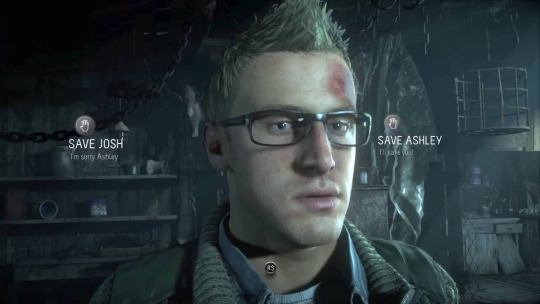
Based on the choices you make, all, some, or none of the games characters will survive... until dawn. Many of the choices have objective right or wrong answers in terms of how to keep the characters alive and happy with each other (unless you’re trying to get them killed which is... fair). The game also has a character info page for each person in the story.

However, none of these stats matter when you are controlling the character, someone with a high honesty score could be made to lie or someone with a low curiosity score could investigate a strange and scary noise. These stats are affected by player choices but only matter when you are not controlling them. The impact from dialogue choices is often high and hard to gauge if you have not played the game before. Having low relationship status between certain characters can result in one of them dying, for example if Chris (second image) and Ashley have a low enough score, Ashley will let Chris die towards the end of the game.

Lastly are several sequences in which you play as an unknown character (whose identity is revealed later in the game) speaking with a therapist. The doctor will at times ask the player explicitly what of three things is the most scary to them, almost immediately after which, the thing you marked as scariest will appear. This is rather ham-handed in terms of scaring the player through dialogue and is wonderfully cheesy if completely ineffectual as after it happens once you can be sure it will happen after it happens again later in the game. Overall as much as I like the game itself, the dialogue system is quite lacking in terms of how it improves the game through player choice.
Moving on.
The other game I want to talk about is Telltale’s Walking Dead the Final Season. I’ve already analyzed the first game earlier and as such would point you to that for specifics. Anyone familiar with Telltale will know more or less how their games work. What makes TFS different is your companion character AJ. Mirroring the bond Clementine and Lee had in the first game, AJ will take in what the player tells him, and what actions he performs on his own based on what you’ve told him impact the game to a much greater degree than they did for Clementine in season one.
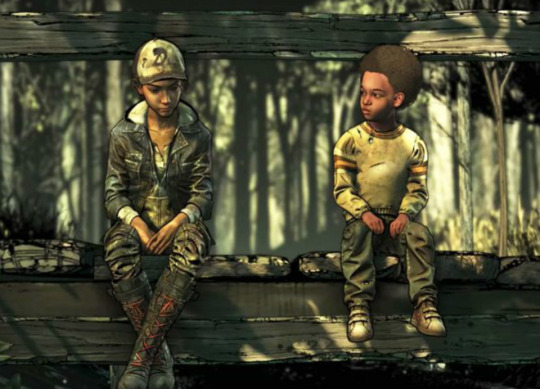
The big thing I want to emphasize in analyzing the Final Season is a sequence right before the end of the final episode, where it appears that Clementine has died (she hasn’t) and the player controls AJ. Unlike the standard interface of showing dialogue options based on what the character will say next like when the player was controlling Clem, Lee, or Javier in any of the previous games, the interface for dialogue options shows the reasoning behind what AJ is about to say.
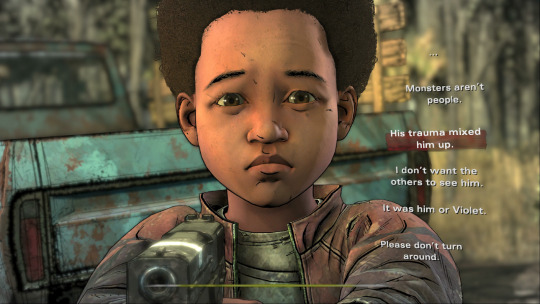
Just the simple change in how the dialogue is displayed shows how AJ’s thinking process is different from Clem’s and those who came before her. The choices he can make are influenced by the lessons the player as Clementine chose to instill in him.

(Clementine dialogue for comparison)
As much as people like to meme on Telltale games, the long reaching effects of the player’s actions, especially in the final game, really allow the player to influence the characters around them and the relationships between them, and their relationships with the main character, if they exist at all.
All in all, Until Dawn and the Walking Dead Final Season are both games I enjoy immensely, though for very different reasons. In TWD TFS it is because I feel a real connection to the characters built from an understanding of them that comes from the ways the game allows me to explore their thoughts and feelings through dialogue. In Until Dawn it’s because the cannibalism murder monster died in normal human clothes and everything has torn/worn off except for the underwear.

(I will never not find this funny)
10 notes
·
View notes
Text
Weekend Top Ten #474
Top Ten Characters Who Came Back from the Dead
I am stunned – stunned! – that I’ve not done this one before. I mean, come on! It’s right there.
So there’s obviously a thematic resonance going on here. This weekend – the weekend you’re meant to be reading this – is famous where I come from because of a story where someone came back from the dead. Unlike other holidays – Christmas, Halloween, the release of a Star War – I’ve actually been a little slow off the mark in making lists that celebrate Easter. I’ve done eggs and bunnies, but incredibly I’ve never done resurrections, which really is the day’s whole deal. I mean, if you get down to brass tacks, it’s kinda the big selling point of the entire religion really. I hesitate to say “USP” because, well, it’s been done elsewhere, but it’s still supposed to be one of the big Christian takeaways (there’s definitely a chain of Christian takeaways in the States, isn’t there?).
Anyway, resurrection. It’s actually more common than you might think. Certainly in terms of comics there are probably more characters who’ve “died and come back” than have never “died” at all. But! And this is where I get pernickety. Most characters who “die” don’t actually die. Take Batman for instance: he’s shot in the face by Darkseid, and then Superman ups and finds his charred corpse, but – shocker! – he’s not actually dead, he was just sent back in time, where he Quantum Leaps his way back to the present day, accumulating enough Omega Energy with each leap that by the time he reaches the present day he’s blow a hole in reality. Or something, I’ve not read that story for quite a few years. Anyway: he wasn’t dead. Neither was Sherlock Holmes, or for that matter Dirty Den. Generally speaking, if someone dies in a story and then reappears, they’re not dead. Not really.
So this list here is supposed to be people who actually died. Now, even here, it’s debatable; I mean, is E.T. dead, or does his body just go into some kind of hibernation? If Optimus Prime’s brainwaves survive, does he ever really die? Is a clone someone coming back to life or not? It’s all a bit wishy-washy really, which kind of makes sense when you’re talking about resurrection. And let’s not get onto the chief resurrector, the Doctor; do they die every time they regenerate? Or is the regeneration itself a way of staving off death? When David Tennant turned into Matt Smith, did the Tennant-Doctor die? “I don’t want to go,” and all that; there’s always a subtle (or not-so-subtle) change in personality. Does that count? Well, for the purposes of this list, I’ve kinda decided it doesn’t. But it’s an interesting discussion to have, if you’re a big old nerd like me.
So yeah: people who have died – properly, I suppose – and then come back to life. That’s the list. No fakery, to mistaken identity, no alternate universe shenanigans; they were dead but they got better (no Chev Chelios either; sorry, Stath stans). No zombies either! Or vampires! They’re not undead; they were dead, and now they’re alive again. That’s the rule. Also I’ve seriously tried to limit comic book characters. And I’m sure there are some big omissions (like, I know there’s one from Game of Thrones that’s not on here, but that’s because I’ve not seen that far into the show yet; I know, I know). But I reckon these are the best at being back.

Optimus Prime (Transformers franchise, from about 1987): OP is the OG when it comes to coming back to life. Dying and then stopping being dead is pretty much his thing. Technically the first time he came back from the dead was in the original animation; famously being offed by Megatron in The Transformers: The Movie (1986), he came back to life a year later. Subsequent media have frequently killed him and brought him back, even in the live-action movies, but I want to talk about the comics. Because the original Marvel run killed off Optimus at a similar time as the cartoon; he’s blown up in slightly contrived circumstances, but his brain is saved on a floppy disk. Two years later he has his body rebuilt and his brain restored and he’s off to the races once more. Then in 1991, when facing down planet-eating mega-bastard Unicron, he sacrifices himself again, but this time his personality has begun to merge with that of his ostensibly-human companion Hi-Q. Hi-Q/Prime is converted/rebuilt into a new body, and he wins the war. So there you go: even in this one sliver of continued continuity – not including off-shoots or spin-offs, let alone other iterations of the overall franchise – Optimus Prime died and came back to life twice. Beat that, Easter.
E.T. (E.T. the Extra-Terrestrial, 1982): not much to say here that we don’t already know from the Book of Spielberg. E.T., doddery little alien magic-man, grows sicker and sicker as he’s stuck on Earth, until in a thrillingly-edited set-piece he seems to expire, human doctors unable to help him. “I know you’re gone,” says best bud Elliot, “because I don’t know what to feel.” But then! His heart glows! His colour returns! And he positively yells, “E.T. phone hooooooome!” – and Elliot’s euphoric laugh is just devastating. The whole sequence – what is it, ten minutes? Fifteen? – is masterful in every way, from the technical to the performative to the emotional. Bloody magic is what it is.
Gandalf (The Lord of the Rings: The Two Towers, 1954): Gandalf the Grey famously leads the Fellowship of the Ring across the Bridge of Khazad-dûm, where he faces off against a Balrog. After a bit of “you shall not pass” and all that, they both fall from the bridge, battling each other on the way down, before both perishing at the bottom. Gandalf, though, is not really Gandalf, but Olórin, one of the Maiar – basically a kind of angel, I guess. He is returned to Earth by the powers-that-be to complete his mission, and is promoted to Gandalf the White, supplanting the corrupt wizard Saruman. This new iteration of Gandalf is a bit more serious and steadfast, although he does retain his fascination with hobbits. Regardless, he gets a terrific death scene and a triumphant resurrection, and how it ties into Tolkien’s wider mythology is interesting.
Superman (DC Comics, 1993): comic book characters die and come back all the time; it’s pretty much a staple of the medium. I guess Jean Grey/Phoenix is probably the most famous, but they’ve all done at some point (even if, like in my Batman example earlier, sometimes they don’t actually die). Anyway, Superman died, very famously, after getting into a tremendous barney with genetically-engineered super-git Doomsday (as famously, and atrociously, depicted in Batman v Superman: Dawn of Justice). The whole “Death of Superman” arc is interesting and entertaining as an example of mid-nineties big-panel EXTREME storytelling: as the issues tick down to the fateful scrap in Metropolis, the number of panels-per-page is reduced until the final issue is basically just full of splash pages. It’s a terrific, exhilarating rumble, really selling the heft of the confrontation. Interestingly, the comic spends a lot of time afterwards dealing with life without Superman, as a raft of imitators/wannabe successors emerge from the woodwork; these include the best-ever Superboy, Conner Kent, and Steel, who’s basically Superman meets Iron Man. Eventually, of course, Superman comes back, his body essentially having been sent to a Kryptonian day spa to recuperate; he emerges clad in black and with a mullet, so death obviously has some lasting repercussions. Overall, it’s a whopping arc with long-term consequences, and whilst it’s easy to make Christ parallels when discussing Superman, this story doesn’t really hew that way (unlike the Snyder-verse which really goes all-in on that plot point, much to the films’ detriment). One of the better aspects is how, even in death, Superman is an inspiration, which in itself has a long trail; leading, eventually, to Batman’s famous withering diss, “the last time you inspired someone was when you where dead.” Anyway, I’ve gone on about this far too long.
Spock (Star Trek III: The Search for Spock, 1984): let’s start by acknowledging just how great Spock’s death is in Wrath of Khan. As a plot point within the film, as a piece of staging and performance, and as a landmark moment in this franchise, it was seminal; a death for the ages (as an aside, it’s crazy to think Star Trek as a whole was only sixteen years old when Spock died; the MCU was eleven when Tony Stark clicked the bucket). Anyway, they built an entire film around how to bring him back, and Spock as we know him is absent for much of it; a presence looming over everything as he rapidly ages, going through his Vulcan super-puberty and everything. It’s actually a rather sombre film as Kirk’s son is killed and the Enterprise blows up; bringing back Spock comes with a very real cost. Trek III is not one of the top-tier films – in the loose trilogy that comprises Khan, Spock, and The Voyage Home it’s certainly the weakest – but it’s still pretty good, often underrated. And, of course, it brings back Spock, which is nice.
Agent Coulson (Marvel’s Agents of S.H.I.E.L.D., 2013): Coulson’s death in Avengers comes as a huge shock, one of the fan-favourite characters being brutally offed in surprising fashion. In a film chock full of super-people, it’s the ordinary guy who buys it tragically. However, did any of us really think he was dead-dead? And so barely a year later he pops back up in the TV series Agents of SHIELD. However, his reincarnation became a recurring plot point; his references to spending time in Tahiti (“It’s a magical place”) becoming increasingly sinister as we come to understand even he doesn’t know how he’s back up and running. The eventual truth – Nick Fury using painful and transformative alien tech to basically bring Coulson back to life – may be a bit underwhelming, but it gave Clark Gregg a lot of meat to chew on dramatically speaking, and it underscored a lot of his character development going forward (especially when he, yes, died again, and then sort-of came back, twice).
Buffy Summers (Buffy the Vampire Slayer, 2001): full disclosure: I never watched Buffy religiously. I think I just missed it at the start and it was only when all my friends were talking about how great it was that I started tuning in more regularly. Weirdly, I think the most I watched it was around the time Buffy died and came back. It’s fascinating, really, and full credit to the show for the way they explored it; in a series full of magic, the afterlife, and the undead, bringing a character back to life isn’t too shocking. Willow, Buffy’s witchy mate, resurrects her with magic; but in an excellent twist, it turns out that she was in Heaven, and is super pissed off to be pulled out of paradise and stuck back on Earth, leading to her feeling depressed and alienated all season. That’s a great hook for bringing a character back, and leads to some meaty stuff for Sarah Michelle Geller to do.
Agent Smith (The Matrix Reloaded, 2003): do you ever feel that The Matrix has slipped from popular culture a little bit? Twenty years ago it was ascendent, rivalling Lord of the Rings for the title of “the new Star Wars”. Everyone was copying it. but now hardly anyone talks about it. probably because it hasn’t had a multimedia shelf-life comprising dozens of games and spin-off shows. Maybe the new film will change that. But I digress; Hugo Weaving is tremendous as Agent Smith in the first film, and is exploded at the end (spoilers) by Keanu Reeves’ Neo. Unsurprisingly – especially as he’s, well, just bits of code – he’s back in the sequel. However, he’s now been corrupted; he becomes, basically, a virus, self-replicating and threatening not just our heroes but the Matrix itself. This builds across two films, as Neo has to fight dozens of Smiths in the famous “Burly Brawl”, before the final conflict in The Matrix Revolutions when it seems everyone in the program has been Smithed. It offers Weaving a lot of scenery to chew on and makes for some great set-piece battles, even if the films themselves are a little disappointing.
Olaf (Frozen II, 2019): let’s not beat around the bush here – Olaf carks it in Frozen II. Okay, maybe Elsa dies; maybe Anna dies in the first film. They’re frozen, right, but I feel like it’s “magic ice” and there’s something going on there. Do they come back to life or were they ever really dead? Anyway, Elsa is effectively “gone” but we get a protracted death scene for the comic relief talking snowman. He literally fades away, slowly dying in Anna’s arms, and melts into a flurry of snow that blows away. People talk about Bambi’s mum all the time, but mark my words; “Olaf’s death” is going to be cited as a major traumatic incident for twenty-year-olds in 2030. His resurrection, truth be told, is slightly less great, Elsa just straight-up bringing him back to life, reminding us that “water has memory” to let us know that it’s the same Olaf and he remembers everything (including, presumably, dying? That’s creepy). And that, to be honest, is where I draw the line; sentient wind and rock monsters I can handle, but we all know homeopathy is bollocks.
Emperor Palpatine (Star Wars: The Rise of Skywalker, 2019): look, I hate this. But let’s deal with it anyway, because I have a funny feeling it’s going to lead to some quite interesting stories being told in spin-off Star Wars fiction. I personally feel quite strongly that Palpatine should have stayed dead. And maybe he did? We are led to believe that the Palpatine we see in Rise is a clone; there are jars of stilted Snokes floating in the background. He’s all knackered and broken, eyes blackened and fingers dropping off; clearly he’s not well. So is he really the same character at all? Is his Sith essence somehow fed into this new body, the way Prime’s mind is downloaded from a floppy disk (“run prime.exe”)? Let’s say it counts, let’s say he’s the same slimy Palps we know and love. He is, at least, a sinister presence, and like I say, the whys and wherefores of how he came to be back is quite interesting. There’s a fascinating story to be told about the rise of Snoke and the seduction of Ben Solo – a more interesting story than anything told in The Rise of Skywalker, for starters. Moff Gideon in The Mandalorian seems to be researching cloning and seeks to extract midichlorians from a Force-sensitive being; are we to conclude that this in service of making a new body for the Emperor? All this – stuff hinted at but not explored in the film itself – is, like I say, interesting if not outright fascinating. And I agree, there is a certain degree of circularity in bringing back the series’ Big Bad for the final instalment. But I still feel, hand on heart, that it undoes a lot of the victory of Return of the Jedi (as did The Force Awakens, if I’m honest), as well as throwing away all the development of Rey and Kylo in The Last Jedi. So: Palpatine is cool, his presence and backstory in Rise of Skywalker is suitably creepy and interesting, but on the whole it’s crap and they shouldn’t have brought him back. The end.
Ten people who definitely died and definitely un-died! What could be more Easter-y? Honourable mention goes to the episode of Red Dwarf where Rimmer changes history and ends up not being a hologram, only to accidentally blow himself up in the final seconds.
5 notes
·
View notes
Text
Why Doc Ock WOULDN’T be a goddam rapist!
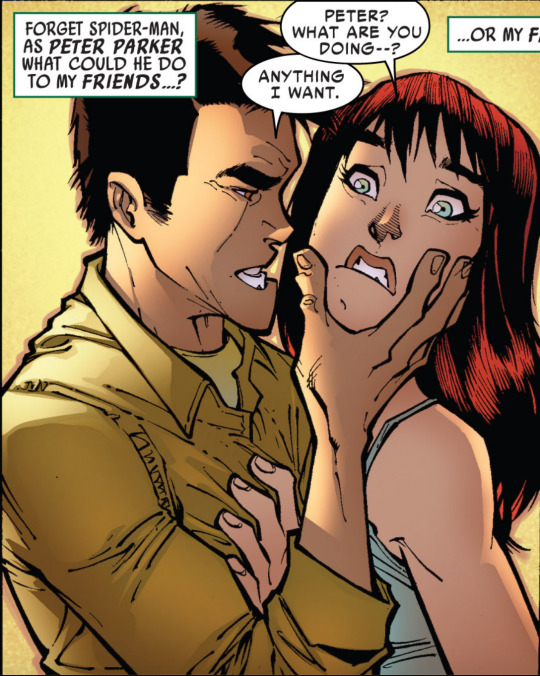
I can’t believe I have to spell that out, let alone outright explain it. But fine, let’s talk about why Otto’s actions in Superior with MJ are way out of whack for his character.
Basically, Doc Ock wouldn’t view using MJ’s feelings for Peter or her history with him as rape. I just don’t think he’s so dumb not to realise that that’s immoral and him taking advantage of her, which he wouldn’t do.
Now, Doc Ock has taken advantage of people, including women, before and even visited violence upon them. But there is a big difference in each of those situations.
Obviously with Betty Brant, Aunt May, Felicia, Mary Jane and certain other women, Otto has kidnapped them or threatened to harm them. But this has been a strictly functionary action on his part. Person A is of value to Person/People B. Otto wants something from Person/People B, therefore he will threaten Person A in order to get it from them. It’s a clinical and functionary decision. He would (and has) done this with male abductees. It’s not a signifier of his feelings towards women as a whole.
By extension in his pettier moments he’s attempted to harm people as a form of revenge. But it has never been strictly gendered. He bears the world malice in general.
Let’s get a bit more specific though.
With Aunt May he was ostensibly being himself (in personality and body) whilst omitting the fact that he was a super villain. However, his main use of her was as a means of escape and furthering his one true love, science. He wasn’t pretending to be someone she knew. He wasn’t putting on the face of someone who looked noticeably younger or different from himself so that could never have been a factor in May’s affections for him. And he wasn’t sleeping with her! Yeah, that’s kind of a critical difference between his relationships with Anna Maria and Aunt May. Hell, it’s highly unlikely he felt legitimate romantic feelings for her. More likely he had a soft spot for her because she reminded him of his own dearly departed mother.
And let’s remember he displayed lingering affection for May even after she ceased being useful to him. He privately praised her kindness.
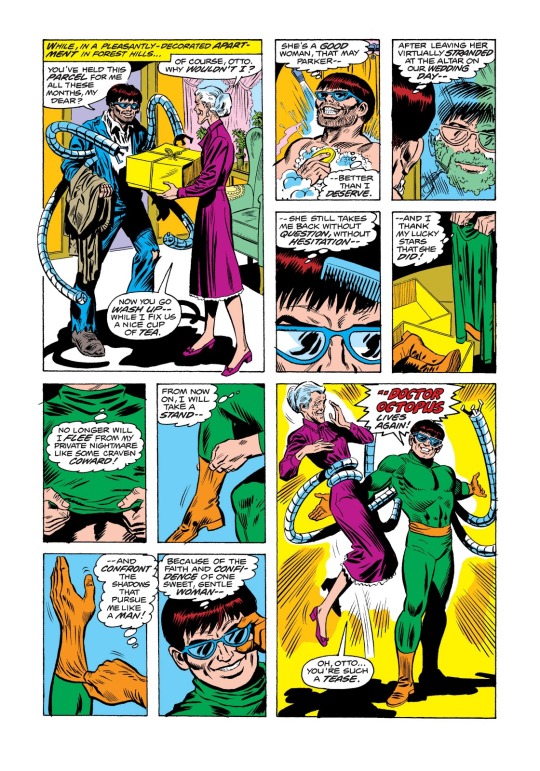
He sought to connect with her at Christmas and chose to leave when he realized he’d spoil the holiday for her.
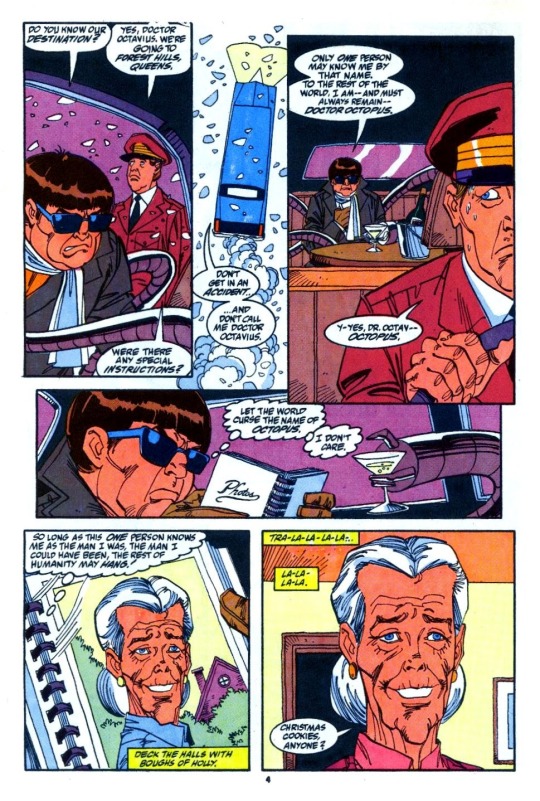
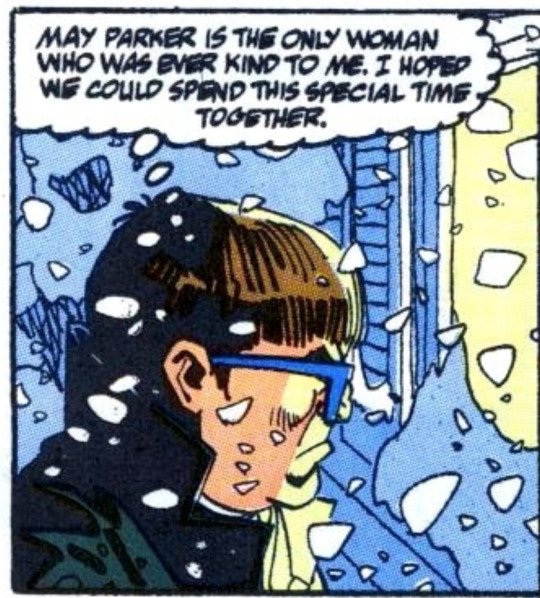
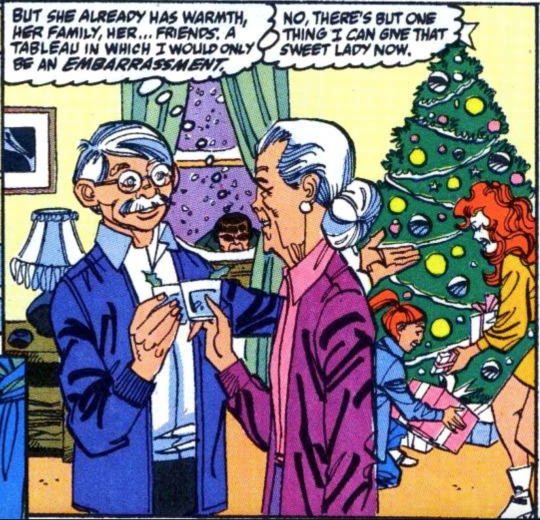

He was upset when he learned she was in a coma and had flowers sent to her.
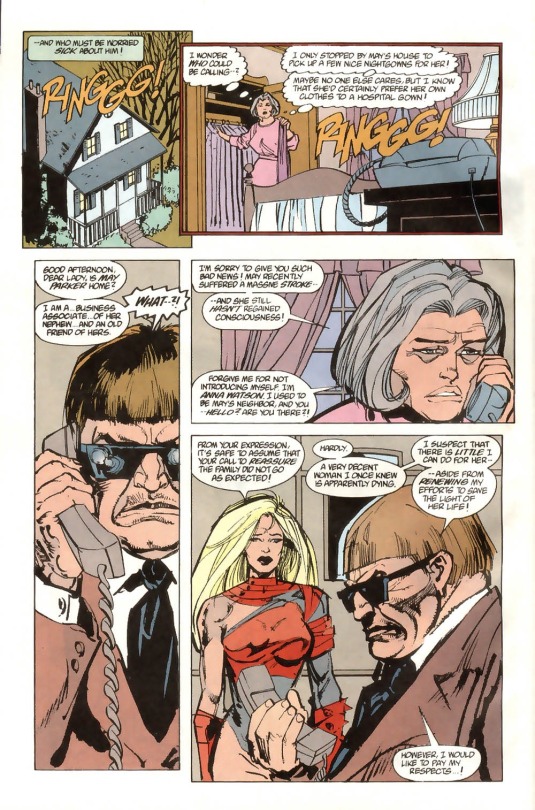

What about Black Cat? He clearly liked her and forced her to remain in his hideout. Later he nearly beat her to death. The difference here is that Otto never forced himself upon her or tried to use deception to get her into bed. His attempts to kill her only occurred after she betrayed and stole from him, going on to team up with his enemy and actively work against him. Again, this wasn’t a gendered thing on his part. He was avenging himself on a specific person for specific slights against him.
We then come to Angelina Brancale, a.k.a. Stunner.
Along with his associate, Carolyn Trainer, Otto planned on creating a virtual reality construct that could interact with the real world. This construct would be of Otto himself and assume his place in order to avoid Otto risking his life. They needed a test subject though, someone who wasn’t going to be missed. Otto selected Angela Brancale who was enamoured with him and would’ve done anything for him. Angela went through months of sometimes painful experiments with the end result being the creation of an interactive avatar of her own.
This was Stunner, the super strong, beautiful, Amazonian companion to Doc Ock. Stunner reflected the obese Angela’s ideal self-image.
Superficially this one might seem like a clear-cut case of exploitation. To a certain extent it absolutely is, but it is more complicated than that. For starters it’s obvious that Angela wanted to become Stunner and enjoyed being her. There is also no indication that Otto strictly speaking forced or tricked her into doing anything. Yes, she was selected because of her affections to him and how she wouldn’t be missed.
But we do not know if she was briefed about the potential ordeal she would have to go through or if she had the option of bowing out at any point. Carolyn Trainer referred to her as a ‘trooper’ for putting up with all the experiments and the pain they entailed. Carolyn is a villainess but it at least implies that Angela had agency in this situation. Angela and Carolyn later teamed up and seemed civil with one another, which further implies that there was no ill-will between then. If Angela had been tricked or lacked agency that’d unlikely be the case.
Additionally there is no evidence to suggest before or during Angela’s transformation into Stunner that Otto was having sex with her or using sex to manipulate her. There isn’t even any evidence that they were having sex after she became Stunner.
As final food for thought, he genuinely loved her when she was Stunner and it seemed that he connected to her because he understood the suffering she endured due to her weight.

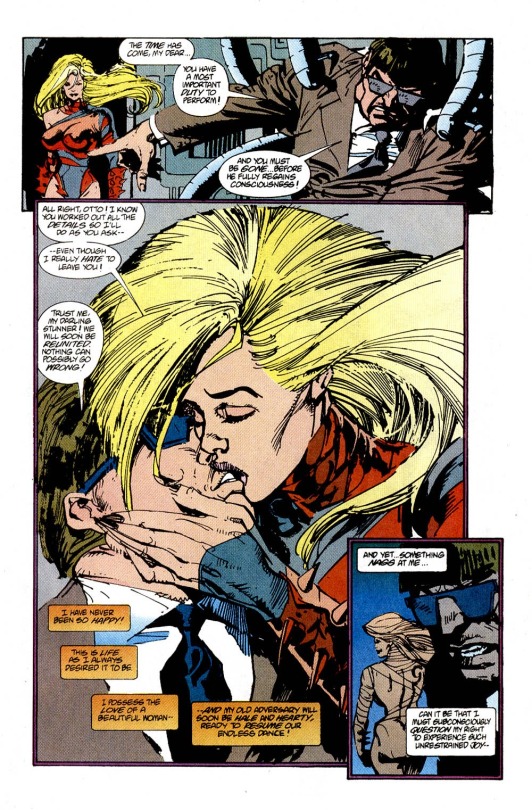
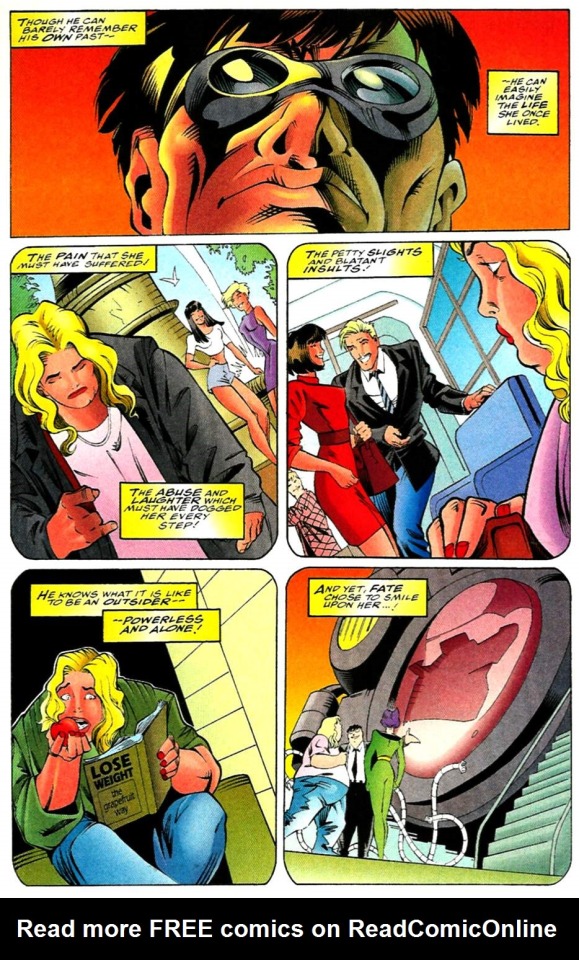
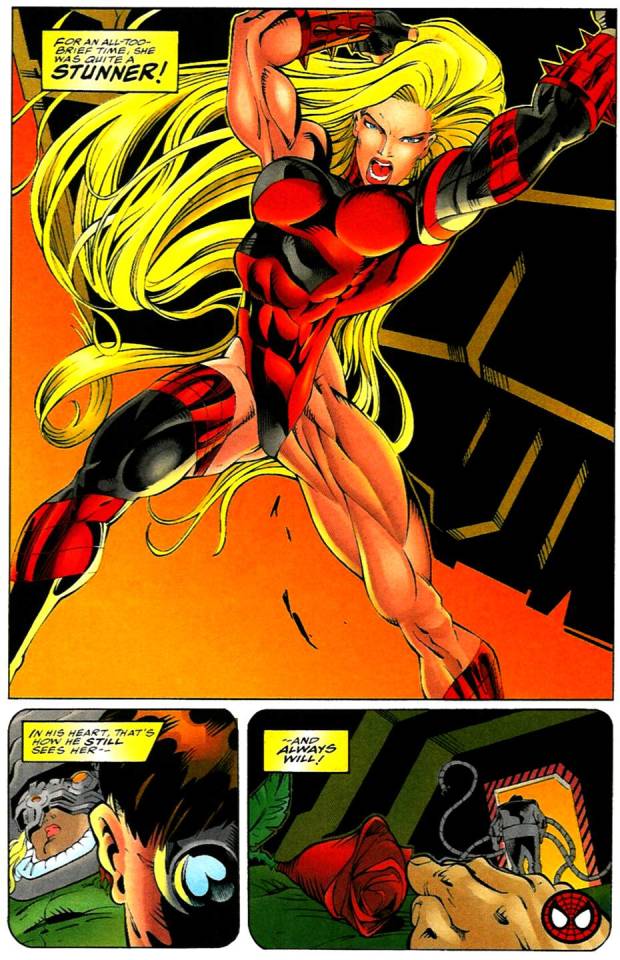
Oh, and of course, Otto wasn’t pretending to be someone or something he wasn’t with Stunner. If anything he was startlingly vulnerable with her.
The only other significant relationship Otto had pre-Superior was with his fiancée. However, there is 0 evidence of him manipulating her during their courtship. He wasn’t even a villain at that point so he’d have had nothing to lie to her about.
Let’s also consider the following regarding Otto’s interactions with women.
This is the man who literally tried to cure AIDs just to save his ex fiancée Mary Alice.
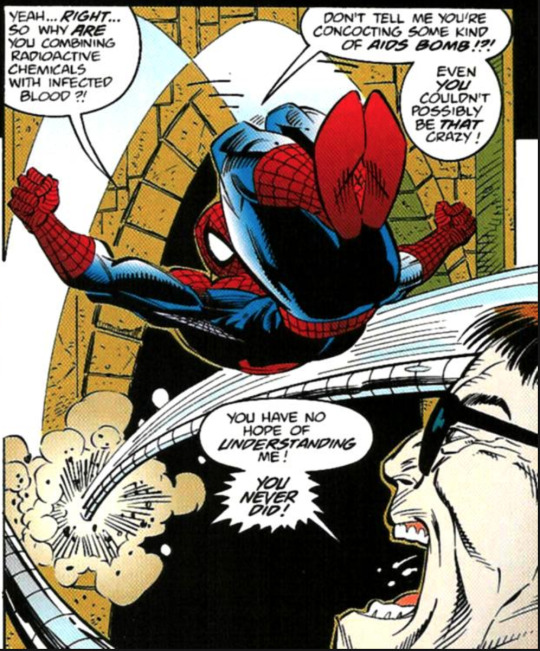
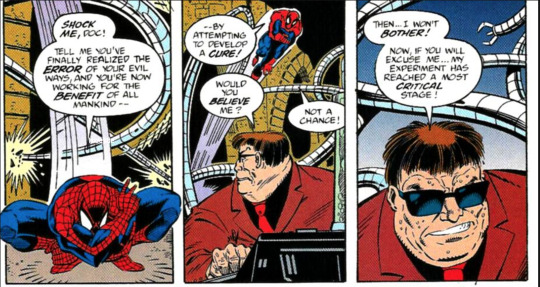
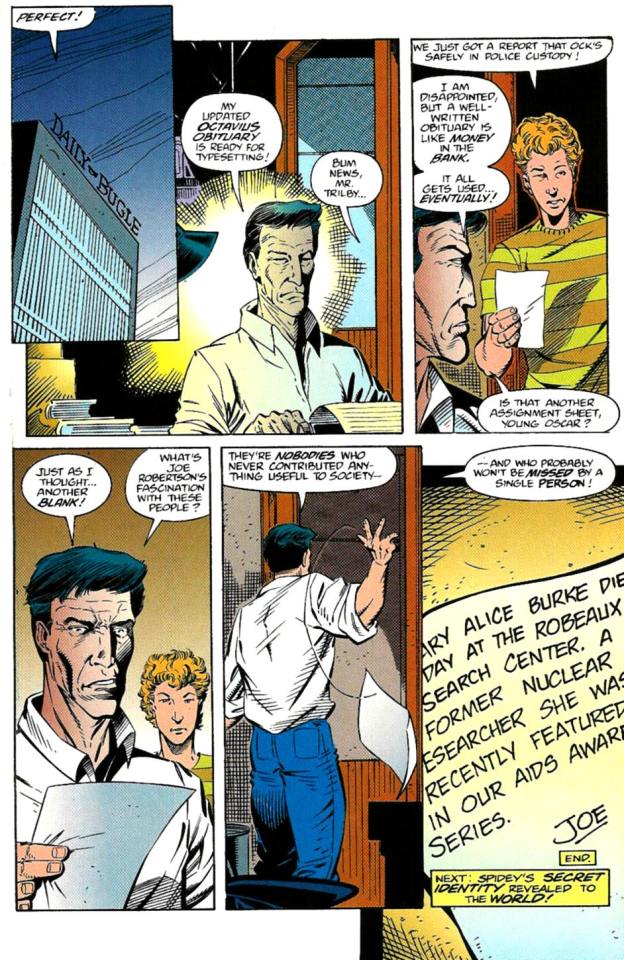
This is the guy who kidnapped Betty Brant and Aunt May to lure out Spider-Man and then offered them tea.
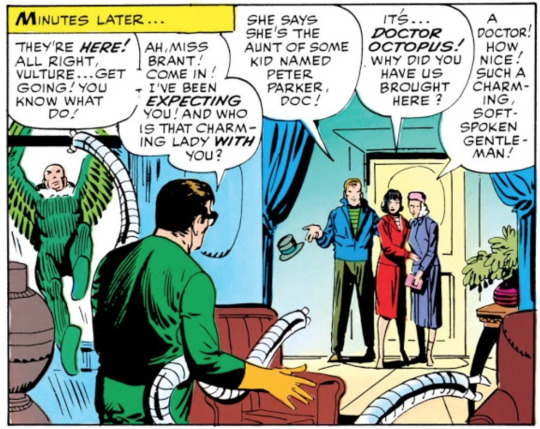

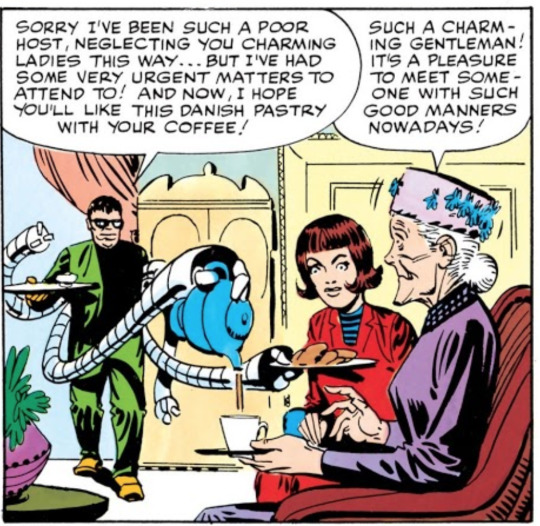
This is the guy who was pleased to see Peter and MJ happy together because it meant his enemy was back to his upbeat and normal self and would thus continue to be the adversary he Doctor Octopus deserved.
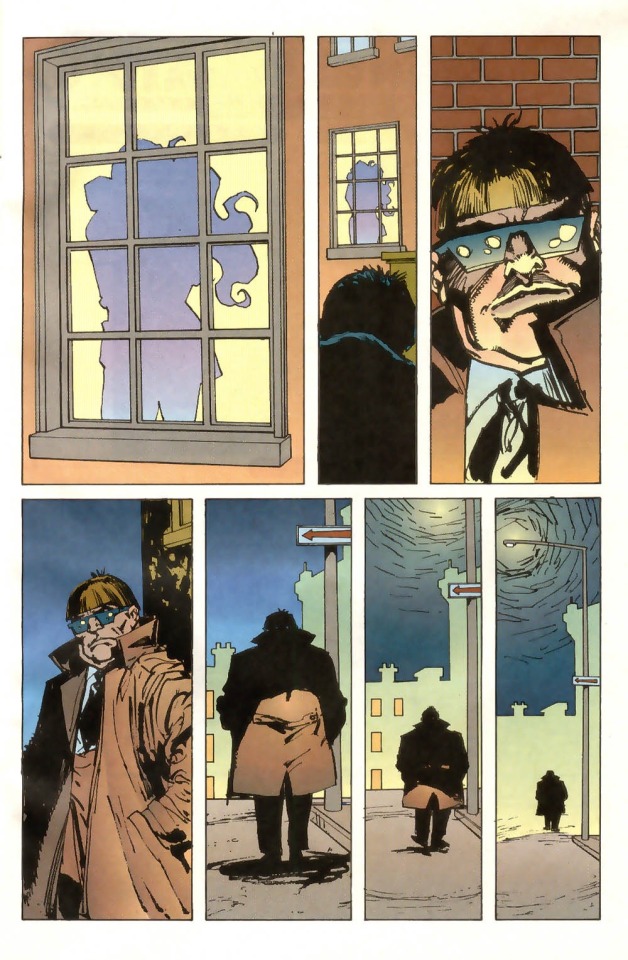
And yet @danslott-blog, Slott-stans, Superior-stans, Spider-Fans who are none of those things and just people in general are willing to accept that this guy would be a rapist?
We are happy to say he really wouldn’t even imagine that sex with MJ or Anna Maria would be morally reprehensible?
Just creatively speaking, not in terms of his character or personality, we’re happy to say THAT guy would play in that ballpark and be depicted this way? Shall we be chill if Carnage was outted as a pedophile while we are at it too?
Of course the counter arguments to the above would be that his attempts to sleep with MJ at least were attempts to prove his superiority over Spider-Man. Or to avenger himself upon him in some way.
First of all the entire concept of Superior is broken. It postulates that Otto is seeking to prove himself better than Spider-Man by becoming an improved version of him. But the problem is that the logic doesn’t line up there.
If the only way he can prove himself better than Spider-Man is by literally becoming him and in turn turning him into Doctor Octopus, that’s tantamount to admitting Spider-Man was always better than himself. The only way he could have won is by becoming the guy he always claimed was inferior to himself.
Second of all in regards to his attempted ‘conquest’ of MJ, sleeping with her wouldn’t even prove his superiority. It’s made clear by issue #2 that he’s merely interested in MJ for sex and no other reason. He accesses Peter’s memories of being intimate with MJ and experiences the sensation of her body that way, being implied to masturbate during this internal screaming. Afterwards, he states he’s got her off his mind and the story clearly conveys that he’s going to turn his attention to other romantic/sexual pursuits.
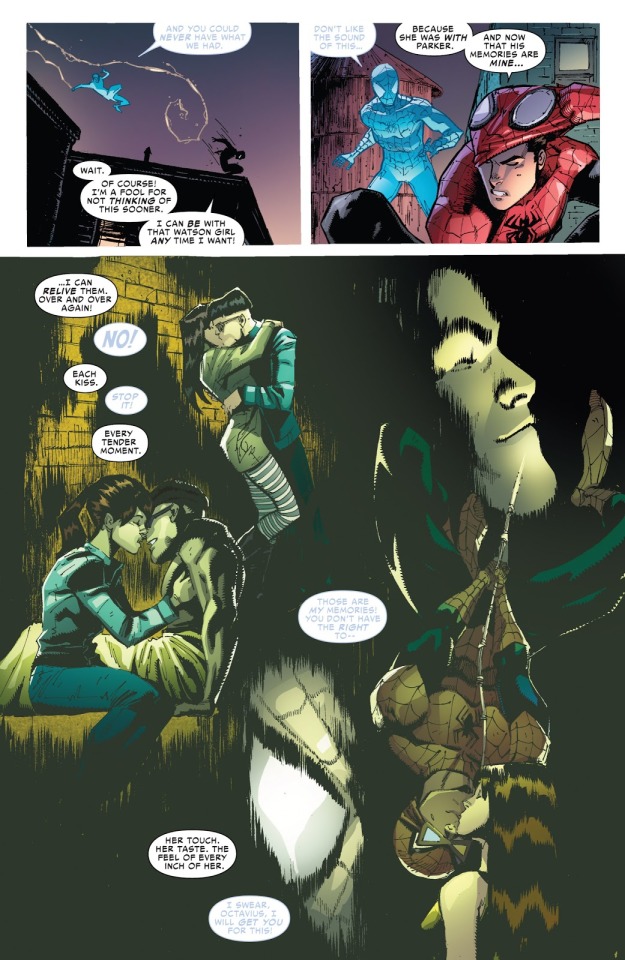
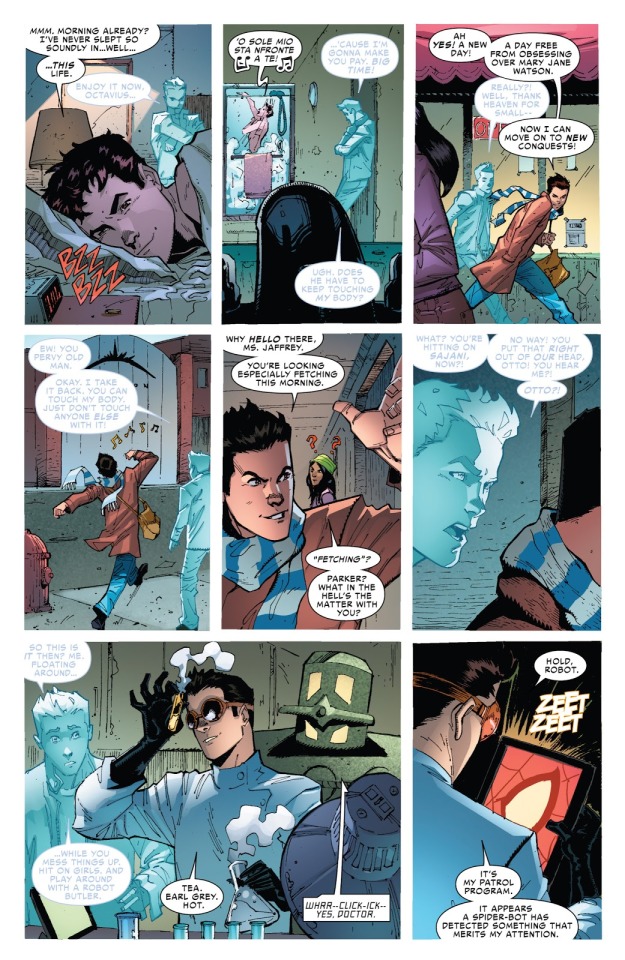
So he only wanted to sleep with MJ and nothing else. Not even that, he just wanted to know the sensation of sleeping with MJ and was content to access Peter’s memories and wank off to that end internal screaming intensifies.
By this logic then he’s proven himself if anything inferior to Peter. And no, I’m not making some kind of judgement about masturbation. My point is if Mary Jane consented to sleep with Peter, but has not done that with Otto, then by definition Peter would have accomplished something Otto would not have. If you remove sex from the equation and just said Otto was trying to ‘win’ a mere kiss from Mary Jane and she didn’t do that, but she had done so for Peter, then by definition Otto would’ve failed where Peter has succeeded.
The fact that he was content to move on from her by simply browsing Peter’s memories (from his POV Peter’s ‘accomplishments’ if you will) means that he was never trying to sleep with MJ to prove his superiority in the first place. He was just a horny creep. Nothing more.
Not to mention, he is aware Peter had slept with Mary Jane and done so on multiple occasions. How would even regularly sleeping with her prove himself superior? It’s just sex. He’d know that. He’s both an adult and an incredible clinical person who clearly knows how to romance a woman. One of his biggest regrets in life was giving up his fiancée.
So Otto would be aware that sex would be no proof of his superiority and it wouldn’t mean much in the grand scheme of things. What would really prove himself superior would be having and maintaining a relationship with MJ that was either longer lasting or over all better than the one she held with Peter.
But he’s not interested in that because he moves on after wanking off. And he is trading off of trickery to even get his foot in the door in the first place. This isn’t a case of him being a younger or more attractive man and using his own charms and traits to court her.
He is only got as far as he did because he looks like someone she knows, because she believes he is that person, because he’s using Peter’s memories to pander to what she likes (like her favourite movie) and circumvent what he knows will turn her off. Hell in ASM #698 he jumps immediately into a relationship with her but it’s obvious to both him and MJ that the emotional groundwork for that had been laid in preceding months.
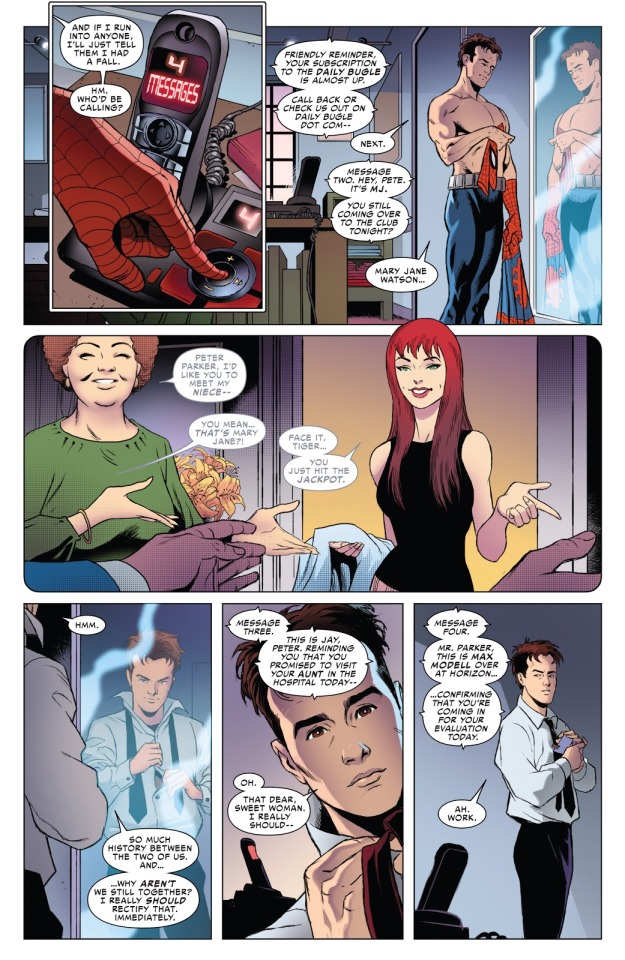
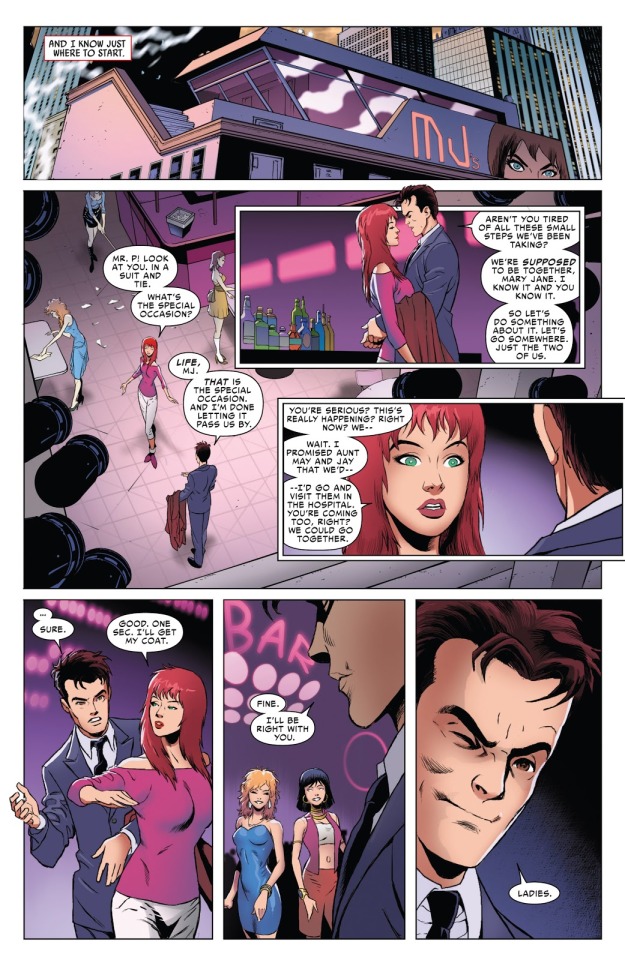
So even if Otto was enough of a slimeball to not consider this rape, a man that intelligent and egotistical would still recognize that sex wouldn’t be a badge of superiority on his part.
If anything his own romantic life would be something more worthy of pride.
Let’s say we accept for the moment that Otto conforms to stereotypical standards of attractiveness. Well then what would be more impressive from your POV?
a) Wooing a stunning actress/supermodel when she believes you are someone else she knows, someone much in their 20s or early 30s, very in shape and at least fairly handsome
Or
b) Being a rotund, arguably ugly (but at least typically unattractive) middle aged man and wooing a relatively attractive woman your age, a younger more attractive woman who was immediately smitten by you and a younger woman smitten by you that your own genius transformed into a veritable vision of stunning beauty?*
Yeah, obviously the latter right?
Also, the idea that sex with MJ would constitute a form of revenge is highly out of character for Otto.
That is more of a Norman Osborn tactic. Otto actively despises Norman’s ideology, as elaborated upon in Superior Team-Up #11-12. In those issues Otto and Norman endeavour to work together in spite of a philosophical disagreement. Otto feels that Spider-Man should be defeated through science whereas Norman feels they should attack his soul.
To prove the point Norman infects Otto’s old fiancee Mary Alice with a deadly virus (read: AIDs, this was the 1990s) so Otto will understand the torment they could inflict upon Spider-Man.
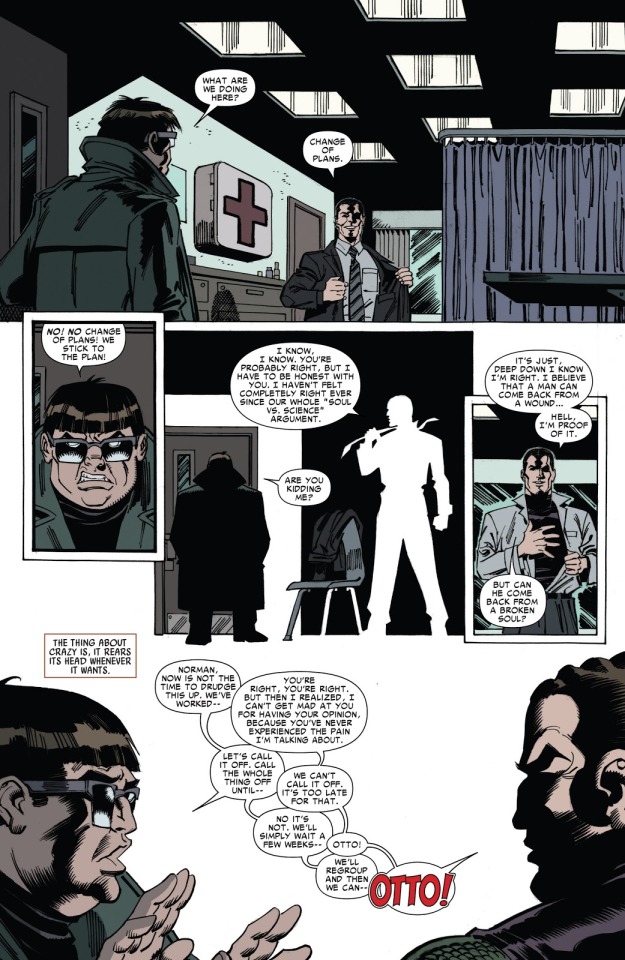
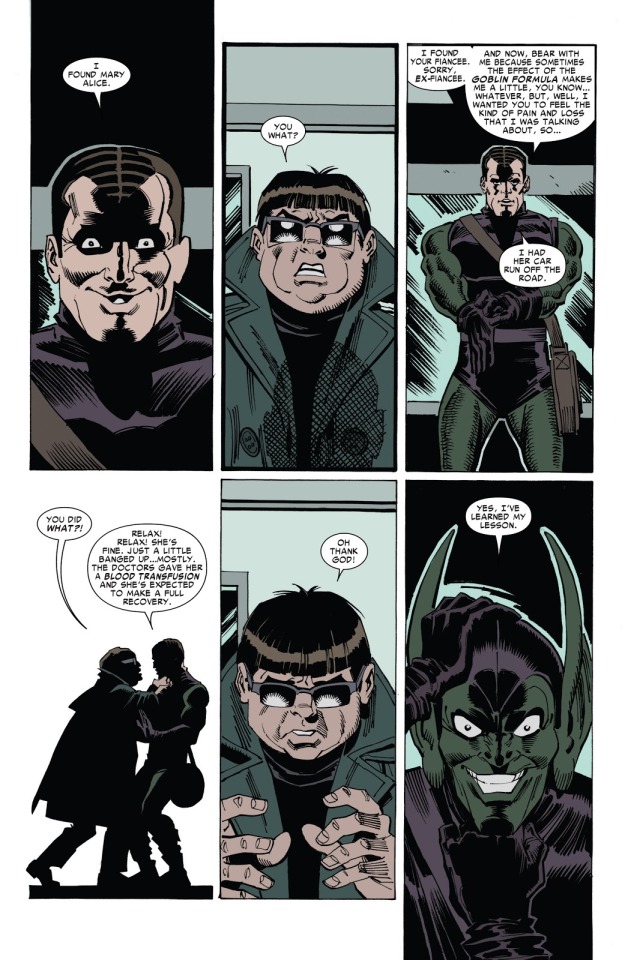
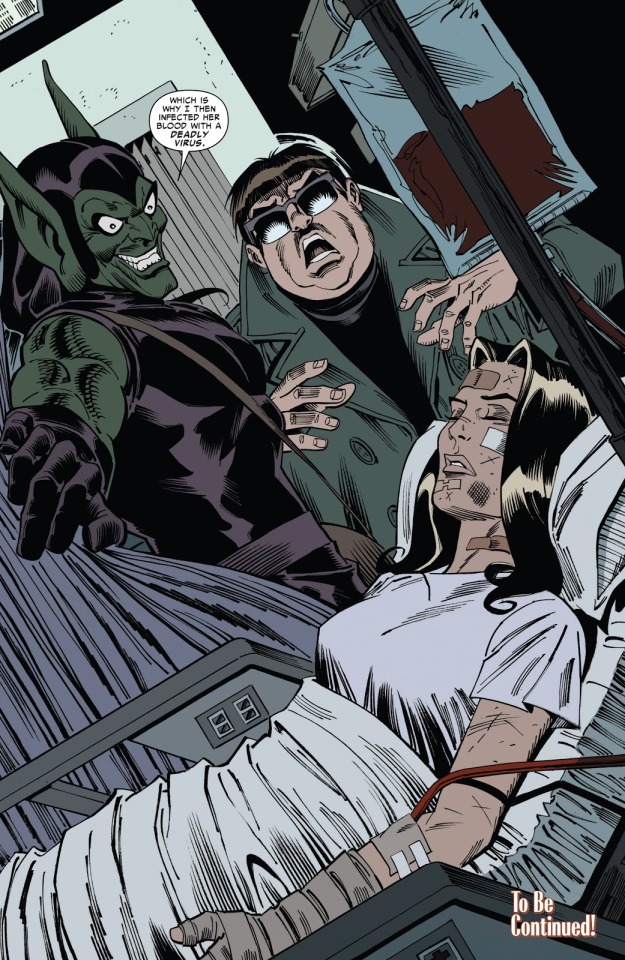
Initially Otto seeks bloody revenge upon Norman. However, he defies Norman by instead reaffirming his original belief. He sought to defeat Spider-Man through science and thus prove his philosophy superior to Norman’s.
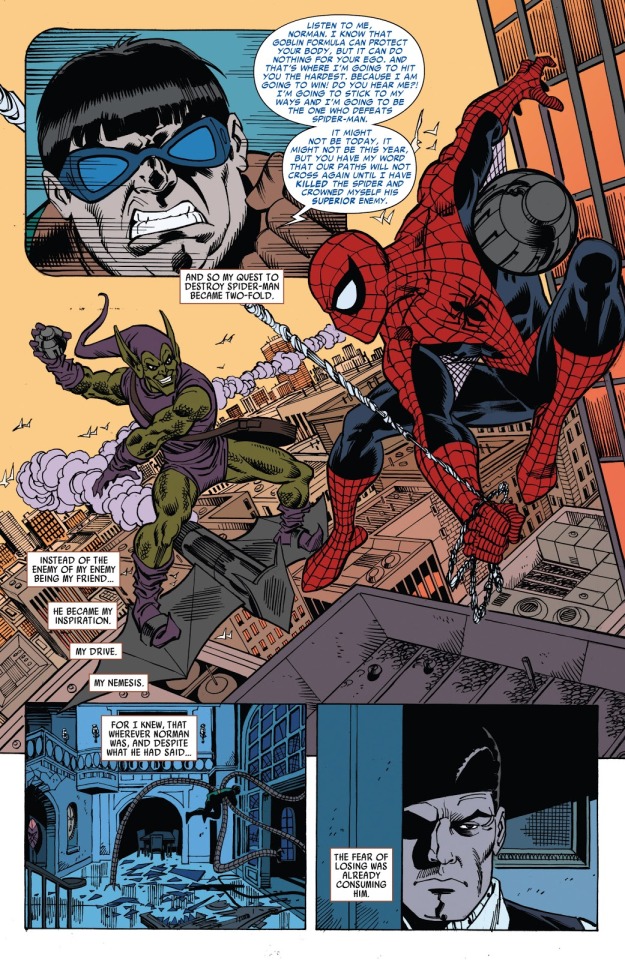
Okay. That wasn’t published at the time of Superior #2 so let’s say we ignore it.
Even doing that, Otto had been defined for decades as someone who wouldn’t go in for such spiteful attacks on his enemies.
In Spec #221 (part of the ‘Web of Death’ storyline) Peter himself states he doesn’t believe Otto will target his loved ones, even though he just learned his secret identity.

Hold them hostage to lure him out? Okay.
Maim or kill them for revenge? He’s just not that sort of guy.
Or at least he wasn’t until this creepy ass scene from ASM #700. Among other things, he specifically refers to the prospect of sex with MJ as ‘another victory for the Master Planner’.
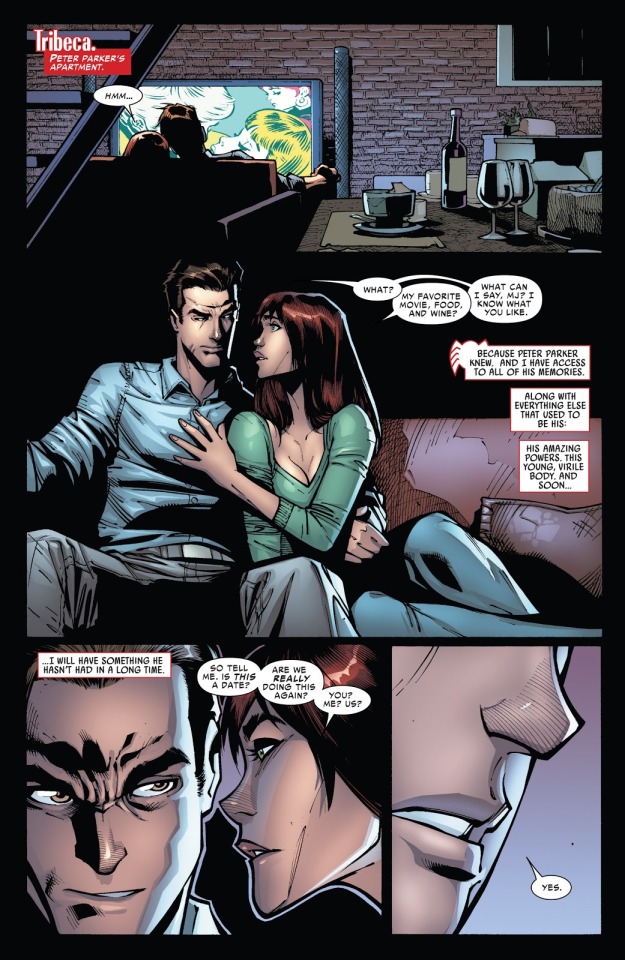
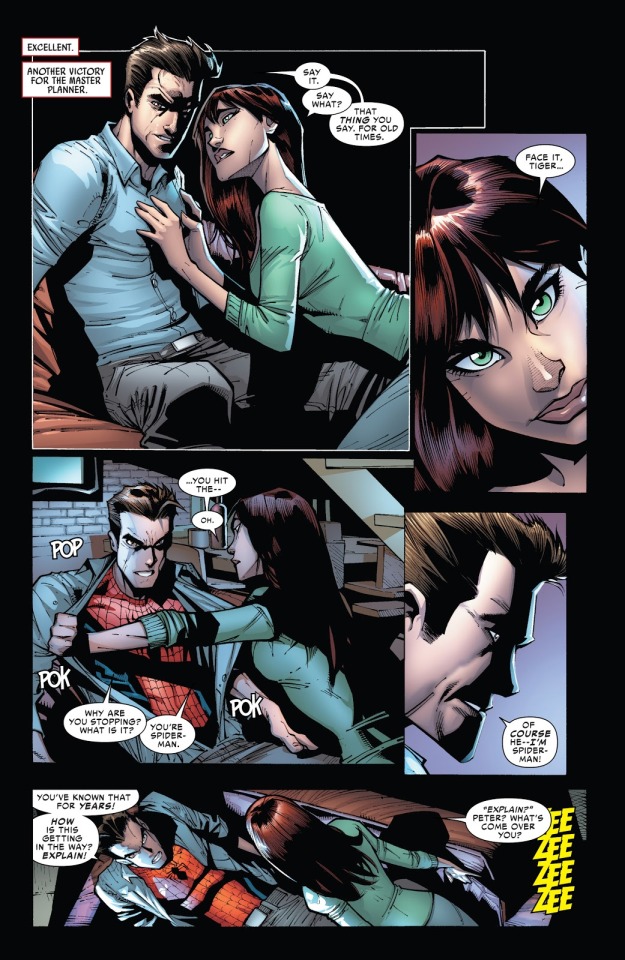
Let’s try coming at this from a different angle then.
If Otto believes himself to be Peter Parker because he inhabits his body, perhaps he doesn’t regard sleeping with MJ as unethical at all. She is giving her consent to Peter Parker and he is Peter Parker now.
That’s a rather huge stretch to make about the character considering he actively tried to hide the fact that he was secretly Otto Octavius from so many people in Superior.
Moreover, during ‘Dying Wish’ it was clear (due to mischaracterization) that Otto was doing what he was doing for revenge, that was even partially why he wanted to sleep with MJ (see above). He wanted to ‘have something Peter hadn’t had in a while’ (...ugh...). Furthermore in ASM #700 he was bombarded with Peter’s morality (or some shit like that, I don’t know...) and this convinced him to be a good guy.
But that was seemingly thrown out the window when Superior started as he seemed to just be a bad guy who battled crime to again be superior to Spider-Man. He wasn’t honouring his fallen comrade and didn’t have his moral compass as seemed to be implied in ASM #700 because if he did why was he still trying to rape Mary Jane?
Shit in fact in Avenging Spider-Man #15.1 he’s LAUGHING at Peter’s demise and the fact that he’s gotten away with this. He refers to Spider-Man in the third person as he does this. This event also happened literally the day after ASM #700, so it was less than 24 hours since he had been blasted with Peter Parker’s memories and resolved to be a ‘hero’.
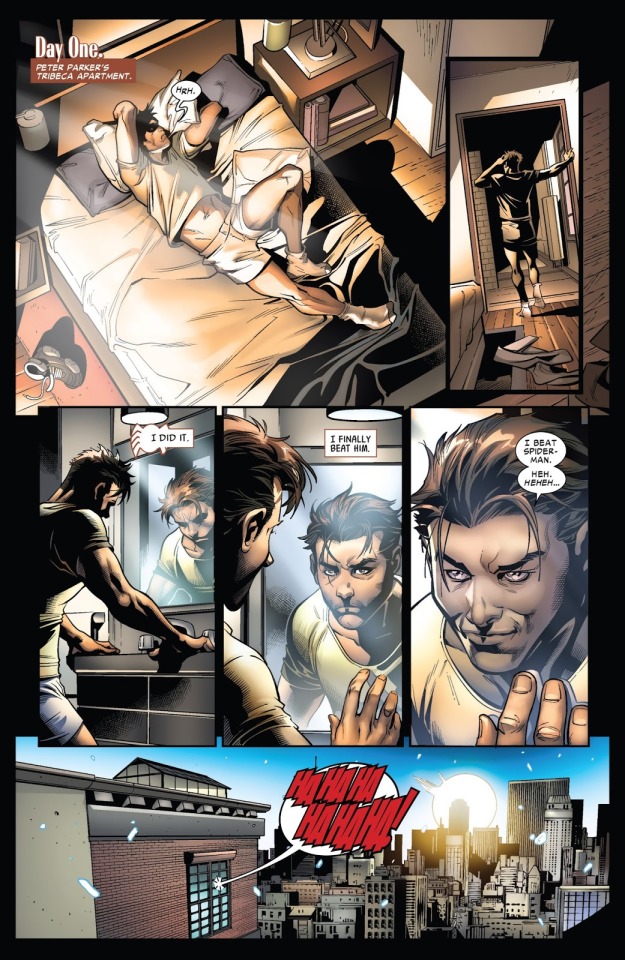
Not to mention in various issues he clearly refers to himself and Peter as separate entities. In Avenging Spider-Man #15.1 his thoughts drifted to MJ and he called Peter a fool.
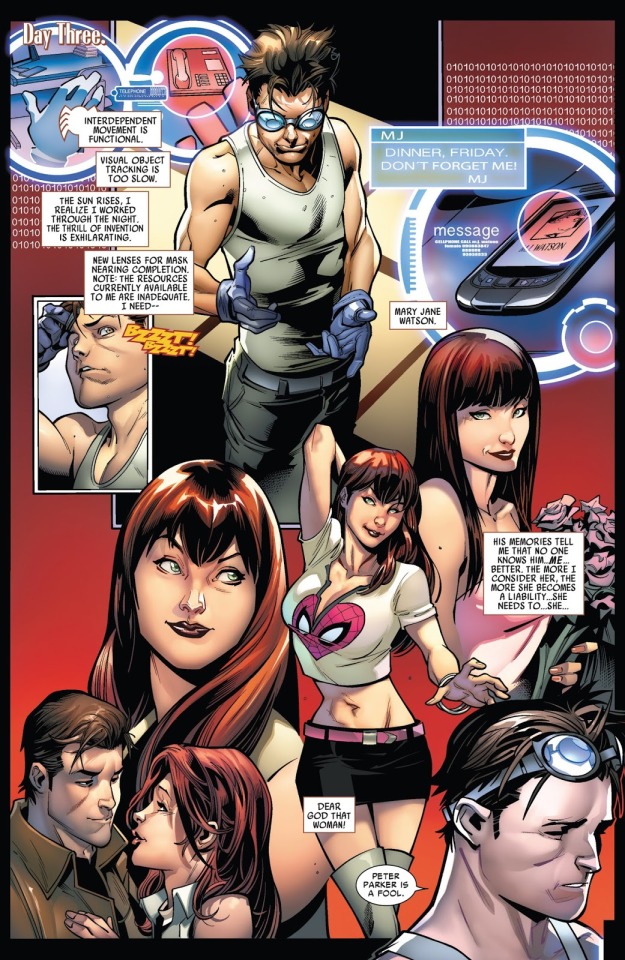
He does the same in Superior #2 where he refers to Peter in the third person.
His dialogue utilizes quotation marks when using Peter’s full name; “Peter Parker”. This demarks how he is making a distinction between himself and the real Peter Parker. He is acknowledging himself as a pretender.

In Superior #4 internally reprimanded ‘Parker’ for never finishing Grad School. At the same time he negatively compared Peter’s efforts to when he received his own doctorate, referring to himself as ‘I’.
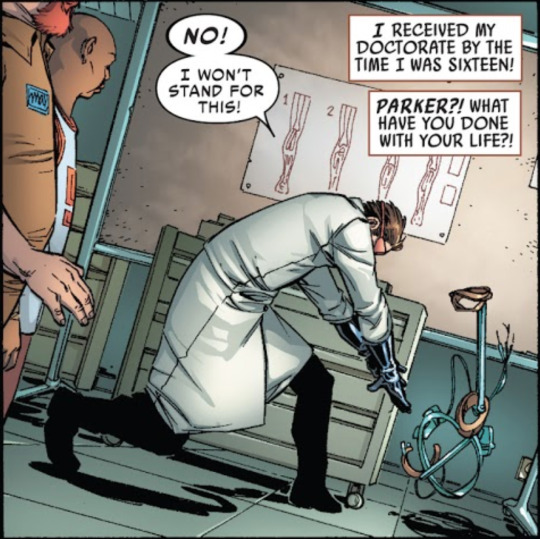
In Superior #10 he referred to Peter as a separate person, referencing how he expunged him from his mind in the prior issue.

He also chastises Peter as a ‘reactionary fool’ who allowed ‘his’ enemies to make the first move. Where ‘Parker’ dealt with symptoms he plans on dealing with the disease. He even refers to himself by name as Otto Octavius.

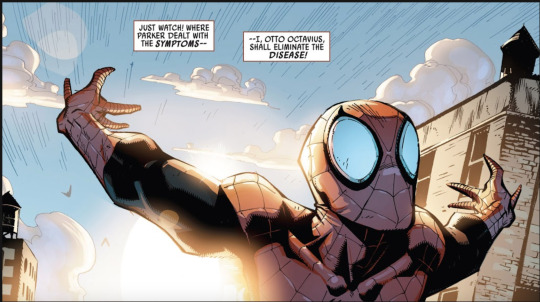
When he runs into MJ he wonders what ‘Parker’ would say and gripes that fooling her was easier before he purged ‘his’ (meaning Peter’s) memories.

In Superior #21 he refers to his “…life as ‘Peter Parker’…”. He’s clearly making a distinction between the real Peter Parker and himself as a pretender.
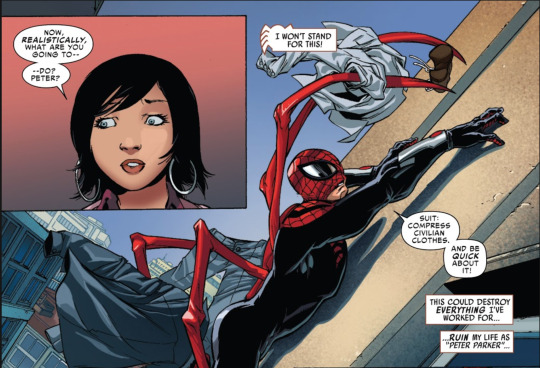
In the same issue, when Stunner blames him as Spidey for murdering Doc Ock, it takes Otto a moment to register what she is talking about. He then attempts to reveal the truth to her. He starts by saying “I’m actually…”
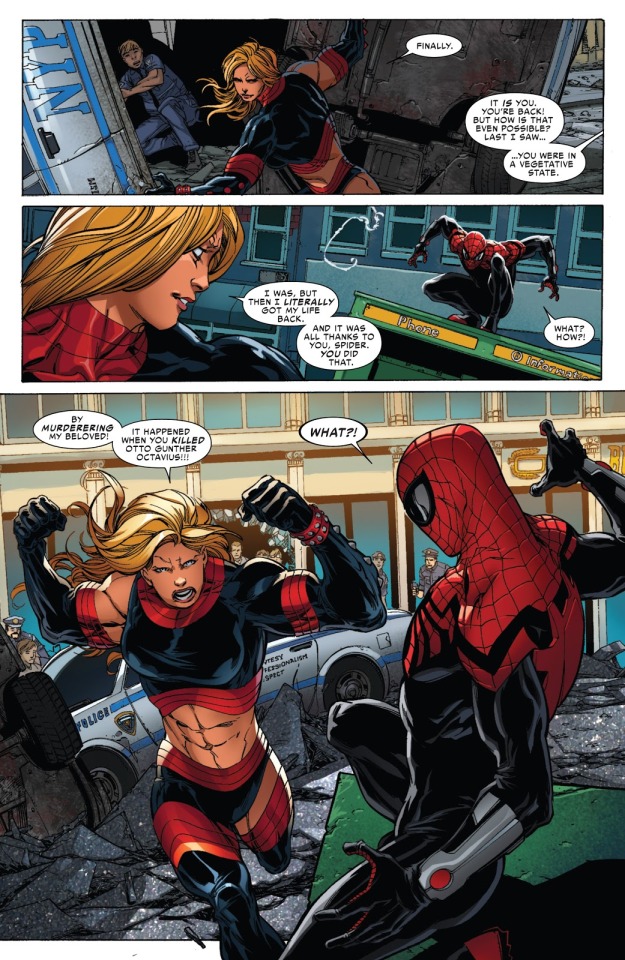
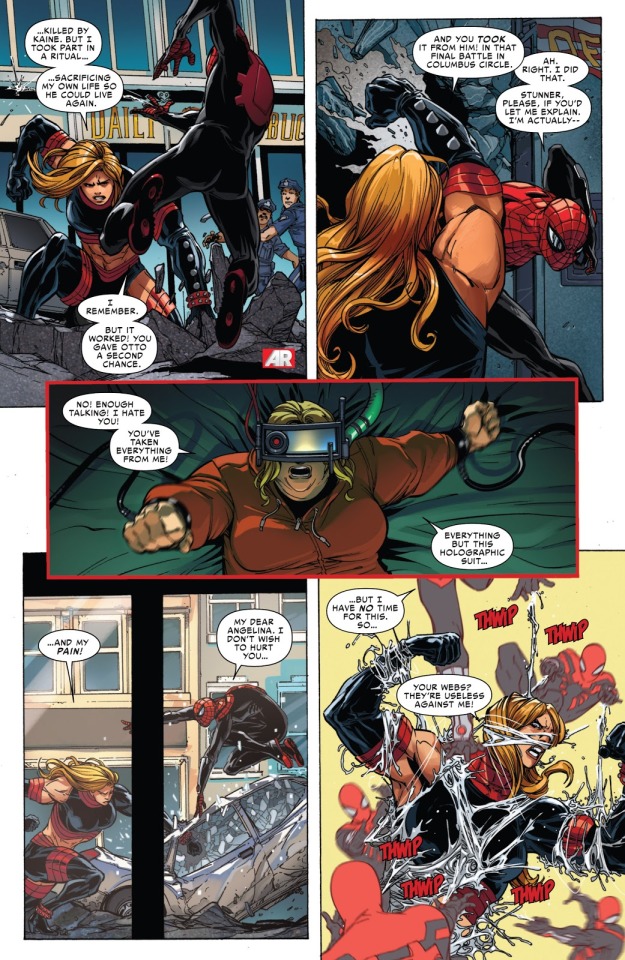
These moments when taken with all his other unethical actions in Superior also undermine another defence of Otto’s raptastic efforts in Superior.
This is the idea that ‘he’s changed’ in the interim leading into Superior. Now his attitude towards women and morality is different so it’s believable for him to act this way.
Let’s ignore how again, Superior Team-Up disproves this. Otto’s actions clearly showcase that he in fact has not changed as a person. He’s not grown or evolved. He just happens to be crime fighting now as a form of ego boosting and to prove himself better than Peter.
More importantly if Otto was going to so noticeably change in his attitudes to women then we should have seen that happen!
You can’t just jump forward and tell readers to just accept a character has had a change of heart and is now open to the idea of fucking rape!
How, when and WHY did he change to be this drastically different predatory creature? This wasn’t like how Aunt May or Norman were different when the former was resurrected and the latter was written by JMS. Those were extrapolations of aspects of those characters that were already there. This was essentially something wholesale new and starkly against how he was previously defined. Its akin to what Slott did to Ben Reilly in ‘Clone Conspiracy’ or to Ashley Kafka when he had her declare someone irredeemable (even though she believed Carnage was redeemable).
Finally, lets pretend to ignore all of the above.
Let’s say Otto being a rapist would be entirely believable.
That doesn’t mean you should actually DO it!
Doc Ock is a classic goofy mad scientist archetypical villain, even if he was (allegedly) on a redemption tour in this story. Adding something so creepy, disturbing and vile from the real world to his character taints his character. It took him to a bad place where he was peers with the likes of Purple Man and Doctor Light. It makes him practically irredeemable. Maybe a skilled writer on a MAX book could pull off a redemption arc for a rapist or attempted rapist. But not only is Slott not that skilled, but he’s played it for comedy!
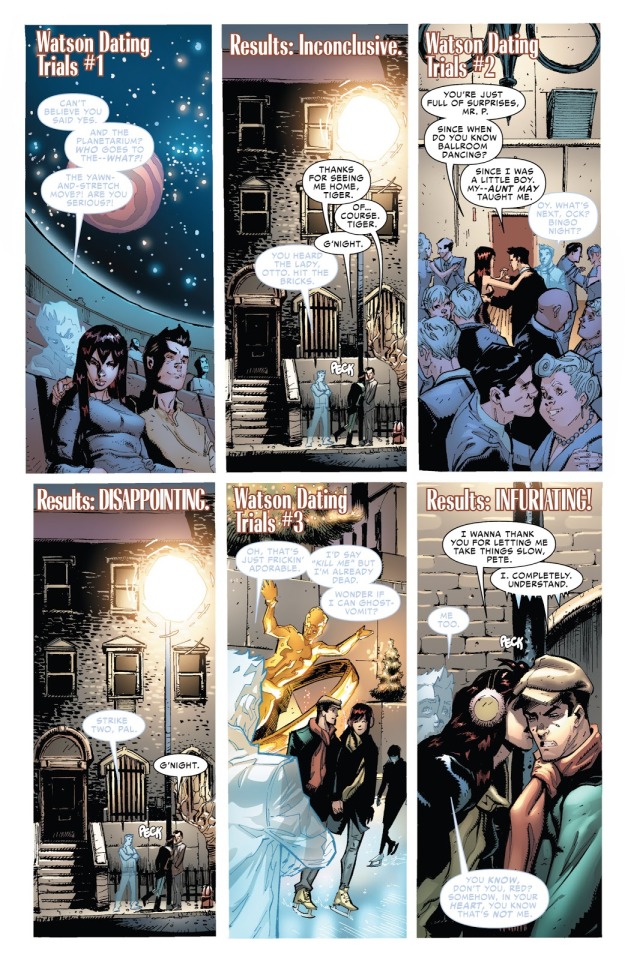
Frankly, unless you have seriously done your research on this topic you shouldn’t even be touching it.
To touch it so casually for humour is seriously FUCKED UP!
I don’t even want this topic really raised in mainline Spider-Man titles period personally but to do it like this?
*gagging noises*
Not to mention it was entirely unnecessary.
Otto had attempted to mass murder half the planet in an arc just the year before Superior. Surely that is enough fuel for a redemption story, you don’t need to make him a rapist/attempted rapist on top of that.
But no. Gotta milk that crass shock value for all it is worth!
Shit, the topic with MJ was handwaved within one issue!
Fuck Slott.
Fuck Superior.
Fuck everyone who defended this disgusting garbage!
*This also dismantles the myopic idea that an older man who looked like Otto would be jumping at the chance to have sex. That’s another defence I’ve heard. The fact is multiple women found Otto attractive as he was.
#Superior Spider-Man#The Superior Spider-Man#otto octavius#Doc Ock#Doctor Octopus#Spider-Man#Peter Parker#Dan Slott#mjwatsonedit#mary jane watson#Mary Jane Watson Parker#MJ Watson#Carolyn Trainer#Lady Octopus#Lady Ock
92 notes
·
View notes
Text
Tony Stark and the Messianic Archetype in Avengers: Endgame
* * * * * S P O I L E R S ahead for Avengers: Endgame * * * * *
+
.
+
.
+
.

From a purely analytical standpoint, I don’t have anything against Tony’s character arc in Endgame culminating with his death. His last moments in the heat of battle weren’t rushed, poorly written, or unearned. If Tony Stark was going to die on screen, of course he’d do it like a goddamn badass—and he did.
At this point Marvel is telling a single story to millions upon millions of people and there’s no way they can craft a narrative to suit every single person. When I say Tony's death didn’t work for me, I do so knowing that Marvel wasn’t writing the story for me anyway. And I'm not trying to disparage the creative team's efforts and storytelling choices. They made a call. I don’t agree it was the right one.
For me, Tony’s death traps him inside a Messianic Archetype that doesn’t elevate his character in a wholly satisfying way and doesn’t fit the themes of the established, team-centric universe. In this essay I will…
…actually write a fucking 4000-word essay, so buckle up and read on if you’re in for the ride.
What Is the Messianic Archetype?

The Messianic Archetype is a messiah trope. It’s exactly what it sounds like—one person (usually (but not always) white, usually (but not always) male) who sacrifices themselves for the greater good.
Here’s how TV Tropes puts it:
In media, the Messianic Archetype is a character whose role in the story (but not necessarily personality) echoes that of Christ. They are portrayed as a savior, whether the thing they are saving is a person, a lot of people or the whole of humanity. They endure a sizable sacrifice as the means of bringing that salvation about for others, a fate they do not deserve up to and including death or a Fate Worse than Death. Other elements may be mixed and matched as required but the Messianic Archetype will include one or more of the following:
- The Chosen One. - True Companions who follow him. - Betrayal by one of those followers. - Persecution by nonbelievers. - Crucified Hero Shot (or other parallels to the Passion Play). - Figurative or literal resurrection. - A Second Coming. - The initials JC.
Some examples of Messianic Archetypes in popular narratives are: Gandalf in Lord of the Rings, Spock in Star Trek: The Wrath of Khan (or Kirk in Star Trek: Into Darkness), Harry Potter in The Deathly Hallows, Superman in Batman vs Superman, or Neo in the Matrix trilogy. The Doctor in Doctor Who is frequently and repeatedly presented as a messiah figure. Multiple incarnations of Sherlock also follow suit in multiple imaginings of the the Reichenbach Falls scenario. (I won’t go into details with any of these characters. I trust the Messianic Archetypes here are obvious to anyone familiar with these stories.)
In the Marvel Cinematic Universe itself, we see Messianic Archetypes popping up all over the place—like daisies! Steve plays this part when he sacrifices himself in The First Avenger to stop Red Skull's plan to bomb several major American cities. His time in the ice is a kind of death from which he is subsequently “resurrected” in modern day New York. To a lesser extent, he also offers himself up as a sacrifice to save Bucky in The Winter Soldier.
T’Challa follows this pattern in Black Panther when he’s betrayed by W’Kabi, defeated by Killmonger, and subsequently resurrected within the safety of M’Baku’s tribe.
In the first Thor movie, Thor is betrayed by Loki, sacrifices himself to the Destroyer to protect his human friends, and he comes back from near-death with the return of Mjölnir, having proven himself worthy of the hammer.
Carol Danvers destroys Mar-Vell’s engine in Captain Marvel to keep enemies from getting their hands on tech that could harm millions of innocent people. Her human life symbolically ends in the subsequent explosion, and she’s effectively reborn with superpowers.
Pepper Potts is betrayed by her former colleague Killian in Iron Man 3, selected as his “chosen one” for the Extremis injection, and she dies and is reborn from fire.
Yondu in Guardians of the Galaxy Volume 2—
Well, I could go on for a long time, but... you get the idea.
The Messianic Archetype isn’t particularly new to popular media, let alone the MCU.
This trope is deeply, almost subconsciously, woven into the fabric of popular western storytelling. There's nothing inherently wrong with that. Tropes are tropes for a reason—they speak to us on a cultural and instinctual level. We want to hear these stories over and over, replay them in new ways and look at them from different angles precisely because there is something meaningful in the narrative.
And Tony Stark's narrative is no exception. His repeated acts of self-sacrifice fit into the Messianic Archetype very, very well.
+
.
Proof That Tony Stark Has a Heart

The MCU kicked off in 2008 with the first Iron Man movie and Tony Stark has ostensibly been the main character of the franchise from the beginning.
The Iron Man movies establish early on that Tony has a savior complex to match the size of his ego. Our genius playboy billionaire philanthropist is a deeply flawed hero who started out his career as a maker of WMDs. He was widely known as “The Merchant of Death” before he saw the error of his ways. Tony understands he has done many Bad Things and he must atone for those Bad Things—with his life, if necessary.

“I shouldn’t be alive, unless it was for a reason. ... I finally know what I have to do and I know in my heart that it’s right.” —Tony Stark, Iron Man
The first Iron Man movie climaxes with Tony ordering Pepper to blow the Arc Reactor to stop Stane’s rampage, even though Tony might perish in the process. In Iron Man 2, Tony is actively dying from palladium poisoning, but he faces down Vanko (sans Iron Man suit) on the speedway of the Monaco Historic Grand Prix. In the first Avengers movie, we see Tony put his life on the line to get a nuclear weapon out of New York.
This is a repeated pattern for Tony, and like an addict, it’s one he struggles to break. Over and over Tony flings himself into the fray, believing he’s the one who makes the difference—he’s the willing sacrifice whose blood saves the world.
Tony selects himself to be “the chosen one” because he sees himself as the one at fault for bringing evil into the world.
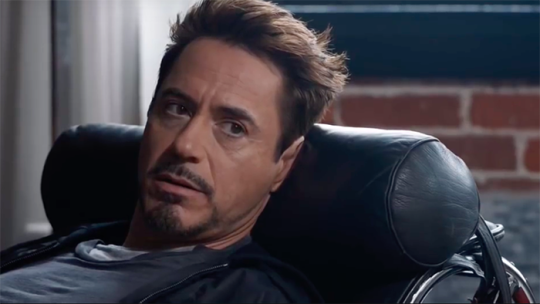
“We create our own demons. Who said that? What does that even mean? Doesn’t matter, I said it cause he said it. ...So why am I telling you this? Because I had just created demons, and I didn’t even know it.” —Tony Stark, Iron Man 3
Iron Man 3 shows us just how deeply responsible Tony feels for the wrongs of the world. Because he made naive (and selfish) mistakes when he was young, Tony blames himself for creating villains that plague the earth now.
We see this best in the aftermath of the destruction of Tony’s mansion in Malibu.
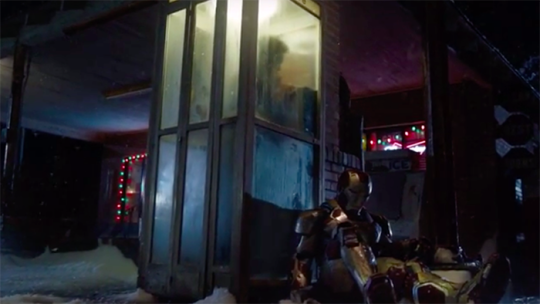
“Pepper, it’s me. I’ve got a lot of apologies to make and not a lot of time. So first off, I’m so sorry I put you in harm’s way. That was selfish and stupid and it won’t happen again. ...And I’m sorry in advance because I can’t come home yet. I need to find this guy. You got to stay safe. That’s all I know.” —Tony Stark, Iron Man 3
Yes, Tony absolutely provoked the Mandarin, a known terrorist, and the result is the complete annihilation of Tony’s home. Tony accepts responsibility for the destruction as though he was the one who shot the missiles himself. He goes so far as to volunteer himself for a solo mission to find the Mandarin without even bothering to contact SHIELD or the Avengers for help. He made this mess, he’s going to clean it up. All the while he suffers through crippling anxiety and panic attacks, demonstrating that the burden he’s put on his own shoulders is, in fact, too much for him to handle by himself. Still, Tony denies himself the comforts of home and family until he can atone for his wrongdoings.
Miraculously, Iron Man 3 gives Tony a respite when the tables are turned and, for once, Tony is the one ultimately saved by Pepper. After her rescue (pun intended), Tony gives up the armor, commits to having the shrapnel taken out of his chest, and he starts rebuilding the literal ruins of his life—both physical and metaphorical.
The respite doesn’t last, of course, because recovery doesn’t go in a straight line—oh, and also the franchise isn’t over and the MCU kinda needs Iron Man. And so Tony slides back into familiar, self-destructive patterns.

"Few years ago, I almost lost [Pepper], so I trashed all my suits. Then, we had to muck up Hydra. And then Ultron. My fault. And then, and then, and then. I never stopped. 'Cause the truth is, I don't wanna stop.” —Tony Stark, Civil War
Tony taking on the mantle of the Messianic Archetype once more in Endgame falls perfectly in line with his established need to compulsively and perpetually atone for his sins. As a perfectionist who needs to assuage his guilt for his ongoing (and perceived) failures, Tony simply can’t stop himself from offering up his life in penance. Statistically it was bound to catch up with him, and in Endgame it does.
And not only does Tony give his life in true Messianic fashion, we are “treated” to a hyper-realistic and painfully extended sequence where his life drains out of him as his loved ones gather to witness him gasping out his last breath. (Thanks for that, by the way, Marvel. I’ll put this scene with the dead baby bunnies my childhood cat used to bring home as gifts. How thoughtful.)

Maybe the reason for the intensity of Tony’s death scene is to make the audience believe his death is the Real Thing, not some comic-book-superhero-movie trickery that he’ll be back from in a few minutes’ time. Perhaps it’s the only way to ensure we commit to the emotional depth of the moment. Perhaps the filmmakers see it as an homage to RDJ’s acting talent and commitment to the role. Regardless of the rationale behind the camera’s unflinching gaze, Tony’s excruciating death hammers home the brutal and lonely reality of the Messianic Archetype: it’s cruel to put the fate of the world on one person’s shoulders.
But Tony embraces that end. He throws himself into the machinery of fate, convinced he’s the cog that will make it all work.
And he does make it work.
So why is that a problem?
+
.
The Team-Oriented Universe
The problem with Tony doubling (tripling? quadrupling?) down on the Messianic Archetype at the apex of the franchise is that the MCU is an ensemble, team-oriented universe.

“You think you're the only superhero in the world? Mr. Stark, you've become part of a bigger universe, you just don't know it yet." —Nick Fury, Iron Man
Fury tells us from the get-go that Tony isn’t the be-all-end-all of the MCU. It’s possible for Tony—for them all—to become something greater than the sum of their parts.
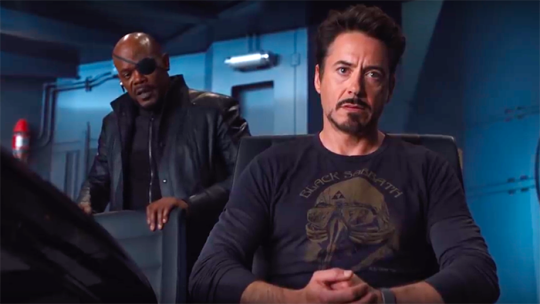
“There was an idea, Stark knows this, called the Avengers Initiative. The idea was to bring together a group of remarkable people, see if they could become something more.” —Nick Fury, Avengers
The entire first Avengers movie is dedicated to establishing this premise, to getting these knuckleheads to work together because, alone, they’re too wrapped up in their own bullshit to adequately deal with the forces that threaten the planet. Things don’t start to go right for them until they set aside their personal issues and act as a unit.
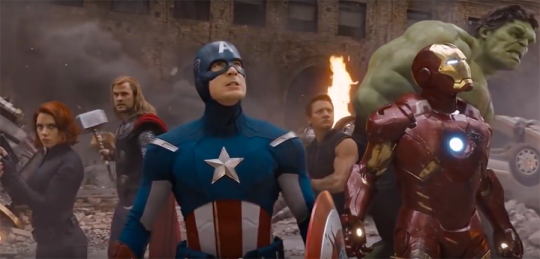
As we all know, our team passes the test and they establish an important principle of the MCU: teamwork is powerful and it’s more effective than working solo.
True, Tony’s self-sacrifice in the context of the Battle of New York helps save the day; but it’s only one part of a coordinated effort. Tony chucking the nuke into space would have been pointless without the added efforts of Steve to coordinate civilian safety, Hawkeye to relay enemy movements, Thor to separate Loki from the scepter, Natasha to close the portal, and Hulk to subdue Loki and ultimately catch Tony as he fell from the wormhole. The team achieved a better outcome together than they each could have achieved separately.
But even in the shared afterglow of winning the Battle of New York, the individual members of the team struggle to perfect their dynamic. New challenges present themselves. There’s always room for the team to grow and become stronger together as the franchise progresses. That’s the whole point.
Tony, for his part, waffles back and forth between his desire to be the savior mechanic (to fix everything by himself) and his desire to work cooperatively with his found-family of superheroes for the common good. This internal conflict plays out over the course of the franchise as Tony takes on the Mandarin by himself in Iron Man 3. The issue then escalates in Age of Ultron when Tony convinces Bruce to help him create Ultron, unbeknownst to the rest of the team. Murder-bot problems and team drama ensue. Tony’s cycle of guilt perpetuates itself in the wake of the disaster in Sokovia, which prompts Tony to adopt the Sokovia Accords. He submits himself and the team to UN governance in Civil War. More team drama ensues.
The logical progression of this escalating team conflict should have involved Tony confronting his deep-seated compulsion to destroy himself for the sake of others. This is exactly the problem Pepper keeps trying to point out to him—his Messianic tendencies have started to cause more problems than they solve.

“There is nothing except this. ... There's the next mission, and nothing else.” —Tony Stark, Iron Man
Tony has struggled from the beginning to find the right balance between personal sacrifice and sharing team effort.
Pepper frequently tries to remind Tony that he doesn’t live alone in the world, he can’t do it all by himself. And there are people who want him to live.
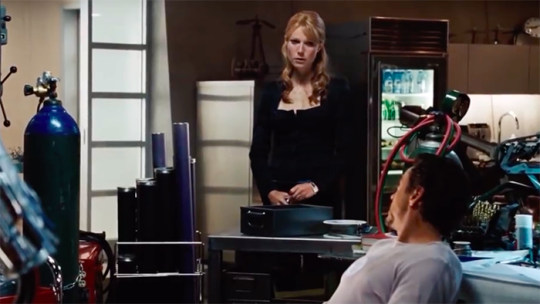
“You’re all I have, too, you know.” —Pepper Potts, Iron Man
Imagine how emotionally satisfying it would have been to see Tony outgrow his need for sacrificial penance and internalize a better lesson: that the savior can be saved, the burden can be shared, and life can go on.
+
.
A Better Ending for Tony
The MCU had the perfect opportunity to give us an ending that would be happier for Tony and a better fit for a team-centric universe.
In Guardians of the Galaxy we see Peter Quill and his team survive the power of an Infinity Stone by working together to share the burden of its energy.
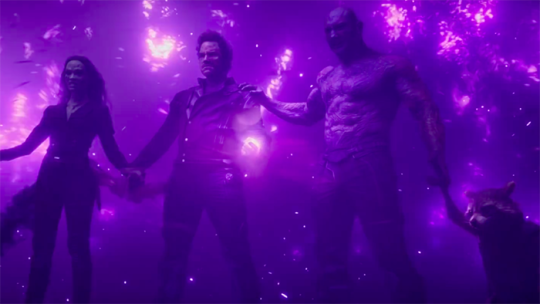
Peter Quill is the son of a Celestial—he’s basically immortal up until the end of Guardians of the Galaxy Volume 2. That’s why he and his team could hold the stone without any ill effects.
Also, they only had to channel the power of one stone. Not six.
That’s a fair point.
But by the time Tony had all of the Infinity Stones in Endgame, the battlefield was chock full of all kinds of superheroes. Wanda and Carol by themselves are embodiments of two of the Infinity Stones. Hulk had managed to bear all of the stones by himself earlier in the movie. Steve, T’challa, and Bucky are enhanced super soldiers. Thor, Valkyrie, and the other Asgardians might not be Celestials, but they are gods—and there were a lot of them on that field.
And we’re supposed to believe none of these characters could offer any help to Tony whatsoever? None of them could hold Tony’s hand for a single minute to save his life?
There are plenty of arguments that could be made: Tony was too fast, no one knew what was happening, or everyone else was occupied in battle. But at the end of the day, it’s a choice the creative team made. Tony died because they wanted him to die.
And not much would have to change to save his life.
Imagine this: Tony gets the stones from Thanos and, in true Messianic Archetype fashion, he commits to making the snap, fully expecting it means his death—but then Pepper is there and Pepper has always been the one asking Tony to stop offering up his life to pay for some imaginary debt he thinks he owes. He hesitates, and it’s just long enough for Carol and Wanda swoop in, putting their hands on him and taking the brunt of the energy. Thor and Steve and Bruce and Clint pile on. Peter Parker links up, too, and on and on until the entire rest of the team, all across the battlefield, are in contact with each other and alight with power, channeling the energy of the six stones, keeping Thanos and his monsters at bay.
Tony can still have his ultra-badass “I am Iron Man” moment as he stands at the center of this surging and fluxing cosmic energy—but this time he does it with support. There are people who care about him (and each other) on all sides. And there are so many of them. Tony isn’t the only one who matters, he’s just the lynch pin that holds it all together.
Tony is Iron Man.
More importantly? Together they’re all the Avengers.
*SNAP*
The universe is set right.
Maybe Tony doesn’t escape entirely unscathed. Maybe he loses his arm as suggested by this post. Maybe the others all leave with their own scars, too. But Tony’s alive and he’s finally, deeply aware of what it means to transcend the limits of personal sacrifice and share the hero’s burden with others.
He knows now exactly what the Avengers are capable of. Oh, and by the way? That protective shield he wanted around the world in Age of Ultron? Here they all are. All these wonderful, powerful people are going to protect the Earth. And you know what? They don’t need Tony Stark’s myopic self-sacrifice to do it.
Tony finally feels like he’s done enough—and maybe now he believes there are other heroes out there who can do better than he can. Anyway, he gets to go home to Morgan and Pepper and he finds that it’s not so hard for him to let the new kids do the tough jobs now. He happily goes back to his role as “consultant” for the Avengers, he’s a mad inventor helping change the world for the better, and he also gets to have the long adventure of being a husband and a dad. He doesn’t have to choose one identity over the other—he’s Iron Man. He can redefine what the job means whenever he wants to.
(Also, he finds a way to rescue Nat because she didn’t deserve to be fridged like that. Just saying.)
This ending, or any number of variations like it, would have allowed Tony to finally show real growth at the end of his character arc, instead of succumbing to the same old self-destructive pattern we've seen from him time and time again. And it would have reinforced the theme of teamwork and its power to elevate all those who participate.
Maybe it’s cheesy, but you know what? It’s the ending I wanted. I know I’m not alone.
+
.
Tony’s Not Really Dead, You Say?

“There’s no need to be upset about Tony’s death,” some might say. “Tony’s gonna come back!”
Resurrection is a huge part of the Messianic Archetype—and it might be that the filmmakers do intend to bring Tony back in some later movie. It might be they simply want Tony’s death in Endgame to sit a little while longer so it has a greater impact. (Gotta push for that best picture Oscar, right? The Oscars hate superhero movies, but they do love a sad ending.)
While I’m wishing for things, maybe Marvel will also release the multiple alternate endings they filmed for Endgame, essentially creating a “choose your own adventure.” Maybe we’ll all be able to pick the ending we like best and forget the rest exist.
But I can’t make a judgement based on what might be, I can only say how I feel based on what we were given in the theater—for all intents and purposes, that’s the official story Marvel wants to share.

The Endgame narrative insists there’s only one possible path to victory against Thanos. The “one possible path” is basically the equivalent of the creative team saying, “Don’t @ me.” There certainly must have been an impossible number of endings they could have put on film. Tony’s death is the one they picked.
So, sorry for @ing you, Marvel, I guess, but there’s just one more point I want to make...
+
.
A Personal Note
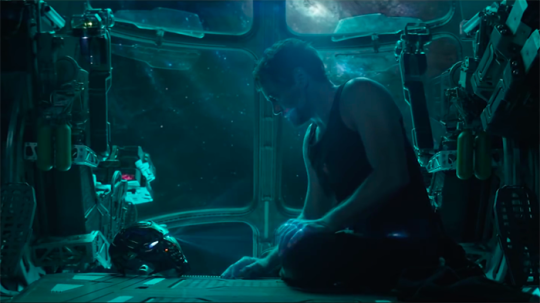
RDJ acted the hell out of Tony's final scene. He acted the hell out of the whole franchise. Tony's death was powerful and intensely moving. I wanted to ugly cry in the lobby after the movie was over, and I was upset for days after.
So. Good job, Marvel. You got in some surprises and you wrung out some feelings from viewers like me. Now that the movie’s taken the world by storm, the surprises will play themselves out. So, I guess the big question is: Will audiences want to revisit this adventure and the feelings you ultimately left them with?
For me? My reluctant answer is: no. I don’t want to see Infinity War or Endgame again. Not really. Not in their entirety. I didn’t mind the slog through Infinity War in 2018 because I thought, Hey, maybe this is leading to an ultimately happy and satisfying conclusion for these characters I care about so much. And, to be fair—right up until the last 15 minutes of Endgame, I was ready to say, “All’s forgiven.”
There’s this thing in storytelling called “payoff.” It’s when you deliver a satisfying resolution or fulfillment to your audience after they commit to your narrative journey. Payoff can be extraordinarily subjective, so, again, I acknowledge that there’s no way to please everyone.
For me, there’s no reward in the resolution of Endgame that makes the slog to its conclusion worth it. Tony’s ending is so needlessly sacrificial, so unnecessarily brutal, that it erases much of the enjoyment I otherwise had in watching the entire rest of the film.
Don’t get me wrong. I like sad movies and scary movies in their own context. I like them when I can choose them and know that’s what I'm getting myself into. Sometimes I want the catharsis of being utterly terrified or brought to tears. Sometimes we need stories to give us the chance to feel deep and scary emotions in a safe environment. That’s an important function of creative work.
And, I mean, truly, Endgame gave us some great acting, great effects. Amazing talent. Really fun and creative moments. I’m not trying to disparage all the work that went into its making.
But I feel like someone took me in a limo to a high-class restaurant to eat caviar and watch sad arthouse theater when all I really wanted was to go into town with my friends for some ice cream and a fun movie.
I didn’t need rainbow-colored sprinkles on my ending, but something a bit sweeter would have been nice. So, well done, Marvel. But also—no, thank you.
As it stands, Endgame was too bitter for my taste.
68 notes
·
View notes
Text
Sonic Villains: Sweet or Shite? - Part 13: MEPHILES
There are some villains I like. And there are some villains I don’t like. But why do I feel about them the way I do? That’s where this comes in.
This is a mini-series of mine, in which I’ll be going into slightly more detail about my thoughts on the villains in the Sonic the Hedgehog franchise, and why I think they either work well, or fall flat (or somewhere in-between). I’ll be giving my stance on their designs, their personalities, and what they had to show for themselves in the game(s) they featured in. Keep in mind that these are just my own personal thoughts. Whether you agree or disagree, feel free to share your own thoughts and opinions! I don’t bite. :>
Anyhow, for today’s installment, we’ll be covering the malevolent spirit of Sonic the Hedgehog 2006, and #1 Shadow cosplayer across the nation: Mephiles the Dark.
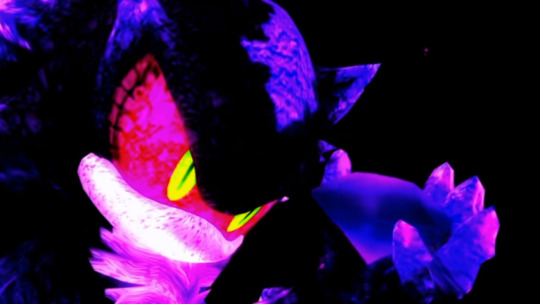
The Gist: On Sonic's 15th anniversary, a little game was released. You might have heard of it. People like to bring it up a lot, regardless of the time or reason. It's called Sonic the Hedgehog, ostensibly, but we tend to call it Sonic '06.
It did not live up to expectations.
But what's the story?
Life was suffering for poor Silver the Hedgehog. His world was ravaged by a fire monster, he could never truly defeat said fire monster no matter how hard he tried, and his sole companion was only there because the writers didn't understand how backstories work. Things appeared to be looking up for him though, when he was approached by a mysterious black hedgehog, who offered a permanent solution to the hero's seemingly fruitless quest. Silver looked at this hedgehog with no mouth, slitted eyes, and ominous deep voice, and accepted the offer without hesitation.
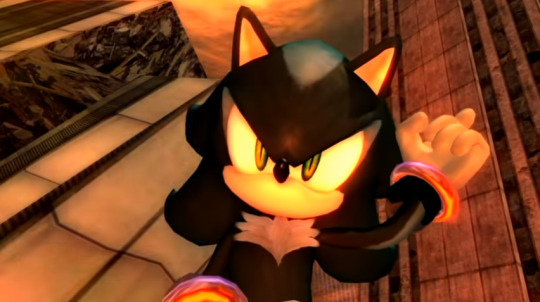
"If only they knew..." *wink*
The completely trustworthy hedgehog reasoned that in order to destroy the Flames of Disaster, Iblis, Silver must destroy the one who unleashed it in the first place. The "Iblis Trigger", if you will. Who is this catalyst though, according to this perfectly benevolent hedgehog? None other than Sonic the Hedgehog, the hero of whatever Sonic's world is called this week. No more Sonic, no more Iblis, so says the absolutely well-intentioned hedgehog. Silver accepts all of this without question, because his intelligence ranks somewhere between "potato" and "Madoka Magica protagonist". He's then sent on his way by the definitely good-natured hedgehog through the means of time travel. This is barely questioned as well.
Meanwhile, in the present day, Shadow the Hedgehog is doing his duties as a new member of G.U.N, as they were fortunately able to make amends and can now look back and laugh at the time they killed his friend. His mission is to assist fellow agent Rouge the Bat in the kingdom of Soleanna, and when he catches up to her, she reveals a peculiar discovery: a tool known as the Book Scepter of Darkness.
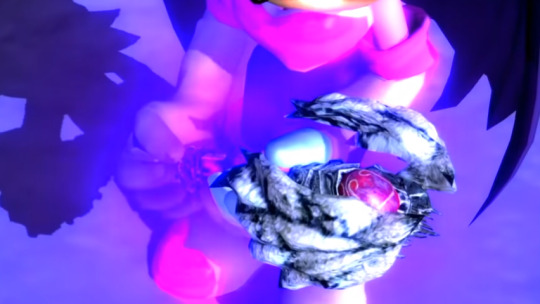
Even the PS3 lighting couldn't contain its power.
After a brief discussion about the kingdom's history, they made their way through the ruins of the ancient Soleanna castle, where Anti-Furry Activist Dr. Eggman was waiting for them, in the hopes that they would politely give the Book Scepter of Darkness to him. The two comrades tussle with some of the doctor's robots, but the Book Scepter suffers in the midst of the crossfire, and is destroyed completely... releasing a slightly phallic surge of dark energy in the process. Eggman promptly gets the fuck out of there, and the darkness soon takes the form of Shadow himself... and the same hedgehog that would appeal to Silver's wishes. He also knows who Shadow is.
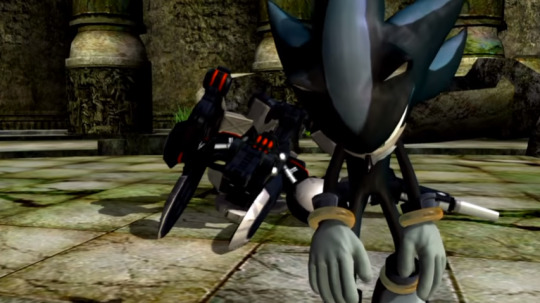
"Fucking hell, this is my design...?"
His name? Mephiles the Dark.
Not Mephisto.
Not Mephistopheles.
Mephiles.
The Dark.
Mephiles the Dark.
Mephiles the Evil.
Mephiles the Hoodlum.
Mephiles the Wrong'un.
Mephiles the Right Prick.
So you know he's a villain who demands to be taken seriously.
Mephiles quickly sends Shadow and Rouge on what he dubs "a one-way ticket to oblivion", which is actually just the same place where Eggman forcibly sent Sonic away to, alongside his buddies Tails and Knuckles. It's Silver's time period, the one plagued by the Flames of Disaster. Shadow contemplates these recent happenings as the colour palette suddenly dies for no reason.

A minor disappointment in an otherwise high-quality gaming experience.
Since the computers in this horribly ruined world still work better than Windows Vista, they use one of them to figure out the nature of their plight, and maybe check out Craigslist while they're at it. They are understandably concerned about the answer, as a madman with time travelling capabilities is no laughing matter. Shadow takes this potential threat very seriously, and he will not be distracted under any circumstance.

When they meet up with Team Sonic, they decide to work together in order to figure out how to get back to their time, because friendship truly is magic. Along the way, Shadow and Rouge discover the dusty form of a sleeping E-123 Omega, and they leave him there. Because friendship truly is magic.
Soonafter, the five of them encounter Iblis, and a tedious battle ensues until Iblis itself gets bored and fucks off. Using the power of two Chaos Emeralds, they induce Chaos Control, which in this game means...
*spins Deus Ex Machina wheel*
...they go back in time. Alright then.
So they do. Except for Shadow, who catches sight of the evil Mephiles the Dark and immediately gives chase. Mephiles has a surprise for him however... another Shadow. An imprisoned Shadow. Mephiles claims that he was used as a scapegoat for what happened with Iblis, which naturally unnerves the Ultimate Lifeform.
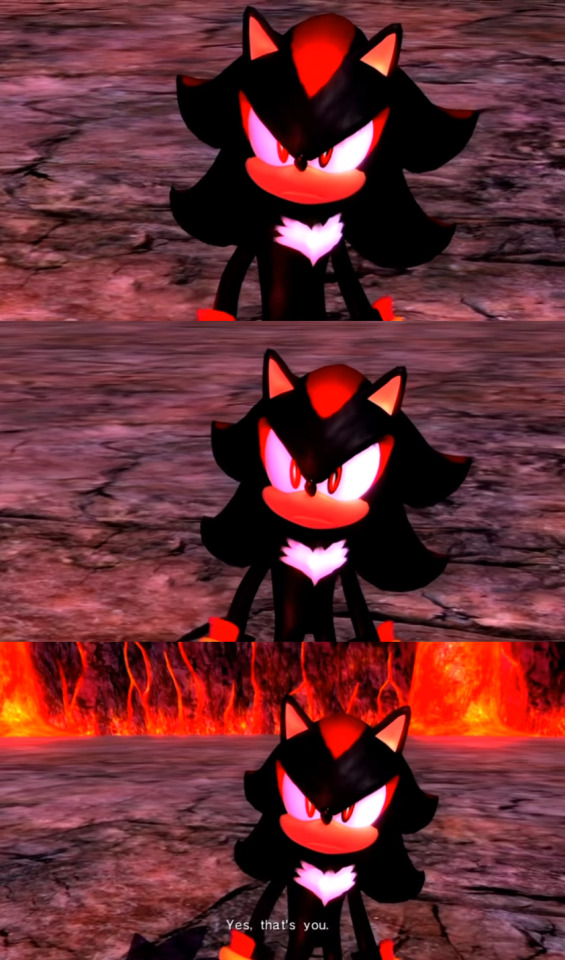
RAW EMOTION
Mephiles offers Shadow to join him in his cause for justice, under the belief that humanity hates Shadow, humanity fears Shadow, and humanity will make a martyr out of Shadow the first chance they get. Unfortunately for Mephiles, Black Doom said all this beforehand, and he's dead now, cause Shadow ain't taking this shit anymore. He made a promise to the Professor and Maria, and he intends to keep it. It's time to live up to his family name, and face Full Life Consequences™.
They fought.
Shadow won.
With a little help from a non-dusty, present day Omega, who was sent by Rouge.
Mephiles escaped with his time travel prowess, and Shadow and Omega followed after him. They arrived back in the present, but with no sign of the deadly demon. Meanwhile, said demon was reiterating to Silver that Sonic is totally the Iblis Trigger he's after, absolutely, dead-on. Silver barely questions him once more, and as punishment for his extreme foolishness, Shadow finds him and teaches him a lesson in pain.
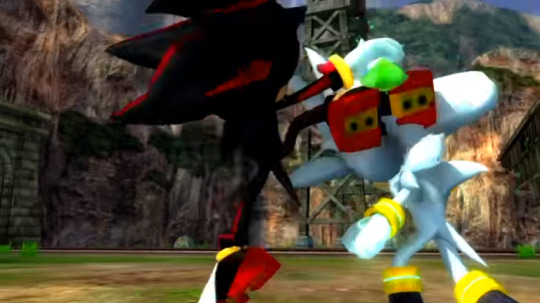
"I'm Shadow the Hedgehog. Get shanked. This is who I am."
During battle, they accidentally induce Chaos Control together, which summons another time portal that Shadow somehow already knows in advance where it'll take them. They travel to ten years prior, where they find the then-alive ruler of Soleanna, the Duke, attempting valiantly to harness the energy of the omnipotence known as Solaris. Instead, he gets an explosion in the face, and Solaris divides itself into two different entities. Aggressive flames, and a mass of darkness... Iblis and Mephiles. They were two halves of the same being the whole time.
The two hedgehogs split up to stop the two halves from escaping. Thanks to the Book Scepter of Darkness the dying Duke gave him, Shadow successfully seals the formless Mephiles away, thus explaining how Mephiles knew who Shadow was ten years later. Shadow and Silver eventually return to the present, but not before Silver laughs in the face of Sonic continuity and gives his blue Chaos Emerald to the young Princess Elise, the daughter of the recently Wasted™ Duke.
After reuniting with Rouge, and after obtaining a brand new Book Scepter of Darkness, Shadow and her learn that E-123 Omega is engaging Mephiles, meaning they must head to Wave Ocean (head to Wave Ocean?)... ... ...Shadow and her learn that E-123 Omega is engaging Mephiles, meaning they must head to Wave Ocean immediately. (Sorry about that, I'll fix it in post.)
Omega was indeed engaging Mephiles. Very easily at that. Yet Mephiles took his humiliation in stride and escaped while laughing all the way. Omega confesses to Shadow that he is in fact the one who will go on to imprison him in the future. Rouge reassures her old friend that even if the rest of the world turns against him, she'll always be at his side no matter what. Shadow in turn expresses gratitude for one of the only instances of good writing in this game, and the three of them leave for Dusty Desert, where Mephiles is hiding away like a Scooby Doo baddie.
When they finally confront Mephiles, he tries the exact same tactic that failed to bring Shadow over to his side to bring Shadow over to his side. He did not succeed in bringing Shadow over to his side.
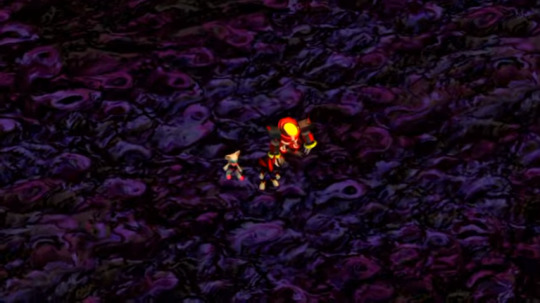
"Ugh, blackcurrant."
They fought again.
Shadow won again.
And with the new and improved Book Scepter of Darkness, he seals the villain away once more... for about five seconds, before the Book Scepter unexpectedly tears itself apart. The fiend has apparently developed an immunity to this old song and dance.
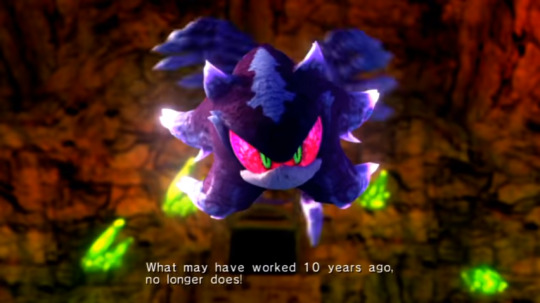
"Now for my next trick, I shall make my credibility disappear!"
He then summons a whole pack of Mephiles's's's's's to do away with Team Dark. But unbeknownst to him, Shadow has a trick of his own up his non-existent sleeve. By removing his inhibitor rings, he could become even more needlessly overpowered for a limited period of time. This was more than enough to send the army of clones flying like skittles.
Alas, the real Mephiles escaped yet again. And this time, he topped himself by fulfilling IGN's dreams and killing Sonic the Hedgehog himself. The older Princess Elise, his latest friend, was grief-stricken.

RAW EMOTION
Unable to keep her emotional turmoil in check, the princess wept, which released the mighty Iblis into the present time. As it turns out, this was Mephiles' real plan all along. He intended for Silver to kill Sonic so that Elise's ensuing tears would unleash the flames, but he finally decided to do the deed himself. Using all seven Chaos Emeralds, which he warped them to where he was like it was nothing, Mephiles rejoined with Iblis once more, and Solaris was officially back in business to corrupt reality as he saw fit. Time distortion? Environmental disasters? Soulja Boy game consoles? It's all the work of Solaris.
But while Solaris was fucking time and space's shit up, Sonic's friends (and Silver) gathered all the Emeralds together, and with some... curious assistance from Elise, they brought the dead hedgehog back to life. In his super form, no less. Shadow and Silver were granted some of Super Sonic's power in order to turn super themselves, and the Hedgehog Master Race obliterated Solaris so bad that he reverted to his original form of a tiny white flame... which was soon blown out by Elise, despite knowing that time would reset itself in the process. The threat of losing her memories with Sonic took a toll on her, but with the hedgehog's own encouragement, she pulled through regardless.
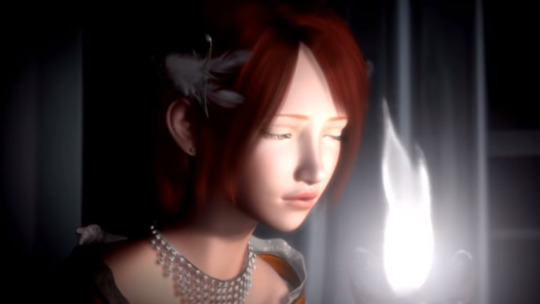
Merry Christmas.
Thus, from the Soleanna Festival onward, everything started over. This time around, the festival could commence in peace, as Eggman wasn't there to menace the princess with his golden udders. For the Flames of Disaster, Iblis, Mephiles, Solaris... they were all literally forgotten by time itself until Generations. Why they were now holding a festival for a god who never existed remains a mystery, but Elise couldn't help but feel that the "wind" was strangely familiar, and pleasantly so.
That same wind enjoyed a good night, possibly aware of what he had to go through to get there.

"That's a lovely full moon. A lovely full, whole, complete, non-fractured moon. Would be a shame if something happened to it."
The Design: Mephiles spends his initial scenes as a shit recolour.

"This is my Chaos Emerald OC, his name's Genocide the Blitzkrieg."
On the other hand, he spends his later scenes as a shit recolour.
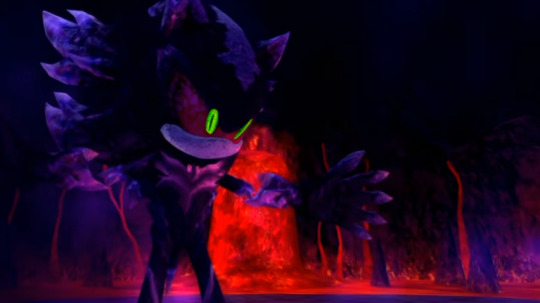
He can't believe it either.
Which is a shame, because there is an appeal in the concept of a shadowy being made of crystal. It's just incredibly undermined by how it's mimicing Shadow's form, and for little justified reason at that. Outside of a single quip about him being Shadow's shadow, Mephiles doesn't really do anything to warrant the "Evil Shadow" angle he's apparently going for, which makes his recolour status even more pointless.
(And yes, I know his chest hair kind of looks like Solaris. That doesn't mean his design is suddenly good or clever.)
The Personality: Remember how Black Doom was a complete and utter void of evil for its own sake? Good, beause Mephiles is exactly the same, and it could be argued that he's actually worse than Mr. Ten Packs a Day.
Oh sure, you say. He might have a motive in the form of wanting vengeance for being experimented on. Too bad this is not established in any way whatsoever with what we see of Mephiles in the game proper. When he's not transparently fooling Silver, he spends all his time cackling and taunting. Any time he brings up humanity is when it involves Shadow's expense, not his own. His goal to rejoin with Iblis isn't given any tragic or sympathetic angle, and is purely to serve as his Cause Even More Destruction Card. Even Shadow lampshades his lack of motivation beyond craving destruction, and you can’t say his imprisonment in the Book Scepter of Darkness made him go mad, because even before he got sealed the first time around, he was already threatening Shadow with death.
And make no mistake, not all villains need to be especially sympathetic. Villains who are just cruel or selfish bastards for petty reasons can work just fine. Eggman does it beautifully in this very franchise. But Eggman is also funny, brave, intelligent, and has a clear motive beyond evulz that's backing up his actions, despite that motive's simplicity.
What else is there to Mephiles?
His weird attempts at being cryptic...?

"Is Lara-Su Chronicles legit?"
His lackadaisical Crash Bandicoot impression...?
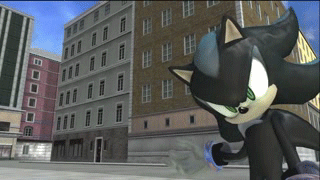
Cortex Laughs Back
There's just nothing to this guy. And for a character with his backstory, it's all the more noticeable and disappointing. But hey, at least he's a cunning schemer and a powerful opponent, right?
Well, about that...
The Execution: I'm going to get straight to the point. I don't like Mephiles. I really don't like Mephiles. Next to Scourge the Hedgehog and Eggman Nega, Mephiles is one of my absolute least favourite characters in the entire Sonic the Hedgehog franchise, adaptations included.
"But why is that?", I hear you not asking. "Why do you detest him so? Is it his design? Is it his lack of personality? Is it his story?"
Those are all key ingredients, yes. But more than anything else, it's that he's played up to be a cunning mastermind, and is regularly applauded even by '06's detractors for being a cunning mastermind... when in reality, he is one of the absolute dumbest characters in the whole franchise. No, that is not an exaggeration. Silver and Elise in the same game were far from flawless, but Mephiles deserves much more ridicule than either of them. He is completely undeserving of the kudos he frequently receives for his supposed magnificent bastardry, and I'm about to tell you why.
Strap in, folks.
We're about to go through why the evil plan of poor Leslie makes no sense whatsoever.
Well done in advance if you don't fall asleep.

Too late.
1. He could have fused with Iblis at any time he wanted. Despite what many fans claim, NOTHING in the final game so much as implies that Mephiles needed certain requirements to fuse with Iblis. Meaning he could have completed his mission at the beginning of the game, from the moment he met Silver for the first time. Instead, he’d rather monologue to Silver and butcher the English language.

Guess I'll go and done that.
Let’s put that aside for a moment though, and assume that Mephiles needed the Chaos Emeralds to fuse with Iblis. That’s reasonable, except...
2. He could warp all seven Chaos Emeralds to his destination immediately. That’s an incredibly useful ability to have, especially when you're plotting something as major as reuniting with the other half of a god-like entity. He has no reason to not use this ability as soon as possible, aside from him simply forgetting he could do it.
Well, Silver had to have some vital role in his plan, surely...?
3. He had no use whatsoever for Silver. He goes out of his way to rely on Silver to eliminate Sonic, but he could easily kill Sonic himself with no trouble at all. Nothing is preventing him from killing Sonic. He’s not trapped somewhere. He’s not been sapped of his powers. All he’s guaranteeing with Silver is giving himself a potential enemy in the future when the jig is inevitably up, and sure enough, in the rare moment when Silver actually questions him, Mephiles dodges the query in the most suspicious manner, and always gives vague, shifty half-answers.

Fig A: The Twitter defense.
He’s only complicating things even more for himself, and again, for no reason. His only potential motivation for manipulating Silver is because it’s the evil thing to do. And the only reason Silver falls for his ruse is because he was made to be a complete idiot in order to make Mephiles look smarter than he actually is. Not that Silver was alone in that department...
But you think “Well, maybe Mephiles is tricky, but not actually that strong. So he needs Silver to kill Sonic since he can’t do it on his own.” It would explain why he’s a damage sponge in his boss fights, and why he relies on minions and clones to do all the work, right?
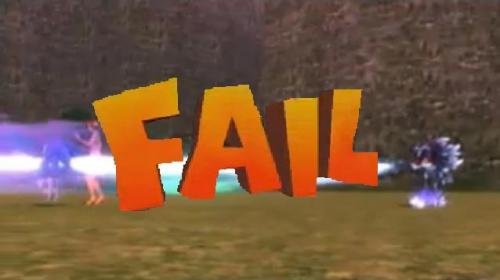
Nope.
He eventually kills Sonic himself anyway. Which leads us to...
4. He has no limitations to his powers. You might be inclined to assume he would be weak, yet smart, in contrast to Iblis being strong, yet dumb. Admittedly that would make logical sense, and it would tie in thematically to their motifs of being the consciousness and the raw power of Solaris respectively.
But that’s not how it went. Maybe that was the intention (again, note how he’s something of a sitting duck when you get past his minions), but in cutscenes, he’s as much of a powerhouse as the likes of Shadow. Which reinforces the fact that he wasted his time with Silver, because he could have - and did - kill the Blue Blur with his own hands.
But at least he actually killed Sonic, right? After all, that was the key to unleashing Iblis courtesy of Elise’s tears, yes? Weeeellll...
5. He could have killed Elise instead. Elise’s crying is NOT the only way to release Iblis from within her. As the report that Tails read in Crisis City confirmed, Elise had died in that time period due to being aboard the exploding Egg Carrier, and Iblis’ presence is very prominently felt in that time period’s future. So Mephiles could have killed the princess herself and achieved the same results, without ever needing to bother with Sonic and/or Elise’s emotional connection to him.
Okay then, what about Shadow? Mephiles was pretty serious about swaying the Ultimate Lifeform over to his side... wasn’t he...?
6. He wasted his time with Shadow too. Like Silver, his frequent mind games with Shadow served him absolutely no benefit in relation to his goal to reunite with Iblis. He wasn’t even truly invested in turning Shadow evil to begin with. Whenever Shadow tells him to fuck off back to the Antarctic, Mephiles shrugs it off every time. It’s just a game to him, and it’s a game that prolongs his objective even further. Compare this to Black Doom, who at least was genuinely committed in getting Shadow to join him, and as dumb as it was, at least Shadow was actually a vital part in Doom’s scheme.
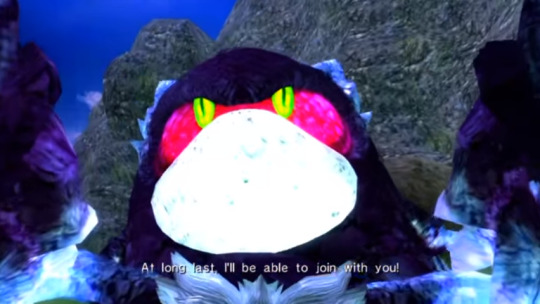
"It's just... I wasn't ready before... I wasn't sure if I could commit..."
Despite everything however, he still managed to become Solaris in the end. How did he lose then...?
7. He threw the Chaos Emeralds away, thereby giving Sonic’s friends a chance to nab the Emeralds themselves. Which of course revived Sonic, turned him super, and you know the rest. He could have kept the Emralds to himself, or maybe even destroy them outright. Instead, he was generous enough to hammer the final nail in his coffin.
Also, what did he intend to do afterwards? When all of time and space was destroyed, would that have included himself? Or would he have sat around with his thumb up his arse in a featureless void for all of eternity? Your guess is as good as mine.
And finally, let’s go over a few leftover arguments:
“But Crusher, he still KILLED SONIC!”
You’re right, he did. But how did he kill Sonic?
Not by beating him in a fight.
Not by using genuine brilliance.
No... he killed Sonic by distracting him with a light, and stabbing him from behind.
This is hardly flattering for either character. Sonic gets a laughably undignified death, and Mephiles’ method of execution is extremely unimpressive. And on top of that, the dynamic between the hero and the villain falls flat, because there is no dynamic. Sonic himself doesn’t have any kind of connection or relationship with Mephiles, because up until his death, he saw Mephiles a grand total of once. And even then, he knew nothing about him, not even his name. So the person who killed Sonic the Hedgehog - from Sonic the Hedgehog’s point of view - was literally just “some guy”. (Sonic didn’t even acknowledge his existence. It was Knuckles who did that.)
“But Crusher, he still played the other characters for fools!”
You know who else can do that? Del Boy. :P
Mephiles only looks like a master manipulator because with the sole exception of Shadow, the rest of the cast suffered the same fate as Silver. Instead of Mephiles being genuinely intelligent, everyone else is made insanely stupid to hide the fact that Mephiles himself is stupid. Instead of him achieving his goals because he’s legitimately talented or brilliant, he “achieves his goals” because the plot hands them over to him on a silver platter.
“But Crusher, Eggman makes mistakes too!”
That’s true. Eggman does make mistakes. However, there are two small but significant differences that render this comparison moot:
1. None of Eggman’s blunders are on the same tier as Mephiles’ fuck ups. An Eggman mistake is putting an obvious weakspot on his giant boss mech. A Mephiles mistake is going out of his way to jeopardise his entire plan from start to finish.
2. For all his intelligence, Eggman has always had a comedic, goofy edge to his character, so the occasional questionable decision is expected and par for the course for that particular character. Mephiles does not have that excuse. He was intended by the writers to be suave and slick, meaning he has a lot more to lose when he makes consecutive dumbass decisions.
......
I think I’ve made my point. Mephiles the Dark’s reputation vastly overshadows his actual capabilities. To appreciate what he could have been, or what he was meant to be, is one thing. But I’m looking at Mephiles for what he is, in the final product. And what he is in the final product, is one of the worst villains this franchise has ever had. People can laugh it up about Infinite, or the Deadly Six, but they have nothing on this guy. No amount of Dan Green can save him, and while I don’t like to put all of a character’s fans in the one basket, I do strongly believe that at least a sizable margin of his popularity stems from the fact that he’s a hedgehog. Either that, or the fact that he killed Sonic, despite how underwhelming that kill really was.
I’ve went on long enough about Mephiles. Anything else at this point would just be redundant. Here’s a bunch of old memes I’ve made in the past at Leslie’s expense. Enjoy.


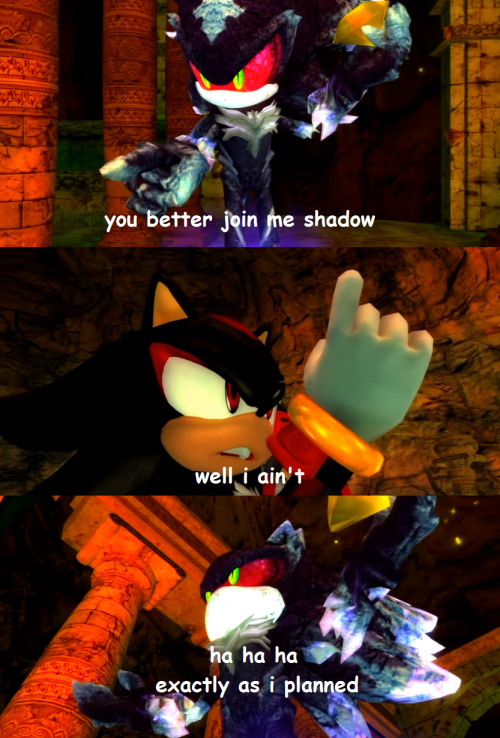
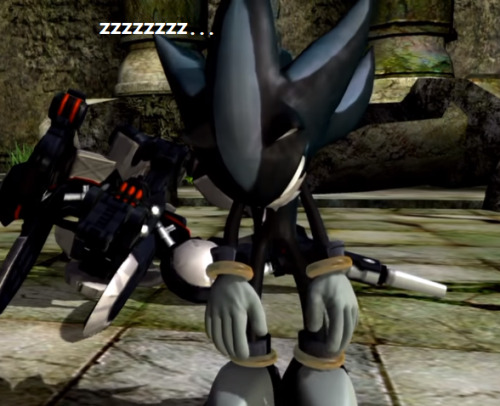

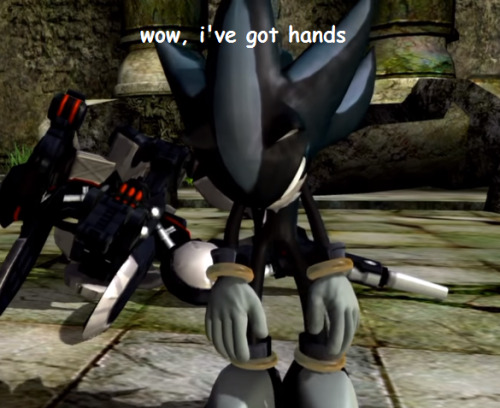
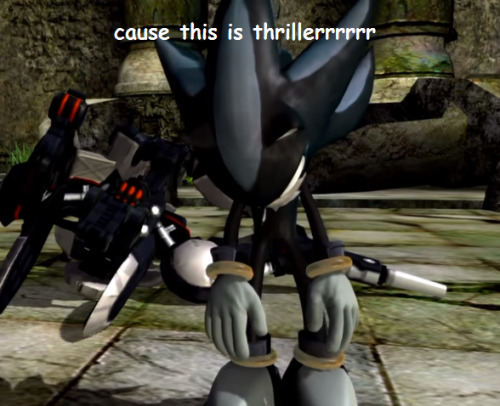


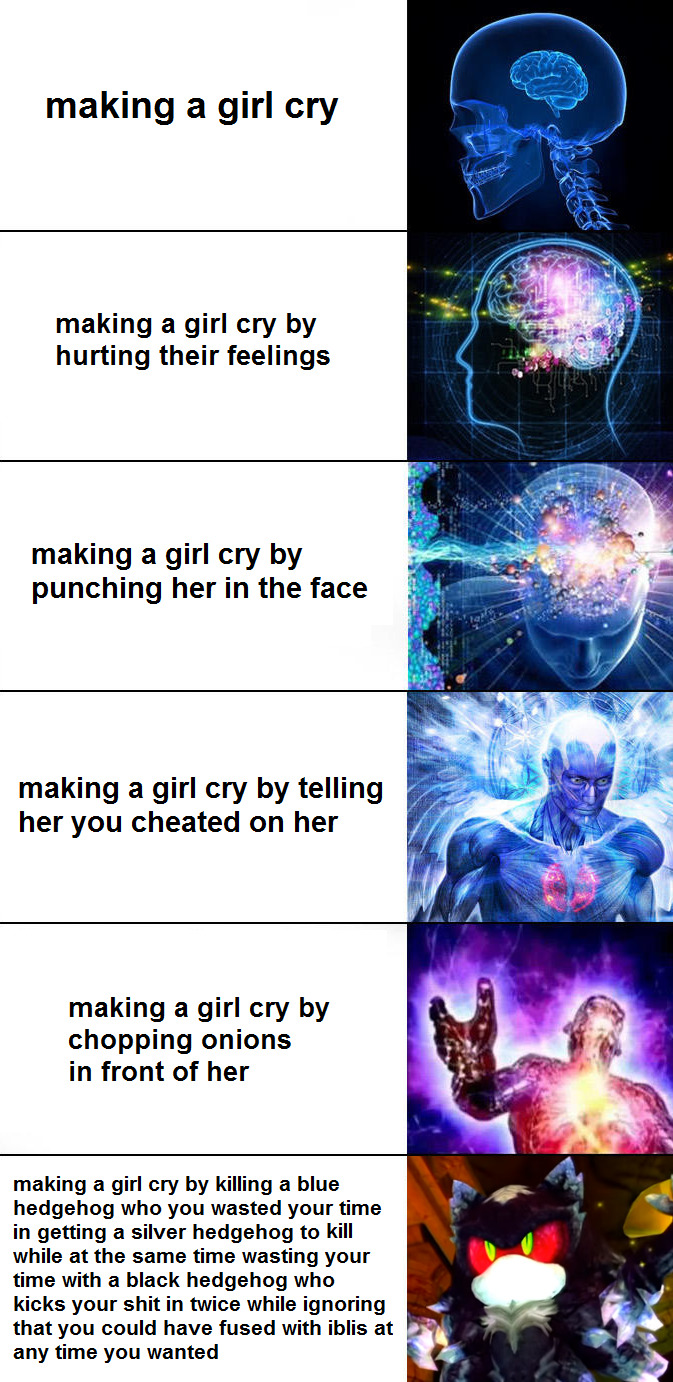
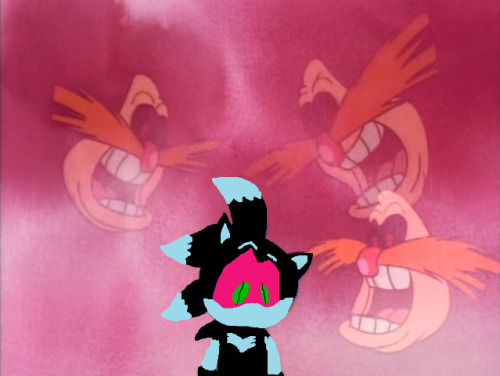
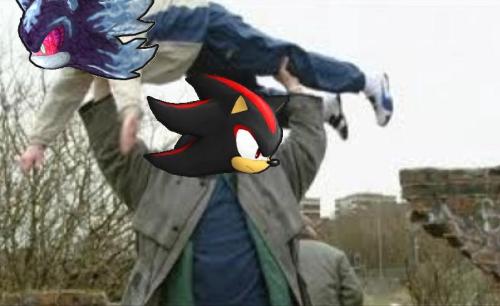
Also, his name is dumb.
Crusher Gives Mephiles a: Thumbs Down!
#Sonic Villains: Sweet or Shite?#Opinion#Sonic the Hedgehog#Mephiles the Dark#Sonic the Hedgehog 2006
115 notes
·
View notes
Text
SWTOR Parties Ranked
Wanted to see which SWTOR parties I liked best as a whole, so decided to do a little ranking of them. This is considering the entire party as a unit, and how many individual characters I feel strongly about.
Imperial Agent - Probably my favourite crew overall. I love every character in it, even if Kaliyo and SCORPIO scare the shit put of me and Lokin creeps me out, they're all fun characters to spend time with and talk to with interesting storylines. Probably gets bonus points for 3/5ths of them going on to be involved in the main plot for everyone. And I really like how they like... Acknowledge each other? There are multiple scenes of the Imperial Agent Crew talking to other members of the crew which is really cool
Trooper - This one I like because everyone has a reason to be there (which is even more than I can say for Agent - SCORPIO, Kaliyo, and possibly even Lokin and Vector can potentially have VERY little reason to stick around), they're all Havoc Squad, and Yuun and Vik are specifically recruited to be so. I also like all of the characters even if Vik, again, is kind of a piece of shit, and Yuun is kinda underdeveloped.
Bounty Hunter - With the major exception of Skadge, I love everyone on this crew. Mako is maybe my favourite starter companion overall, possibly tied with T7, and Blizz is... The best character. My jawa son. 20/10. I really love the BH crew as just this Morley crew of scum and villainy, and DEFINITELY appreciate it for being an Imperial crew with... No actual Imperials. The only points against the Bounty Hunter crew are, again, Skadge, and the fact that Gault, Blizz, and Skadge have very flimsy reasons for joining you (and Gault and Skadge have flimsy reasons for not being dead, depending on how you play your character)
Smuggler - This crew only ranks lower than Bounty Hunter because it doesn't have Blizz. But I like it for a lot of the same reasons I like the BH crew, it's just a gang of criminals trying to get by, again with no official representation from the faction they're ostensibly aligned with. Though Smuggler does again have points against it for having one character I absolutely hate in Corso (sorry Corso fans) who is probably my least favourite starter companion and one of my least favourite characters in the entire game. But it vastly makes up for Corso's dead weight with Risha, Bowdaar, Akaavi, and Guss all being characters I absolutely adore.
Jedi Consular - I like the Consular crew a lot for a lot of the reasons I like the Trooper crew, everyone has a reason to be there. With the exception of Tharan and *maybe* Zenith, it doesn't feel like the game has to strain to justify why any of the characters join your crew, they all have good reasons. The only thing I really have against it is we don't get much of the crew interacting with each other at all. There's a couple missions where they're all involved that are really cool but there isn't necessarily a sense they know each other. Also Tharan isn't as bad as Corso or Doc in terms of gross dude companions but I still... Really don't like him
Sith Inquisitor - Honestly this only goes here because I like the final two less. The Sith Inquisitor crew is... Really directionless? Aside from Khem, who is basically bound to you whether you want him to be or not, and Xalek who is your apprentice, no one really has a good reason to join the Inquisitor? Andronikos goes with you because... You helped him kill a guy I guess. Talos sticks with you because uh... I honestly entirely forget everything about Talos I don't like him very much. And Ashara... Makes sense if you actively corrupt her, I guess, but if you don't I don't really understand why she decides to stay with you forever. And if you do corrupt her the rest of her storyline makes very little sense. Besides Talos who isn't offensive, just kinda boring, and Xalek who I also don't dislike but really suffers from joining on *Corellia* which is later than literally every other character in the game and is literally the last planet, I love all of the Inquisitor companions as individuals I just don't think they really cohere.
Sith Warrior - I really like a lot of the ideas behind the Sith Warrior crew. Vette and (light side) Jaessa are absolutely fantastic characters that I love to death. Quinn is interesting as an extension of how the Warrior kinda has to deal with everyone they trust betraying them even if I hate how you're forced to forgive him, Broonmark is really interesting as a person who is so dogmatically committed to this philosophy of violence and destruction that he feels any member of his race that doesn't must be purged, and... Pierce just sucks, honestly. The Warrior crew isn't incoherent or bad, it's just full of *so* many characters I wish weren't forced to be on it. I understand why the Quinncident happens, and think Quinn's reasons for going through it are at the very least, understandable. But the fact that he HAS to walk out of it alive fucking sucks. I know the technical reasons for it, but I still dislike it. Broonmark is a character that none but the darkest dark side character would *ever* consider letting on their crew, to the point where in his Alliance Alerts it is literally *harder* to recruit him than not, and yet he joins no matter what and is also... Really underdeveloped. Pierce... Is just a fucking grunt. There's really no reason for him to continue to work with you after Taris. He did his job. And he's also... Super boring. Even Vette, who I love, doesn't... Really have a place with the Sith Warrior? Like I guess if you're a piece of shit and keep her a slave, she probably cleans the ship or whatever, but why would you take her into battle? She's a grave robber. I also don't really see how she thematically relates to the Warrior. I do love her though. She's great.
Jedi Knight - It sucks that I dislike the Jedi Knight crew so much because it is one of my favourite class storylines. But it's... Really incoherent to me? Like okay, T7 is there because R2-D2, and also he's my son and I love him. Kira is a fellow Jedi Knight (I refuse to consider her my Padawan, it makes no sense), sure. Doc... Though? Putting aside that I really hate Doc and think he sucks in every way possible, why is he here? I guess every ship needs a doctor except literally only the Trooper gets one. He doesn't really mesh with the themes of the Knight storyline? He doesn't seem like a guy who would even WANT to be on board a Jedis ship. I just don't get why he's there. Rusk, I guess, makes sense cause the Jedi have a connection to the Republic military but it still feels weird for him to be *personally* assigned to your ship and his storyline doesn't really go anywhere after he joins you. Scourge, I get, is the connection to the Revan plotline that has to be there because this is the main story of SWTOR, basically, and he's also directly connected to the emperor, so that all makes sense, I just... Don't like him (sorry Scourge fans). He's not the worst by any means but he's not a super interesting character to me? He's just a super generic Sith who decided the Emperor had to die. He also has absolutely no reason to stick around after the end of the story. Also I'm Petty and he killed the Jedi Exile for some bullshit ass destiny garbage so I really fucking hate him. And the crew as a whole feels maybe the least like a found family. Kira and Scourge have their stuff *after* the class storyline I guess, but it never feels like anyone has any connection to anyone else. They're all just... On the ship, I guess, not interacting.
If you read this far thanks, I have realized now that I'm here that this is a ridiculous endeavor and probably not a great post but I'm gonna post it anyway and I hope at least someone likes this post or agrees with some of it. Sorry again to anyone who is a fan of the characters I trashed (which, I know for Scourge at least is: Most people)
3 notes
·
View notes
Text
My granny used to put things on tumblr
It's! The Infamous! Kill The Moon! otherwise known here as the pro-life Doctor Who episode. so that's... something that was on my mind while watching. To be honest, I don't think I'd go that far, I think it was mainly politically completely unsure of what point it was trying to make at all
but yes, it makes the suggestion that Tumblr is not only around but a hit with the teenagers in the year of 2049, which is actually its best and funniest statement
sexism rank objectification (female character is ogled/harassed/turned into a sex joke by the doctor and/or a lead we’re supposed to root for and/or the camera): 8/10
sexism rank plot-point (lead female character is only there to serve plot, not to have her emotional interiority explored, or given agency to her emotional interiority): 8/10
interesting complex or pointlessly complex (does the complexity serve the narrative or does it just serve to be confusing as a stand-in for smart, this includes visually and philosophically and emotionally): 3/10
furthers character and/or lore and/or plot development (broader question that ties into the previous ones, at least two of these, ideally three should be fulfilled): 7/10
companion matters (the companion doesn’t always have to be there, but if the companion is there, can they function without the doctor– and overall per season how often is the companion the focus or POV of the story): 5/10
the doctor is more than just “godlike” (examines the doctor’s flaws and limitations, doesn’t solve a plot by having it revolve entirely around the doctor’s existence): 4/10
doesn’t look down on previous doctor who (by erasing or mocking its importance, by redoing and “bettering” previous beloved plotpoints or characters, etc.): 4/10
isn’t trying to insert hamfisted sexiness (m*ffat famously talked a lot about how dw should be sexier multiple times, he sucks at writing it): 10/10
internal world has consistency (characters have backgrounds, feel rooted in a place with other people, generally feel like they have Lives): 3/10
Politics (how conservative is the story): 2/10
FULL RATING: 54/100 (if I can count….)
this episode.........
OBJECTIFICATION: we brought back fan-favourite ORANGE SPACESUIT (orange spacesuit my beloved). Actually genuinely, hi bby I miss you every time I don't see you. It's been in this season twice for some reason
apart from Clara, we also have Courtney the teenager, and um... science space lady whom I recognise from back when I watched all of Spooks just to get to Richard Armitage in s7 of that. but enough about MI6 propaganda, this is um... Moon Propaganda? listen, I know exactly why it's called the Pro-life episode, and technically that is its worst implication with what it's doing, but I think there's so much else we can tear it to pieces for
however, objectification of its female characters is, blissfully, not one of them
PLOT-POINT: so as of time of beginning this sentence, I've rated this one quite highly, because it's all about Clara's trust and faith in the Doctor being shaken, when he treats her badly just one fucking time too many
I'm unsure if it'll continue being highly rated, because unfortunately the way the episode went about all of it was sooooooooo "forcing something into the correct shaped hole in order to make this exact point and so as consequence I feel like Clara almost suffers as a character, rather than grows"
but this may be an issue to come at in other points. Technically it fulfills this remit!
COMPLEXITY: moon's an egg. [gets a nuclear bomb]. moon's an egg.
oh boy oh boy does it try to do something emotionally complex with this one, but really all it's about is that ostensibly all of humanity is wrong for being worried about a Thing Happening that they've had exactly no knowledge of since like. less than an hour before they have to make a decision, and even then have barely any info on
seriously, listening to Clara's speech, I was wondering if I was on earth, how would I react to that? Ok so wait, moon's an egg- oh it's hatching, right now? and we want to blow it up to... turn it back into the moon? BBC science advisors what do you make of this, oh hallowed of totally unbiased news? doesn't the moon doing all of this mean the earth is fucked either way, I mean... something with tides right? ahhh we have vote by turning off the ligh- well the council roadworks shorted out the building again mate, so idk. guess I'll die. or the moon dies. or we both die? do I have enough mobile data to check in with this one?
so wait, if the moon's an egg- [episode ends]
they should not have involved the whole earth in this one for starters. secondly the Doctor leaving is bonkers yonkers. thirdly the scifi bullshit is streeeeetched thin. sooooo thin in this one. fourthly Science Lady with the nukes, I don't understand your motivations very well beyond Space Scary so this might be scary also. fifthly Clara being in the middle of something that makes so little sense, means that I'm having to engage with her emotions about something that makes no sense, so how can I take her arc seriously? this is ostensibly a Clara-centric episode that has her reevaluate her whole feelings about the Doctor based on being warned about Red Flags numerous times, but the science fiction underlying concept is "would you kill this unborn child if it would save billions of people" to which the answer is... yes?
(aaaand we come around to the pro-life vibes of the plot eyyyy we got there)
but mainly "would you kill this unborn child if it would save billions of people" is then peppered with so many "uhhh ignore this logic flaw" moments that I can't get into the actual ostensible philosophical point it's trying to make, because not only is it a bad point, it's also made badly -- it's not "would you kill this unborn child to save billions," it's "this hypothetical child is the moon, and whether or not you kill it doesn't matter, because the earth is gonna be without a moon either way, so you're basically fucked might as well let it live" or even (as it turns out to be) "this unborn child is the moon in a system that deliberately makes sense to allow earth to continue, so there's no real stakes here actually"
ironically M*ffat-era did this better in s5ep2 with The Beast Below, and there was more to it than "just" people kinda suck. like yeah, that episode struuuuggled with justifying its political structure, but its central philosophical ideas are quite interesting and Amy's journey in that is about growing and changing and seeing
Kill The Moon has such a simple premise that you can't see anything but the question it's asking and the more you look at it the more you go... "wait, what?"
CHARACTERS/LORE/PLOT: this is the episode where Clara finally goes, "hey fuck you!" at the Doctor and yeah, it better be, however I have so many questions about what the heck the Doctor is doing in it
a. leaving Clara behind just to see what she'll do b. "lol if the child that crucially I am the only own who knows doesn't have to die dies, then that's a learning opportunity for... someone" c. this episode starts because the Doctor told a clearly-struggling teenage girl that she "wasn't special." not onscreen or anything, just at some point, just cos -- I have been reminded several times (by others and also by myself) that Ten could be quite unthinking at times, and this is true. it brings to mind when Ten says to Donna that she's not important, but the context there is that Ten sometimes says/does things without thinking and in this instance, crucially, is having a bit of a rough time, and then spends the rest of their time together basically apologising for his own words. now not that this is a "competition," they're not real etcetc. but Twelve is. A Dick. To Everyone. and that is kind of just... there. I am waiting for something to happen with that, I am seeing where this is going, but seeing as I brought up Eleven and The Beast Below a second ago, "you couldn't bear to watch a child cry" is one of the most interesting things about that character, and other Doctors bear this out too. they are -- for the most part -- not massive dicks to kids
Twelve has a line in this where after Clara rebukes him for being a bastard to the kid for the whole episode, goes "she’s fine, what are you 35?" (Courtney then replies, "15")
it's fascinating that this Doctor not only doesn't like people, this Doctor doesn't even see people
and Clara is now reacting to this at last by going, hey buddy, fuck you
but I am definitely reaching a point where I hope all of this makes some sense, because oh boy is the Doctor just not likeable, and the more that is stretched out, the less fun I have watching these episodes, especially when it feels like it's being leaned on for comedy
COMPANIONS MATTER: I have feelings about M*ffat having a couple of episodes where some kids that Clara knows are brought on a space adventure, and those feelings are... it was bad
I think the actress who plays Courtney is better than the two kids in Nightmare In Silver, but she is -- like them -- such a badly written teen, do you not know how 15 year olds speak? what is the purpose of having kids in these stories, if you're not telling a story for that age group? "Hey, you too could fly on the Tardis and have an adventure and do something incredible," but instead it's "hey you too could... tag along, get bored, sit on your phone, make stupid comments, and be ragged on by adults the entire time"
I will give Courtney is 100% going "uh let's not kill this creature" the whole time (weirder vibes with the pro-life undertones, fine if you just consider that like... it doesn't make sense to kill it anyway, because once again, have to say, the scifi is so bullshit as to be unintelligible)
meanwhile Clara asks the earth for advice, decides not to kill the moon against earth's advice and everything is fine and dandy (no consequences within the actual episode, because it's really just a backdrop on which to cause Doctor and Clara Drama), it's... the more you think about it, the less she has to do in this episode, other than to emote (understandably) at the Wildness of the Doctor just deciding to leave her alone, just... because.....
but yeah, technically none of them need to be there. even Science Lady is barely an antagonist
“GODLIKE” DOCTOR: HE'S A DICK WITH A TIME MACHINE WHO DECIDES TO PLAY 5D CHESS FOR NO REASON FUCKYOU MATE
PREVIOUS DOCTOR WHO: HE'S A DICK WITH A TIME MACHINE WHO DECIDES TO PLAY 5D CHESS FOR NO REASON FUCKYOU MATE <- this was the previous point also, and I think that may be unfair to call "totally against every way the character has been written thus far," but then again.... is it?
we've had Machiavellian Doctor. we've had Doctor makes decisions for others, because they don't trust people with their own agency (literally from the beginning). we've even had Doctor who tries to unwrite a fixed point in time because of being mad with grief
we've had many flavours of this kind of Doctor. but have we had a Doctor who just... leaves.... because fuck this noise. not leaves out of defeat. not leaves out of disgust with people. not leaves because of idk, exhaustion. leaves because "hey why not let you deal with this one, even though I have all of the information to defuse the situation instantly, but I just don't like anything anymore"
there's some grains of something that could be interesting there -- and even is interesting in other episodes of this season, but maaan do I feel like they gambled on how far they could push things with this episode, but failed to make anything in it compelling, and so the Doctor comes out the other side an incomprehensible asshole
there are fun references to classic who in this episode, but at least one of them feels bastardised (the earth isn't my home) in order to justify the Doctor simply not caring anymore. it's like the inverse journey of Nine, but an endless endless slog
boy oh boy does this season/era have a lot of legwork to do to make me care
“SEXINESS”: I guess at least this is fine?
INTERNAL WORLD: *I wish I could take a massive swig of wine but I do not drink. sips tea with disgust instead* the moon is an egg could be fun. it is not. political situation on earth that merits earth being involved in this episode? nah none of that
Tumblr is still around though. should I vote it one down or up for that assumption?
POLITICS: ohhhhkay we've covered this I feel, in all the other points, but to summarise: it's so incomprehensible, with a dash of I think definitely unintentional pro-life stuff going on, but mainly just there to justify the Doctor's continued bleak, cynical, utter lack of faith in humanity As A Statement
sure there's a breadcrumb at the end of "and now I guess you'll get better" but it's just... it's like you know how Rise Of The Guardians has this whole Thing where children stop believing except for this one persistent light that won't get snuffed out, and so the Guardians all gather around that light as a way to regain their powers and protect the children
this episode doesn't even have one persistent light, never mind a coherent political statement. I think the one persistent light was meant to be Courtney, but it failed so hard at having purpose on any fronts that of course she was barely needed in it either
we also get an added nugget of Danny as he uses his experiences in the army to mirror Clara's experience with the Doctor (which, even that is just... bleak as hell comparison to make here)
Danny: I left the army Clara: You loved the army Danny: Yep. And then one day I didn’t
seriously hope we get something more in-depth about Danny versus the military industrial complex at some point -- I mean, orphan who found structure in a system, the violence of which eventually drove him out? that's interesting. Potentially
FULL RATING: 54/100 (if I can count….)
this episode should not be rated this highly, but its crimes do not extend to literally treating its female characters as garbage for being women, although I do have some questions about Courtney as a Black teen who's told she isn't special as what sounds like a casual aside and acts out as the setup for this episode to happen in the first place
at least we hear she does well at the end of the episode, but urgh, why is she there for this story, when so much of it is pointless, her being there is just as pointless as the rest of it
at the end of it, we are left to question: okay but does the Doctor's character regression at least get better after this?
and what is Clara's whole... deal (at least that, I think, is answered at the end of the next one)
16 notes
·
View notes
Text
some conceits about a Doctor in London
Or, a DVD commentary about a scene featuring the Seventh Doctor going Seeking.
So, the key piece of information is this; the Chestnut Seller is played by Bernard Cribbins. One of my ideas for the Nameless Letters was that not only would various Doctors find themselves associated with various factions, but he would find eerily similar versions of his companions as well--the Flowered Fairgoer is a reasonably obvious Iris Wildthyme expy, the Regretful Soldier is everybody’s favourite Brigadier, and so forth. (I feel that Lethbridge’s relationship with Fiona makes a good bit more sense in this light, but that’s by the by.) Wilf got the Chestnut Seller gig quite early on, thanks to being a memorable and charming street vendor who did far more with a small part than might have been expected, and I thought that the mix of compassion and practicality suited our comfortingly reliable Chestnut Seller very well.
(Exactly how comforting cannot be known, unless one happens to be a fellow Seeker who spends a straight seven weeks unable to access any non-card based UP reductions (there were technical limitations). Chestnuts are safe; a reassuring option, amongst the thicket of dangerous and uncanny Peckish cards.)
Meanwhile: in the course of the MacGyver SS novel, the Mechanic hears a fairy tale about a certain Chestnut Seller. One equipped with a darling grandchild (well, two actually, that’s just how the story turned out)...and while I’m loathe to spoil one of the best bits of writing in the whole book, the original prompt for the fairy tale was to give the colour gant a manifestation, just as a certain tattooist is for irrigo.
It made sense to me that Neathbow colours would have Correspondence symbols (colours, and light, surely being one of the main interests of stars); there is also a piece of FL lore that all Correspondence symbols have two meanings. I arbitrarily defined the second meaning for Gant as Remembrance of a friend long neglected….due, I fear, entirely to a silly little pun: it just so happens that MacGyver had a friend in the pilot episode named Gant who disappeared, never to be seen again. Doubling, coincidences, resonances, have formed one of the main themes in my fics- that is, after all, the main motive for writing a crossover in the first place.
So: the Seventh Doctor is simultaneously laying claim to knowledge of Wilf and knowledge of Gant: a cosmological awareness that as yet escapes the Twelfth Doctor, who for the first time cannot recall what precisely he was doing as another of his selves. One of the more enjoyable aspects of writing a multi-Doctor story like this was the chance for me to speculate about how past Doctors might react to knowledge of their future...in this case, the Professor’s thoughts on the Socialite’s stint as the Time Lord Victorious. Which was an awful tease, for a New Adventures fan: offer up a Scottish Oncoming Storm, and then immediately kill him and turn him into Matt Smith. But I digress again.
On a strictly gameplay level, the Docker went out to the Carnival, had a few drinks, tried playing chess, lost, switched outfits (to the Professor) and won, then went out and scoffed a lot of Rubbery Lumps until he got a point of UP to start Seeking. A fairly basic and obvious bit of choreography, to an FL player; which is helpful to the reader, because the real meat here is the point of view that we’re hearing it from. The Seventh Doctor admits that he’s been allowing his other selves to be laying down covering fire (so to speak), while he contemplates the situation--because, while dear old Twelve might be the Doctor ostensibly in charge of the story, he is not the only person with thoughts about this situation, and Seven is loathe not to stick in his oar. Eleven Masters and a Bazaar tempt just the sort of manipulation he’s built for…
Doubling again: the Doctor’s drunk, because it’s the simplest way to fuzz up his memories so Twelve won’t remember the next morning. But he’s also drunk because he simply can’t help it; the Docker’s twice his weight, and becoming short Sylv messes him up. Your average multi-Doctor story invites the comparison of aeons, to borrow a bit of gnostic terminology; laying out differences in intellectual viewpoints, with bodies presented largely as convenient hatracks for same. (The exception being, of course, the Two Doctors; I haven’t space in this margin for how to work that happy piece of cannibalism into a FL setting, relevant though it obviously is). Which is only the natural development in a series whose hero requires fallible human companions to remind him that the hierarchy of needs exists.
But we are in Fallen London, where the necessity of the body, the physical manifestations of scars and urges and appetites, is impressed upon the player almost constantly. We’re firmly in the realm of the demiurge (fallen has many meanings, and I am positive that Alexis meant all of them); gross indulgence is not the monster to be defeated, it’s the point of living. The Doctor doesn’t get to contemplate his other selves on a pleasantly intellectual level; instead he is finding himself increasingly overwhelmed by their d___d hangovers.
Almost like, you know, an actual person.
The Professor, astute realist that he is (I’m punning again), has embraced this place’s rules for what they are in the most banal way possible: eating loads of junk food. Compare and contrast Survival; Seeker or no, he isn’t at the level of consuming sentient flesh as of yet (another way to start Seeking, if I recall my devilish lore correctly) and doesn’t plan to be. Gang aft agley….
6 notes
·
View notes
Text
Elementary: Sober Companions (6x07)
Well. Dang.
Cons:
I'm glad that we're not done with Michael yet, but I do hate that just when things are ramping up and getting interesting, he decides to go away and give Sherlock time to recover. This means that we'll probably have a whole string of C-plot episodes before we get more interesting stuff with this serial killer. This is typical of a show like Elementary, and it's a big part of the reason I wish they had smaller episode orders so they could do a tighter and more exciting season arc.
There's a moment where Sherlock buys drugs, and we're supposed to be all scared that he's about to relapse, but it turns out he bought the drugs as a plan to drug Michael and get him to slip up and make a mistake. I think this heroin might be something of a Chekhov's Gun situation, in that it might pop up later and tempt Sherlock. But for now, I was a bit annoyed by this scene's attempt to trick us.
Pros:
But on the flip side, I'm just so glad that Michael has revealed himself, and things can start getting exciting! Serial killers are interesting to people for a lot of reasons, and I think one of those reasons is that there's an emotional disconnect. The killer is not killing people because of personal relationships, or passion or anger. Michael's actions are tied up in a desire to stay off of drugs, but now he's attached a new personal significance to his actions - his twisted relationship with Sherlock. He... likes Sherlock, is the only way I can think to describe it. He enjoys his company, and thinks they can be helpful to each other. The whole thing is twisty in the best way. I don't know what it says about me, but this kind of uncomfortable, intimate bond between a killer and a detective is something that always interests me. Obviously Hannibal would be a much more extreme version of this, but I like what's going on with Michael and Sherlock, too.
Especially because they do share one big thing in common: their addiction. It's so twisted that Sherlock is willing to try to slip his nemesis drugs in order to stop him. And what's even more twisted is that Joan is willing to go along with it. There's a hint of desperation here, obviously, to stop a dangerous man, but I think both Joan and Sherlock have internalized this in a personal way. Sherlock feels affronted by Michael's interest in him, and he's probably also upset that he was duped for so long. And Joan? Joan is worried about Sherlock. He's not doing so great, and he's not doing the things he needs to be doing in order to get better. She's undoubtedly alarmed at Sherlock's health condition, and at the fact that a serial killer is messing with their lives.
Obviously, Joan and Sherlock being worried about each other is like... everything to me. At one point in this episode, Sherlock wakes up in a hospital bed, and Michael is there. He's confused, he's in pain, and right away, he says to Michael: "if you've hurt Watson..." That's amazing. But what's also amazing is that this episode didn't do the cliche thing and have Michael go after Watson. There's a part of me that wants to see that, just for the drama of it all, and I think it's possible that we'll get something with Michael going after Joan in the future. But this show has always distinguished itself by not setting up cheap thrills for no reason. Sherlock was worried about Joan, but Michael's focus is all on Sherlock. At this point he would have had no reason to go after Joan. He already has Sherlock's attention, and he's made it clear that's what he's after. I'm glad we didn't get an unnecessary plot cul-de-sac with Michael threatening Joan or anything.
And then you've got Joan, former MD, worrying about her concussed partner and best friend. I can only imagine how freaked out she was when she first learned that Sherlock was in the hospital, and she seemed adamant that he take care of himself before anything else. At the same time, she understands his draw to this case, why he wouldn't want to take the time to look after his own well-being. As the episode ends, you've got Sherlock going away, ostensibly to take a breather. I'm a little nervous that he's deceiving Joan about this, but I actually think there's a good chance he's finally going to follow his partner's and his doctor's advice.
I'm very pleased that Gregson and his family drama are continuing to be a meaningful part of the show. I can't be certain how much of that we'll see now that it seems Michael has faded into the shadows for the time being. But in any case, I'm impressed that there's been actual setup for some actual continual character work with Gregson. Keep it up, Elementary!
8.5/10
4 notes
·
View notes
Text
Doctor Who’s Best Comfort-Viewing Episodes
https://ift.tt/2UgJy48
I mean, it’s not like absolutely everything is terrible right now, but certainly a lot of things are and we could all do with a break. As a result, here’s a list of Doctor Who stories – one chosen per Doctor – that I put on for comfort. Sometimes you need something familiar and well-worn to unwind with.
This list is very much subjective, some of it is down to which Doctor Who videos I could afford when I was 10. These stories work for me and it’s unlikely they will work completely for someone else. Also worth mentioning is that this list is incomplete; these are not the only stories I watch for comfort, and indeed sometimes that’s not the reason I watch these stories.
First Doctor: ‘The Aztecs’
‘The Aztecs’ is a great example of Doctor Who that can be both familiar, endearing and brutal. In this story Barbara is mistaken for the goddess Yetaxa, and attempts to use her influence to stop the practice of human sacrifice. The Doctor rails against changing history, the High Priest plots to reveal Barbara’s ploy. To escape, Ian has to fight to the death, Susan has to avoid an arranged marriage, and the Doctor has to pretend to romance an Aztec woman who might have the key to letting them reach the TARDIS again. It’s all very morally murky yet comes away feeling generous.
A lot of the characters are flawed and interesting. You understand their motives even if you don’t agree with them. The original TARDIS crew, who have hit their stride now, are included in this. The Aztecs are shown to both practice human sacrifice and meet writer John Lucarotti’s description of ‘a highly civilised and cultured race’.
It’s also a well-made show, and if anything the improved picture quality has been cruel to Barry Newberry’s backdrops – not for lack of detail, but for picking out the folds in the material. With the script doing the same for the characters, ‘The Aztecs’ shows us that comforting does not have to equal light.
Second Doctor: ‘The Macra Terror’
There’s something counterintuitive about choosing a Troughton story with almost no existing pictures because so much of his performance is visual. However, having first experienced a lot of Troughton stories as audio there’s still a lot to admire in his expressive vocal performance.
Also something potentially counterintuitive here is that I’m picking a story outside of the Base Under Siege format that dominated Season 5, which for many people is their platonic ideal of Doctor Who. However I feel that this does a great disservice to a subgenre I’m going to call ‘Weird Troughton’, defined by being an outlier from the series format or featuring Troughton still working out the role (so ‘The Highlanders’, despite being a historical with no science-fiction elements, counts because Troughton is still trying out strange and fun things with the character). ‘The Underwater Menace’ is ridiculous and I love it anyway, David Whittaker very much ploughs his own furrow, and ‘The Mind Robber’ raises the possibility that Doctor Who is a self-aware entity. ‘The Macra Terror’, now available as an animation, is for me one of the best pieces of drama produced from this group, managing to be sinister, fun and have giant crab monsters in it.
It’s an angry take on uniformity, jingoism and control and feels very current. The Second Doctor’s response to having his clothes cleaned and hair combed in accordance with colony beauty standards is great. Ben’s brainwashing gives Michael Craze a chance to show his range, and by choosing not to play it in a zombie or fugue state it’s all the more chilling. Plus, and I can’t stress this enough, giant crabs.
Third Doctor: ‘The Sea Devils’
‘The Sea Devils’ is a sequel to ‘The Silurians’, Malcolm Hulke’s story of prehistoric lizard people who were the dominant species on Earth before humanity. That story was a more considered, intense tale, whereas this is more of a romp with depth. With aquatic lizards instead of underground ones, it also features the Navy rather than UNIT, and the Navy is credited with assisting the production.
Possibly because of this collaboration Jon Pertwee (formerly of the Naval Intelligence Division during World War Two) is clearly having a great time. Otherwise the tropes of the era (the Master, the military, meddling civil servants, Jo Grant gets to be resourceful and plucky, six episodes that could have been done in four) are all present and correct and ready to be argued at. It’s extremely comfortable, and directed with pace and energy by Michael E. Briant (he also knows when to slow down: the submarine attack, for example, where the sailors arm themselves and get into position, watching in horror and confusion as the door melts in front of them).
Hulke injects just enough detail into the characters to bring them to life, with the cast rising to the challenge. Colonel Trenchard, for example, feels like someone you could hear at a golf club complaining about immigration. The final two episodes dispense with any notion of depth and instead we get a big ol’ fight scene where the Navy gets to show off its machinery and the stunt team gets to show off its flips and falls.
This story also features an experimental synth score and a swordfight between the Doctor and the Master where one of them stops for sandwiches. The Pertwee era is pitched incredibly astutely. Sure, it’s absolute nonsense, but it’s amiable nonsense with teeth.
Fourth Doctor: ‘The Ribos Operation’
‘The Ribos Operation’ (or, as it should be known ‘The Best Fourth Doctor Story’) kicks off The Key to Time arc by systematically undermining the entire concept. The Doctor is given a mission by the White Guardian (ostensibly nicer than the Black Guardian but with a hint of unease to him), to find six pieces of The Key to Time and restore balance to the universe. The Doctor is given a new companion, a recent Time Lord academy graduate with all the book knowledge but no experience of the universe.
Robert Holmes’ script is layered, funny, and treads a perfect balance between anger and (unexpectedly) kindness. It hides its subtleties with engaging dialogue and characters, all played with the right levels of bombast. And such characters! Garron and Unstoffe, one of several Doctor analogues (he’s a big, booming and charismatic conman, with Unstoffe as his game but questioning companion who brings compassion that Garron can’t) are rightly regarded as the standouts, but it’s also worth noting the Graff Vynda K: a villain of the piece, a prissy warlord full of self-importance but never heard of before or since, a backwater despot bullying his way across a tiny corner of the universe. The Doctor’s solution to a vainglorious, self-mythologising monster? To blow him up. An interesting response on a number of levels.
There’s nothing wrong with this story. It’s superbly constructed and well-made. It’s a perfect anti-epic, and the only story I’ve rewatched on DVD as often as I did VHS.
Fifth Doctor: ‘Enlightenment’
A wondrous peak in Eighties Doctor Who, starting as a cerebral science-fiction adventure before morphing into a cerebral science-fiction adventure that’s camp as tits.
You may recall Craig Ferguson’s description of Doctor Who as ‘the triumph of intellect and romance over brute force and cynicism’. ‘Enlightenment’ is a great example of this, with the romantic image of seafaring ships sailing through space corrupted by both the aloof officers and the Black Guardian’s influence. The Guardians here are ostensibly still representations of order and chaos, but mostly they’re ‘nice old man with bird on head’ and ‘ridiculous hyuk hyuking villain with bird on head’. The officer class are made up of Eternals – a race of godlike immortal beings who created this space race for entertainment – a great concept invented by writer Barbara Clegg after witnessing her rich relatives interact with her poorer ones at a family gathering.
The Doctor, through his intellect and faith in his companion, removes the corrupting forces. It’s not clear what happens to the surviving ships after the race is finished, but imagine finding one abandoned in space. It’s such a strong image in a story full of them. Clegg’s writing is full of great concepts and characterisation, including some excellent work with the regulars that makes them feel much more like real people than usual.
Read more
TV
How Doctor Who Was Quietly Revolutionised By Its Least Popular Season
By Andrew Blair
TV
Doctor Who Series 13: Jodie Whittaker Leaving Rumours, the Next Doctor, and the Future
By Jamie Andrew
Sixth Doctor: ‘The Mark of the Rani’
In which Time Lady the Rani experiments in a north-eastern mining town, causing violence to erupt.
First of all there’s the score, which is still of its time but feels distinctive due to its more tranquil ambient feel. It doesn’t sound dissimilar to The Microgram, someone who travels round the North East of England recording ambient noises and playing synths over them. There’s even one recorded at Beamish, which completes the loop here.
‘The Mark of the Rani’ is set in Killingworth, north of Newcastle, and technically so are the accents. They sound like someone went round RADA asking ‘Has anyone heard the song “Let’s Get Ready to Rumble” by PJ and *checks notes* Duncan?’
This slightly askew version of reality fits Pip and Jane Baker’s version of Doctor Who. Their debut script for the show establishes their style of endearingly serious batshit nonsense (landmines that turn people into plants, leading to the immortal line ‘The tree won’t harm you’). It’s like their stories are written by Wallace with minimal input from Gromit.
As a result ‘Mark of the Rani’ stands out amidst the aggressive stories surrounding it. It can be taken as merely enjoyably daft, but it’s also got some substance to it. Pip and Jane clearly remember Doctor Who as being the kind of show where the Doctor and his companion got on, so Peri is subjected to less arguing and is even defended (admittedly in terms of utility) by the Doctor.
The Rani is actually a character here, as opposed to her other appearances where she is simply A Villain In Doctor Who, and her presence immediately reduces Anthony Ainley’s Master to a supporting comic relief character. This suits him. When you’re standing in a field caked in shit pretending to be a scarecrow and laughing at passers-by for not noticing you clearly we can’t take you seriously anymore, so at least this story doesn’t pretend he’s a credible threat.
So on the one hand it’s daft, silly fun, but on the other it’s a mid-Eighties story featuring a chemist torturing Northern miners for her own gain. Guess what degree Margaret Thatcher graduated from Oxford with?
Speaking of Thatcher:
Seventh Doctor: ‘The Happiness Patrol’
Within Doctor Who fandom, no one has ever said ‘Oh you don’t like the McCoy era? I’m sorry, you never mentioned it’, and ‘The Happiness Patrol’ revels in all the things its detractors hate about the era. It’s intentionally camp and uses symbolism rather than demanding to be taken literally, like a more confident version of Season 24. The Kandy Man is rightly noted as (visually) a Bertie Bassett parody, played as the ludicrous creature he undoubtedly is.
Knowing that it is restricted in what it can show in terms of violence, the show had now worked out how to be ostensibly child-friendly and incredibly morbid, hence the screeching sweetie-creature, the Day-Glo ray-guns, and the guy who gets drowned in a vat of jam. When you’re three and have never seen Doctor Who before the Kandy Man is downright terrifying, this bizarre monster who twists and turns and screams. This was my first experience of Doctor Who and, appropriately enough, it scared the hell out of me.
As an adult, I find it’s a pleasing return to the ‘Weird Troughton’ stories of the Sixties, the ones where the Doctor was an unassuming but powerful anarchic figure. Here we have a variation of this, where the Doctor has been trying to explore the universe but finds it full of monsters, and starts doing something about it.
Before Season 26 attempted something approaching realism, this story suits Ace and the Seventh Doctor who both feel like Children’s TV archetypes who have grown tired of their roles. Ace’s CBBC leanings (with crap swearing and Blue Peter badges) fits into this heightened reality better than she does a less tonally certain story (like ‘Battlefield’). ‘The Happiness Patrol’ feels like a combination of the different approaches of the McCoy era, a best of album with a life of its own.
Eighth Doctor: ‘Night of the Doctor’
This is specifically because of the circumstances of broadcast, although it’s also a melancholy meta-commentary on the show’s cancellation and wilderness years in which Paul McGann gets to demand ‘Bring me knitting’.
It’s not merely the return of McGann to the onscreen role of the Eighth Doctor after 17 years, it’s that this was kept a surprise until the mini-episode was released in the build-up to the 50th anniversary special. It was such a treat, and I still remember the email I sent to the site’s TV editor when I watched it for Den of Geek. It read ‘OH MY F***ING GOD’ and was sent while the episode was paused just after the word ‘expecting’.
And so I told my friends. I know people watched this in work meetings on their phones under the table. It’s associated with a lot of feelings, not least building excitement. This one is connected very clearly to a moment of shared joy.
Ninth Doctor: ‘The End of the World’
While ‘Rose’ is rightly adulated as bringing Doctor Who back to a large prime time audience, ‘The End of the World’ had a different job to do. Viewing figures went down for this episode after over 10 million people watched the series opener, but went up again after this, suggesting positive word of mouth from this episode, consolidating the success of ‘Rose’.
The production team were aiming to use this episode to show off how Doctor Who could look in 2005, with hundreds of CGI shots and dozens of aliens gathered together. It also showed the new Doctor’s emotional distance, in that his idea of showing off to his new companion is to take her to see her planet getting destroyed.
We also get, in a late addition to the script, Russell T. Davies’ knack for making the alien familiar with the character of Raffalo (‘You’re a plumber?’) who is almost immediately killed, further demonstrating RTD’s knack for knowing which character’s death will have the most impact (and if you’ve not read his novelisation of ‘Rose’ you really should if just for Clive’s death in prose form. Honestly it’s incredible).
‘The End of the World’ is a comforting reminder of the nascent excitement surrounding the 2005 series, that feeling of turbulence that eventually settled because of the strength of these early episodes.
Tenth Doctor: ‘The Fires of Pompeii’
The episode itself has a soothsay-off between Metella and Lucius to set up a plot point and the series arc, and the first TARDIS trip for Donna as a full-time companion. You immediately get to see the strengths that Catherine Tate is going to bring to the series, not merely her comic and dramatic ability but the way Donna is able to stop the Tenth Doctor from his worst impulses, and by bluntly dismissing the notion of fixed points in history meaning just allowing bad things to happen. This is, for me, the best episode in the first half of Series 4 by a long way.
Sure, there’s a colossal death toll here which is far from comforting, but as ever nostalgia and context plays a huge part here. This was an episode broadcast on the night of our fan club’s night out, a phase of my fandom that turned me from someone who liked Doctor Who in primary school into an adult fan. This has, overall, been worth it. So what this story reminds me of is, following on from ‘The End of the World’s establishing the series, is the initial excitement and patterns of Russell T. Davies’ series where he set up some key words or phrases early on and fandom tried to work out their significance, resulting in the heady days of someone saying Norman Lovett was going to play Davros in ‘The Parting of the Ways’ on IMDb.
Eleventh Doctor: ‘A Christmas Carol’
Quite a few contenders here, but I’ve gone with my favourite Christmas Special because these episodes are often Doctor Who at its broadest, suitable for the half-cut who dwell in food-comas. This episode is one of the last of these stories, before the Christmas Specials became steeped in the main continuity of the series. It’s also a great example of the childlike impulsiveness of Matt Smith’s Doctor before he became more of a teenager in Series 6. It’s great fun and the riffing on Dickens lands really strongly for people like me, who often respond more to a strong realisation of an idea than they do pathos.
This story is designed to be comfortable and succeeds by establishing what a Steven Moffat Christmas Special will look like: lots of time-travel, obviously, but also a big budget version of ‘The Happiness Patrol’s daring the audience to find it too ridiculous. As a result we get a remix of A Christmas Carol featuring flying sharks pacified by a mezzo-soprano, with the joy of these disparate elements coming together through that most underrated of Moffat staples – a grumpy old man learning to let go while being dragged through the sky by animals who usually lack the power of flight.
Twelfth Doctor: ‘Mummy on the Orient Express’
With Capaldi realising his initially abrasive take on the character was too much, this story relieved the tension that had been building with the Doctor’s behaviour, allowing him to explain himself and setting up the arc that culminates in ‘Hell Bent’.
Once this was broadcast I breathed a sigh of relief. Despite wanting it not to be the case I’d had to reach for the positives in the Capaldi era thus far; with the exception of ‘Listen’ the stories had felt like treading water until ‘Kill the Moon’ split the room. Even if you don’t like it (and I mostly don’t) that was the first story that felt like it was trying something different and paved the way for the increased complexity of the Twelfth Doctor’s character. Ultimately what the show needed at this point was a run of good stories, and – appreciating some people don’t get on with ‘Forest of the Night’ (and I mostly do) – this was the start of a really strong run.
‘Mummy on the Orient Express’ is a mash up of concepts that Doctor Who excels at, with an enjoyably horrific Mummy and the actual countdown to its victims’ demises contributing to making each death count. This is harder than it looks, the balance between violence and pathos taking into account the family audience, but the combination of ideas really makes them land as brutal without gore. By putting the Doctor through this writer Jamie Mathieson manages to explain his apparent heartlessness as weariness at making tough choices, but being unable to resist getting into situations that require them. The path is now clear from here to the heights of ‘Hell Bent’ and ‘The Doctor Falls’.
Thirteenth Doctor: ‘It Takes You Away’
Obviously there are fewer Jodie Whittaker fewer stories to choose from, and for me it has to be one from Series 11 because that felt like a palette cleanser for an approach to Doctor Who that never manifested. For all its ups and downs, limiting continuity references and focus on new characters or threats felt like a good move. Certainly the guest writers all provided solid stories, and while the series didn’t soar for me it felt like a good platform to improve from, which is partly why Series 12 was so disappointing (it felt like it addressed problems that weren’t there, ignoring the ones that were).
cnx.cmd.push(function() { cnx({ playerId: "106e33c0-3911-473c-b599-b1426db57530", }).render("0270c398a82f44f49c23c16122516796"); });
‘It Takes You Away’ is frequently surprising, offering a simple blunt horror of loss (the childlike refrain of the title, the fear of absence) combined with endearingly outlandish performances by the actor Kevin Eldon and a sentient universe manifesting as a talking frog. It allowed Jodie Whittaker a rare success in negotiating her way out of a situation, and progressed the character arc of the series with Ryan and Graham’s changing relationship. It’s obviously imperfect (ideally, Hanne’s Dad’s manipulative behaviour would be properly addressed) but it’s also imaginative, moving, and weird, and these are three things I really want Doctor Who to be.
Share your go-to Doctor Who comfort viewing episodes below.
The post Doctor Who’s Best Comfort-Viewing Episodes appeared first on Den of Geek.
from Den of Geek https://ift.tt/3jv4sqO
0 notes
Text
questions we ask ourselves 1/2
She ignored the stinging pain from her fingers, and the deeper aches that resonated from her whole body, and focused instead on those words. The most important words.
What do I remember?
They were hers, one of the few things she could cling to in the cold cell she would not call home. They were never to be spoken out loud; things spoken out loud would be overheard, taken, and destroyed. Any comforts mumbled to herself in the dark were seized and dismantled; words about the place she must have come from, words about the people she must have loved. She remembered speaking them, remembered the way they felt on her tongue as she curled around herself in the cold room, the way they made her heart beat in defiance, but the words themselves are gone. The memories, the places, the names.
Happy birthday to my amazing friend and writing partner @ninetalees!! I love you so much darling, and I hope you have a fantastic birthday <3. Words can’t express how much you mean to me. So here’s some (hopefully) quality pain with our OCs instead!
What do I remember?
The words were etched into the girl’s mind.
Stunned, hurt, dizzy from the procedures, she lay on the cold floor and listened to the receding footsteps echoing through the hall outside. Slowly, when she thought her arms were strong enough, she pushed herself upright. The touch of the concrete against her fingers made her recoil, but she had no scream to stifle. The damage was already neatly bandaged, her fingers wrapped in gauze so white it almost glowed in the dim room. It was night now; it had to be. Or it was night for her. They wanted her to sleep.
She ignored the stinging pain from her fingers, and the deeper aches that resonated from her whole body, and focused instead on those words. The most important words.
What do I remember?
They were hers, one of the few things she could cling to in the cold cell she would not call home. They were never to be spoken out loud; things spoken out loud would be overheard, taken, and destroyed. Any comforts mumbled to herself in the dark were seized and dismantled; words about the place she must have come from, words about the people she must have loved. She remembered speaking them, remembered the way they felt on her tongue as she curled around herself in the cold room, the way they made her heart beat in defiance, but the words themselves are gone. The memories, the places, the names.
Once, she had had a name; the whitecoats must have known it, like they knew most things. Or maybe she had been still naive then, and she had told it to them. That was a memory that was absent, and it didn’t really matter anyway. Her name had been one of the first things taken; even in the memories of the years before, the memories where she could remember remembering people and places, even if their faces and their names were now absent, she knew she did not have a name.
“The name was a lynchpin,” she heard the Doctor say once. “Without it, the subjects identities and individual behaviors can be more easily removed.” Stolen. Taken.
Other things had been stolen from her, hadn’t they? At one point there had been something other than…
No, she couldn’t remember.
What do I remember?
Her oldest memory first. Frayed and worn thing, with neat, clean holes, like a letter from which words had been cut out. She repeated the memory over and over to herself each night, before she went to sleep. She clutched it tightly to her chest, curling around it and digging her fingers in so they couldn’t take it from her. So she wouldn’t forget.
The cold glass beneath her fingers, as she looked out the small window.
Her wrists ached. Cuffed to the bar in front of her, but she was small enough she had wriggled one wrist out.
Fingers splayed over glass, over houses, and trees, and birds circling overhead in the window. Over broken-down buildings and husks of civilization. Over bright lights and people moving in streets. They were dark shapes, nothing more, but they were there.
Voices.
The weary eyes of her companions. All silent, all wearing cuffs just like her. They were… … just like her. A word had been lost there; they must have taken it from her. But it didn’t matter. Even if it sent a little thrill of panic through her every time she thought of it.
Moving on.
The vehicle slowing, sputtering.
A large, looming fence passing by in her vision. It seemed to block the light of the day out from beyond.
And then nothing.
Nothing.
She smiled to herself, and hugged her knees to her chest. There was a world outside this cold stone cell, outside the whitecoats who poked and prodded and stole away what they didn’t like. Outside of the… moments she lost here, when they made her lose herself completely, and she came away with broken bones and blood under her nails.
The cold glass beneath her fingers, as she looked out the small window.
What do I remember?
“This subject is demonstrating uncharacteristic resilience to the induced state.”
“Another failure? Should I begin the disposal process?”
“No, no. She is not demonstrating it as severely as those I have evaluated as failures. There have been others who have been stubborn to the reconditioning, but who I have made interesting progress on before. We cannot merely discard subjects when they become difficult; we don’t have the resources for it anymore. Besides, it is against the spirit of discovery. If every researcher gave up and started over at the first sign of adversity, where would science be?”
“Nowhere near the peak it is at now, Doctor.”
“Do you understand my point?”
“Of course.”
“Good. We will merely subject her to further reconditioning. Go back to basics, I think; we have missed some fundamental elements in the psyche that are holding back the progression to our desired goal. Tabula rasa may be a faulty theory to apply to the newborn, but these subjects must be just that.”
“Yes, Doctor.”
“Tell me about the progress of your subjects.”
What am I doing here?
Alexander’s mind cycled through that question with every step he took down the hall. As soon as his feet were in the elevator, and the smooth mechanism began to whirr quietly, pulling him down, down, down into the facility, his pulse began to pound in his ears. The air seemed stifling, in this enclosed space. The stiff fabric of his Guard’s uniform, with its tight chest and color, felt like it was choking him.
He didn’t belong in a place like this.
The feeling didn’t diminish when the doors slide open, and he stepped out into the front room of the clinic. It was set up like a hospital, but with less of an eye to aesthetics or to soothing those who passed through the doors. The room was bare, the decor starkly utilitarian; a plain, smooth white desk, behind which a woman sat in front of a monitor, transferring data from a slim recordering device to her computer screen.
She looked up when Alexander entered. “Guard. Please show me your identification information and title registration.
Alexander stepped forward and held out his Guard’s badge, normally pinned to the front of his uniform. At a wave of a small tablet she seemed to make appear from thin air over the badge, information flashed up on the screen. Alexander Delacastel, Captain in the Royal Guard. An image of his face flashed on the screen; neat brown hair, just a bit longer than the recruits were allowed, tan skin, and mismatched eyes that stared back at the receptionist. Ivan always teased Alexander that he looked lost in his identification photo, as if he was some civilian who wandered into the Guard post with starry eyes and happened to get mixed up with the hardened protectors.
That was what they were supposed to be. Protectors. That was what Ivan talked about, when they lay awake in their bunks. The privilege of being older and full-fledged guards now meant it was only them two to a room, and Alexander could share his fears with Ivan without worry of mockery from anyone other than his friend. Whenever Alexander felt lost, whenever his head was spinning with poison fumes or he had a twelve-hour guard shift on two hours of sleep, he remembered the passion in Ivan’s eyes.
We protect people, Alexander.
“You’re approved and checked into the system, Captain,” the secretary said, giving him a smile. It sent a chill down his spine. “Proceed to your post, please.”
On the way down to his post, he passed a half-dozen of his compatriots. Their starched, ornamental Guard uniform looked out of place in this maze of white walls, the noble green of their uniforms washed out by the fluorescent lights, their faces closed off. They were there, ostensibly, to protect the facility from the prying public, or foreign agents who might wish to steal the secrets contained here. They were there to protect the lives of the doctors from outside harm.
But the way the Guards were stationed around the maze of hallways at intersections and next to the laboratories and test rooms where the doctors did the majority of their most dangerous work told a different story. A story Alexander had learned well, in his week of working this assignment. It had become quickly apparent to him why this was such a loathed stationing, why other Guards called it the Pit, and did not speak of their time stationed there.
“Guard!”
A door opened in the hall behind him, and a sharp voice stopped him in his tracks. He stopped and turned around, and then saluted.
There was no mistaking the tall, slim figure stepping out of the doorway. Doctor Taylor, the doctor responsible for the whole facility and the… projects… that went on within it. She was the foremost target of the Guard’s protection, the woman whom they had been ordered to extract first if the facility came under fire, under any circumstances. She had a thin face with sharp features, and dark hair just beginning to go grey. Her eyes seemed to have ability to pin any Guard or underling doctor down, dissect their flaws, and evaluate their worth. And apparently she was something of a terror if she was crossed.
Alexander didn’t want to find out.
“Yes, doctor?” he said, standing attention, his eyes not quite meeting hers.
“I need assistance,” the woman snapped. “The orderly left to restrain another subject, and this one needs to be taken back to her cell before the unruly one arrives.” She beckoned him into the room.
Alexander hesitated on the threshold of the room, took a breath, and then stepped in, bracing himself for a violent or bloody scene like those he had glimpsed over the last week.
But the scene inside was not shocking in the way he had expected. There was no blood, no strange devices intended to torture or to maim. Nothing of the horror he had glimpsed and heard whispers of.
It was simply a clean, whitewashed laboratory room, with various mundane-looking machines and several computer monitors whirring away in the corner. A large screen displayed an array of data Alexander could make neither heads nor tails of. It wasn’t chemistry, that much he was certain of; his medical training extended to field medicine, with a tangential foray deep into the art of poison, as was required for all Guards. He knew nothing of… the sort of thing these doctors did.
But then he saw the girl strapped to the table, and it brought him to a standstill.
She did not look like the other subjects of the doctors’ procedures. She was not raving, spitting foam and blood, or clawing at the walls. His brief encounters with them had been attempts to wrestle them back into containment units, so the doctors could observe them and poke and prod to see what they were doing wrong.
Or right. God only knew what they were trying to do.
What am I doing here?
This girl lay quietly. Her eyes were closed, and her head lolled back on the table, short, blonde hair haloing her head against the steel beneath her. Her skin was pale, and showed every bruise and mark on her body. Her shoulders were broad, and she had the makings of a muscular woman, but she was painfully thin. Sections of her body, including her fingertips, were wrapped in gauze.
“Bring her back to cellblock B,” Doctor Taylor said, waving a hand at the girl and turning back to the data displayed on the monitor.
Alexander stared at her back for a moment, and then down at the girl. One of the gauze bandages on her fingers had come undone, and beneath it, Alexander could see that the skin around her fingernails was bruised and shredded, her fingernail itself barely hanging on the flesh. The wounds were neat and clean. Beneath them, he could see the pale web of older scars.
In his mind’s eye, he could see her tearing at the walls of one of the observation cells, her eyes blank and her lips drawn back in a snarl.
She looked so small on the table.
Alexander realized Doctor Taylor had said something. He blinked. “Sorry?”
“I need you to move her now,” Doctor Taylor said, emphasizing each word and gesturing to illustrate her point. Her lips curled into a frown. “Today, if you please.”
Alexander straightened to stand at attention, and saluted on instinct. Her sharp voice tugged at the same strings that the voices of the senior officers did. “Yes, Doctor.”
She reached over and undid the straps holding the woman to the table, and then gave him a nod and turned her back on him. Clearly, the conversation was over.
What was he supposed to do? Just… just pick her up? He glanced around the room for something else, for… he didn’t know what. He opened his mouth to ask Doctor Taylor, but her eyes were fixed on the monitor, her expression contemplative. He could already hear the stinging rebuke he would get if he opened his mouth.
He hesitated, and then reached down and gathered the girl in his arms.
“Not like that,” Doctor Taylor’s voice snapped, and Alexander recoiled, dropping the girl onto the table. Her head made contact with the metal, and Alexander winced.
“What do you think you’re doing?” Doctor Taylor asked, raising her eyebrows. “Carrying a lover? They must be scraping the bottom of the barrel with you Guard. The fact that the safety of our highest royalty is placed on your shoulders…” She sighed, and pointed at another table in the corner. Well, Alexander had thought it was a table. On second glance, it had wheels, and restraining straps. A gurney then. “Use that.”
“Yes, doctor,” Alexander said. He lifted the girl again, carefully, and transferred her to the gurney. He was just wheeled it out of the room when the doctor spoke again.
“Guard,” she said. “I haven’t seen your face here before, so you’re new. Be careful. I know they keep you grunts in the dark about what we do here, and why it is highly important.” She folded her arms, and looked at him. “I say that’s a mistake. It could lead to misunderstandings. These subjects here are supplies acquisitioned by the Crown for the defense of the stability of our state as a whole. It will not do to think of them as people; they are no longer individuals. They have no sense of consciousness, or being, like you or I. Their sacrifice was vital for the safety of us all, but you should not pity them. They cannot pity themselves, after all.”
Alexander nodded, his mind glazing over her words. He was to obey, after all. The lesson had been repeated again and again, since he was a child.
It was only when he was walking away, looking down at the bruised, pale face of the subject he was taking back to the cell, that Doctor Taylor’s words came back to him. What were they doing here? What would protect the Crown by… driving people mad? Creating acts of violence so… well, that was only whispers. All Alexander had seen were glimpses of subjects being violent with no thought, no restraint. What could their aim be? He couldn’t fathom it.
The projects down here… they involved stripping people of their identities, making them into… things.
He stepped into the cell blocks, and started down past rows and rows of doors. He hadn’t ventured this far into the facility yet; but at every few corners, a Guard like him was stationed. They would not meet his eyes as he brought the girl past them.
Ahead, he saw a white-coated scientist supervising as two orderlies pulled a skinny-looking kid from a cell, and sedated him with a syringe of clear liquid.
The girl on the gurney back to stir. Her eyelids fluttered, and her lips moved, not in a snarl, but in silent words.
Alexander came to a standstill without realizing it, staring at her.
Her eyes opened and met his. They were pretty, pale brown, ringed with gold. She stared up at him for a moment, her lips moving, and then her eyes widened, her pupils contracting.
She looked afraid. He lifted a hand, trying to show her he wasn’t a threat- though he was, wasn’t he?- but she wasn’t paying attention to him. Her eyes darted around the hall, not meeting his. And then tears began to leak down from the corners of her eyes.
“I can’t… I can’t… Remember…” she said. The words were small, and rough, and broken, like her voice had been damaged by disuse.
“It’s alright,” he said, on instinct, because what else could he do? He reached forward, but didn’t touch her, his hand hovering over her. Frozen. His heart pounding in his chest, fit to leap out of it.
She looked afraid. She looked hurt. Her gaze was whole, and wholly human; her eyes were bright, event through the tears. As she lifted her head, he could see a scar on her temple, just visible, coming out of her hairline. It was straight and precise; a surgical cut.
Before he could do anything, her eyes rolled up into the back of her head and she slumped back onto the gurney. Only the rise and fall of her chest showed him she was still alive. He couldn’t bring himself to put a hand on her, not with the scars he could see creeping their way out from under her shirt. Too many people had laid hands on her already. And done god knows what else.
Behind every single one of these doors, there was someone like the girl he was looking down at now. With bruises ringing her eyes and scars upon scars upon scars.
What am I doing here?
“Commander?”
“Come in, Captain. What is this about a post change?”
“I’m requesting permission to switch posts with Guard Retiz, Commander.”
“... You are aware Guard Rin is posted further in the Pit, correct?”
“Of course, Commander. That’s why I’m requesting the switch. The man’s under my command, sir, and I think… well. The duty is hard there, and I want to do my part as an officer.”
“Hmm. I have never known you to be such a thoughtful man in that regard, Captain.”
“Advice from my fellow captain, Commander.”
“Of course. Very well. You have permission to switch posts with Guard Rin.”
What do I remember?
Nothing.
Nothing?
An emptiness, images blurred and wiped away.
What had they been?
What had they been?
She couldn’t remember, but the sobs came anyway, ripping out of her chest. Silently, of course. She didn’t think she could make a sound crying if she tried, anymore. They had taken something from her. The memory she cherished, the memory she kept close to her chest. She could remember thinking of it every night, could remember singing herself to sleep with its familiar rhythm, but… but…
Nothing.
Another neat hole.
She screamed, her voice rising and breaking into silence.
What do I remember?
Mismatched eyes. One brown, and one green. Had she ever seen eyes like that before? She couldn’t remember. But they had looked down at her, actually looked at her, in a way nobody had in… well… nobody had, ever.
Her world had begun and would end with this cell. Her hands were shaking, and she wrapped them around herself, trying in vain to fight away the panic that threatened to overwhelm her. She clamped her teeth shut on the scream that wanted to work its way out. Make too much noise, and they would come again.
She was good at this, wasn’t she? She had been doing it her whole life.
But those eyes came back to her, clear and bright in her memory.
They had been kind, she thought. The way they looked at her, met hers, with sad, shocked clarity. That was what kindness was. She didn’t think she had known, until now.
What do I remember?
3 notes
·
View notes
Text
[[Okay, guys. I am slowly, slowly working my way through drafts. I’ve been mostly over on my Doctor Who blogs lately. What with the reveal of the Thirteenth Doctor’s actress (yes, actress; I am excited) and with having finally watched Scream of the Shalka recently, I’ve kind of thrown myself headlong back into that fandom. I haven’t consistently watched the show since sometime in undergrad. Mostly because I didn’t get BBCA, but also because I just got so fed up with Eleven and his companions who were puzzles rather than people that I didn’t feel like making the effort to keep up anymore.
And I am very long-winded and also a huge Whovian, so I will put the rest of my rambling under a read-more.
But my roommate and I are watching New Who (we started with Nine because he’d never seen any Doctor Who) and Twelve has given me hope. Watching Clara change when she was with Twelve verses when she was with Eleven is like night and day. Takes a few episodes, but it’s like “Wow, you’re actually a human being with actual flaws and strengths and feelings and not just an enigma with no personality.” I do rather agree with the theory that Peter Capaldi came in and led a revolt and somewhere along the lines they just tied Moffat up and shoved him in a broom closet, because the writing did basically a complete 180. It still has its issues, to be sure, but it’s amazing the differences.
I’ve also, as I said, watched Scream of the Shalka finally. It’s part of the Doctor Who Extended Universe (or EU) and hails from the time after the movie but before New Who when BBC was almost certain they would never get the show back on air. Their solution? The internet. It’s this very short six part flash animated story arc featuring a new Doctor and Master. Of course, if you’re familiar with the movie, the Master dies at the end. But more specifically, he falls into the Eye of Harmony, which is basically the heart of the TARDIS. That bit is important. And then at the very end of the movie, the Eighth Doctor receives a message about a war between the Time Lords and the Daleks and returns to Gallifrey to lend whatever aid he can.
Of course, that movie was supposed to bring the show back on air. (I remember my dad losing it over that. Have I mentioned I was raised by utter nerds?) But it just kinda... didn’t. That was the only thing Eight ever appeared in on screen until Night of the Doctor, the short prequel to the 50th anniversary special, Day of the Doctor. A full seventeen years later. (Although they did do another flash animated short featuring the Eighth Doctor around the same time as Scream of the Shalka.) Now, this was back in the day before YouTube. Yes, there was an internet before YouTube. We had things like NewGrounds and Albino Black Sheep. Which featured a shitton of flash animated videos. I remember this because I am old. But in keeping up with the tech of the day, they flash animated these arcs. Which can make them a bit odd to watch if you aren’t used to that.
Scream of the Shalka, though... It introduced the first Ninth Doctor and a new version of the Master. This iteration was later replaced in the primary canon by Christopher Eccleston’s Ninth Doctor when New Who started. There are some striking similarities in the two, but also a world of difference. Eccleston’s Nine was very much a soldier who had seen too much of war. That was true, too, of Shalka Nine. However, the Shalka Doctor was much, much closer in characterization to the Classic Who Doctors. I think the only New Who Doctor who has come even remotely close is Twelve, but even there the differences between Old and New are steep. There’s a huge difference, too, in the characterization of the Master between Old and New Who. Again, I’d say the closest to the Classic Who characterization is Missy. So it probably doesn’t come as a surprise that the dynamic between Twelve and Missy is also the closest to the dynamic between the Master and Doctor of Classic Who out of all the Masters and Doctors of New Who. But the Shalka Doctor and Master retain that very definite “best frienemies” sort of relationship. They act like an old married couple, assuming that married couple consists of a psychopath who enjoys making the other’s day miserable in tiny, petty ways and also occasionally poisoning their food and a put-upon “responsible” partner who runs around the universe cleaning up the other’s messes.
So some of the things I’ve mentioned earlier should make it no surprise that I grew up on Classic Who reruns. My father actually wanted to name me after one of the Fifth Doctor’s companions, that is the extent to which this has been involved in my life. I watched primarily Four and Six growing up, but did see bits and pieces of the others. And one thing I have always loved is the relationship between the Doctor and Master. It’s dysfunctional as all hell and most definitely not healthy, but it’s also interesting and oddly charming. Mostly, I think, for their snark and pettiness over ridiculous things at some times but their genuine concern for one another at others. And they did care for one another, no matter how disturbing the manner in which that care and affection was expressed. They had been close friends since childhood, a point which is addressed in both Classic and New Who as well as extensively explored in the EU. Their relationship was dynamic and layered and interesting to watch unfold.
Scream of the Shalka retains that. As I said earlier, at the end of the movie, the Master dies by way of falling into the Eye of Harmony. The heart of the TARDIS. The TARDIS is no ordinary ship, though. It’s sentient. It is essentially a living, intelligent being that grows and changes and expresses opinions and makes decisions. It just also happens to be a bio-mechanical entity. And it exists across all of space and time simultaneously, which is how it’s able to travel the way it does. So basically what you have, then, is a living mobile supercomputer. Another detail about Time Lords is that when they die, their consciousness is uploaded into a huge database, called the Matrix. (No, I could not make that up if I tried.) Time Lord technology. So it stands to reason that if Time Lords can upload their consciousness into what amounts to a really advanced computer data base, then a sentient supercomputer of a species that has co-evolved with and been heavily influenced by Time Lords would be able to do the same thing. This is why the manner of the Master’s death is significant. He fell into the heart of the TARDIS. His physical body would have been destroyed, as the Eye of Harmony is basically a star trapped in an endless sate of decay. But I see no reason why his consciousness, which basically amounts to electrical impulses, couldn’t have been uploaded by the TARDIS.
So if he was destroyed, how is he present? Well, that’s not terribly clear. You see, all we really have, at least in a film format, of the Shalka Doctor and Master is six, fifteen minute episodes. Not a whole lot of time for backstory. However, two things are revealed that are extremely significant. The first is that the Doctor is apparently not able to travel freely. Someone - ostensibly the Gallifreyan High Counsel, since it’s not addressed whether or not Gallifrey survived the war in this timeline and the Doctor was living as a fugitive prior to the war - seems to be controlling or limiting his and his TARDIS’s ability to move within the Time Vortex, just based on his dialogue. So he is seemingly a prisoner in his own TARDIS. That does make the Master’s presence make more sense. Evidently, at some point the Doctor was either so desperate for company or missed his friend so badly that he built an android fashioned after the Master. (He appears to be a blend of Delgado and Jacobi.) One would have to assume, then, that he was also able to download the Master’s consciousness from the TARDIS into the android. Now, the Doctor is many things, but an idiot is not one of them. Letting the Master back out to roam the universe, this time in a body made of circuitry rather than soft, vulnerable flesh, would be a terrible mistake. The Doctor may be fond of the Master, perhaps even love him, but he is also aware that the Master is dangerous. Because of this, he has fail-safes built in that don’t allow him to leave the TARDIS and that give the Doctor the ability to switch him off if need be.
And if you’re wondering, I do have good reason for thinking all of these things. As far as the Doctor and Master’s relationship, when the Master is first introduced in Scream of the Shalka, he tells Alisha that “I pride myself that I am the dearest companion of the owner of this craft.” Fast forward to New Who and we have a scene where Missy gifts the Twelfth Doctor a legion of cybermen so that they can conquer the universe together. The Tenth Doctor tries to get the Master to abandon his scheming and run away with him to see the universe together. Their close, if horrendously fucked up, relationship is a well documented fact of the Whoniverse.
And then there’s the situation with the Doctor’s ability to travel and with the Master’s reappearance as an android. In one of the first scenes of Shalka, the Doctor is seen seemingly shouting at the sky that “I won’t do it!” It’s worth noting that at this point he doesn’t even know what “it” is. He basically walked out of his TARDIS, went ‘this is not the time/place I was looking for,’ and then declares he won’t do it. “It” ends up being saving humanity. Again. As to the Master, given what we know of Time Lord tech, the nature of TARDISes, and the manner of his most recent death, it’s really the only logical answer.
And I don’t even remember where I was going with all of this, but it’s a quarter to 3am. So I am going to go sleep now before I ramble for another two pages or so.]]
2 notes
·
View notes
Text
What Steven Moffat Doesn’t Understand About Grief, And Why It’s Killing Doctor Who
NOVEMBER 27, 2013 / TEA LEAVES AND DOG EARS
There’s a popular joke I’ve seen floating around on Tumblr for a while now. It goes like this:
“Joss Whedon, Steven Moffat and George R.R. Martin walk into a bar and everyone you’ve ever loved dies.”
Here’s the problem, though: George R. R. Martin and Joss Whedon are, of course, infamous for killing off the characters that they know are almost universally beloved by fans for precisely the reason that they are beloved and Martin and Whedon know it’ll have huge emotional impact. They pick the harmless bunny of the group and then give them some brutal offing — Tara on Buffy, Wash on Serenity, Ned Stark in A Game of Thrones being an easy handful of examples. But who has Steven Moffat actually killed off?
The two-parter that he wrote during the Christopher Eccleston/Russell T. Davies era literally ends with the Doctor blissfully proclaiming that “Just this once — everybody lives!” In fact, a woman who lost her leg years earlier is restored to bipedalism by space magic. It was an amazing, heartwarming scene specifically because of the first part of that sentence — “just this once.”
everybody lives
But apart from that two-part episode, the Davies era was plenty bloody. While Doctor Who is ostensibly a kid’s show, Davies made it clear that plenty of innocent people have been killed — often en masse — during especially high-stakes alien attacks despite the Doctor’s heroic intervention. And let’s not forget that Davies kicks off the entire reboot of the show by announcing that (nearly) all of the Time Lords and (nearly) all of the Daleks were wiped out by our genocidal and deeply guilt-ridden hero.
That was a hell of a way to re-introduce a popular kid’s show back to the airwaves, but it was perfect. It made the Doctor a new and mysterious character for people who’d never seen the show before, and it changed the way older fans looked at him. You couldn’t just continue down the same old lines and pick things up after all that time without some real change and expect it to work. And the change Davies employed worked beautifully. Until last week, of course — but we’ll touch on that later.
So let’s get back to the central question: who has Steven Moffat killed?
Well, on the last season of Sherlock, fans were reeling when Moffat had the show’s eponymous lead jump to his death, although with the promise that we’d find out how he faked it when the show resumed. So that doesn’t count.
sherlock
Well, what about Moffat’s next Who episode in Series 2, The Girl in the Fireplace? Reinette (Madame de Pompadour) dies, but she dies of old age because — and don’t even get me started on how annoying this concept is — the Doctor ditches her to go back in the fireplace one last time, apparently forgetting that it always results in a huge time jump. So that doesn’t quite count, as Moffat was fulfilling history.
Next up is Blink, Moffat’s first chilling installment of the once brilliant and now sadly tiresome Weeping Angels. Who dies? Well, the nice DI that Sally chats with dies of old age after being displaced in time. The same fate is afforded to Sally’s best friend, but she does manage to write a letter letting us know everything’s pretty much cool, because who wouldn’t want to be taken away from their family and friends to churn butter for 60 years?
But other than that? Nobody. A theme seems to be emerging.
The Silence in the Library and Forest of the Dead? Well, Moffat does kill off River Song and her whole crew, but then has their souls uploaded onto the library server so that they’ll never “truly” die. Again, it’s an extremely softened death, similar to the “old age/time displacement,” in that it’s sad but any real cause for grief has been removed.
Then Moffat, of course, took over the show as show runner. And once again, people just seem to keep… not dying. Part of the problem is that Moffat’s a big fan of the Giant Reset Button — so much so that he literally wrote in a Giant Reset Button into the episode Journey to the Center of the TARDIS. One step above the “It was all a dream” plot, the Giant Reset Button absolves the characters and the writers of any repercussions and they can carry on as they were, even though we, the audience, saw a “major event” that is evidently no longer relevant. You can have your fun and adventure, but you need not learn or grow or change from it.
friendly
Other notable not-deaths include any time Rory “died” in the series, the almost-people clones, the Doctor himself during the impossibly confusing 6th series finale, Vincent Van Gogh and, finally, The Ponds who were killed off exactly the way Sally’s security guard almost-lover in Blink was — by being displaced in time in such a way that the Doctor, for hand-wavey reasons, couldn’t just go pick them back up again and they seem to do just fine living in the past because they have each other, I guess.
All of this is leading up to my biggest problem of all: the recent 50th Anniversary Special in which Moffat, not merely content to sap any trace of blood or death or grief or loss from his own era, removed the basis of the show’s reboot plot:
big button
The mass genocide that the Doctor committed — all the people he killed and all of the times he wrestled with that decision and was forced to come to the conclusion that it was for the best — simply never happened now. All of the amazing episodes in which the Doctor, overcome with grief, spoke about the tragic necessity of his decision are rendered meaningless by this newly-invented War Doctor who allegedly “didn’t count” until now. Now he counts. Maybe. Because of the magic of love and Bad Wolf.
Now of course you can argue that the show plays with time constantly, and that it’s possible that this is a new time stream in which it didn’t happen, and that’s all well and good. But the fact of the matter is that from this point on, the Doctor is no longer complicated by this event. Moffat, who has never had the best track record with character development as it is, has actively written a plot which removes an enormous amount of change and progression from the show’s lead character.
But more importantly than that, when you have no death, when nothing truly has weight or scale, when decisions don’t stick and nobody feels the consequences… it’s hard to care about anything. The stakes on the show feel so low at this point that a once addictive program is unengaging, dull and hollow. Even the 50th special had no real gravitas because we were basically watching a plot be un-done, rather than made. We were watching a character be un-banished, rather than created. For a celebration of 50 years of a television show, it felt awfully like a celebration of a writer who’s only been running it for 4 years. And, perhaps most irritatingly for a Davies fan, the complete erasure of everything that was developed during that previous era.
I don’t think it’s an insult against Davies, though — Moffat does it constantly to himself. Amelia Pond grows up without parents because they were erased by a crack in space and time. When they are restored to her by virtue of yet another giant re-set button, we never see them again. Amy rarely talks about them. You cannot have a character whose parents were taken from her at a young age, who then gets them back — and remembers that she had lost them in the first place — and not see a perceivable change in said character. Similarly, you cannot rob that character of her baby, remove her ability to have children, and have the biggest consequence be that she becomes a model who’s moody with her husband for his own good.
model
Or take the latest companion: Clara cannot live and die hundreds of times for her good buddy the Doctor (who she’d known for, what, a month?) and then basically brush it off like it’s nothing.
We can talk for days about Moffat’s other problems as a writer — the sexism, the homophobia — and those are all valid complaints, but what will always be my biggest gripe is his fear of consequences. When you cannot deal properly with grief or loss or change, you cannot write believable characters or interesting stories. And as long as this show lacks believable, real, characters and engaging stories, it will continue to suffer. So please, for the good of Doctor Who, shed a little blood and actually deal with it. Revel in consequences. Let your human characters behave like humans. In short: restore the heart to a dying show.
435 notes
·
View notes
Text
Not for Us (or, the righteous butthurt of an intelligent female fan)
As a kid, it happened with masturbation, cartoons, comic books, then sci-fi. I’d be totally into it, but then I’d feel like an interloper in a secret world of pleasure, so I’d drop it and try to find something more ‘appropriate’.
I was never into dolls or the Babysitter’s Club, though, so I just read horror fiction and tread water.
Cut to 2000-something, when the uproar about New Who began. I love love LOVE sci-fi, but I eschewed watching it because...I might like it too much. I didn’t want to commit.
I never really asked myself why this summary dismissal was a thing with me.
The steady influx of Moffat indignation on my timeline, then a little research into the writer and his work, helped me to see the big picture more clearly.
These shows -Sherlock and Doctor Who - just like GI Joe, He-Man, Teenage Mutant Ninja Turtles and most comic books - were not written for girls/women. In the 60′s, 70′s, 80′s and 90′s, that was okay. We had our own entertainment in Barbie dream houses, Dream Date board games, and My Little Pony, right?
Spider-Man, Spawn and Constantine is for the boys, as us girls don’t do grisly or nerdy or understatedly heroic.
Why would I want to look through the hero’s eyes, when I could lust after him at the appropriate, ego-boosting time? That’s the only way my female gaze would fit into the narrative.
Sexually.
A thirst for adventure, or even the non-sexual curiosity about the trials and tribulations of the everyday Marvel superhero or extraordinary gumshoe are not relevant.
I’m a lady. Ostensibly, I should be content with spiky hair, an eyebrow raise or a smexy bowtie while the boys play how they may. The companions, and therefore us women, are just incarnations of the Madonna/whore complex, reduced to on/off buttons of emotion.
Buttons, ha! Men complain that we’re too complex, but maddeningly, it doesn’t show where it should - in their written depictions of us. Case in point:
1) Rose flirts, simpers and giggles much to the young handsome Doctor’s delight, but never clearly states her feelings...except when she’s willing to internalize the time vortex which forces Nine to absorb it and die to save her, then later, risk ripping the universe apart and let every living thing in it die to see the Doctor.
She saved the Earth, but was willing to watch Nine, then the Universe burn for another snog.
Rose is young, foolish, and extraordinarily selfish, and she’s written to be the Doctor’s one and only. It speaks volumes about what the writer thinks about women.
2) Martha’s written thirsty because if there isn’t a beautiful woman lusting after Ten, the ‘dashing doctor’ trope is fucked. The fact that it makes her into a farce of herself although she’s far more intelligent and empathetic than The One Who Came Before is unimportant. She’s just the current companion after the hallowed Rose, and guess what?
She saves the Doctor, full stop. Ten gave up nothing, and she gave up everything to save his freckly hide. But, again, she’s written as a placeholder. Rose is still the thing.
3) Donna is a thirty-something redhead who is stridently Not Attracted to the Doctor(r), but the visible, straining effort to make Catherine Tate a frump makes me want to extricate my brain and throw it at the wall. It’s obviously written after the fan uproar about Martha, and it backfired a bit. And Rose is still around, still fucking things up.
Why, oh why did you do that to the lovely Billie?!
And don’t get me started on Tentoo. That is a hairpulling, indignant screed all its own.
And that’s the RTD era, which I love. On to Moffat:
Amy’s perplexingly pointless.
Clara’s irritatingly irritating.
River is....fuck.
And what about femaleMaster!? Jesus.
And speaking about Sherlock, what about Molly?
A lovely, fragile dumpster blossom (as she’s written, as scientists can’t be sexy) who’s just as useful as what she can do for Sherlock. How many times has she..ahem...saved him?
And Mary - she’s strong, so she naturally has to be shockingly callous. Again, a clever, strong woman can’t be empathetic, or unselfish. That’s not the way it goes, since such a women wouldn’t fit the on/off button paradigm.
The actresses are brilliant. This is metric fucktons of talent wasted on retarded writing.
And so, the male characters suffer for the writer’s lack of nuance in writing the women as people.
Let that sink in a while. Yeah, it’s deep.
This was passable 30 years ago, when women ‘weren’t paying attention’. The boys could feed their egos on the hero and their eyes on the dimepiece, nodding indulgently at how silly them girls is actin’. Sadly for the boy’s club, it’s not the case any longer.
Guess what, boys - bitches can have empathy. Funny women can be devastatingly sexy. Beautiful women can be selfless. Strong women can be gentle, and not be out to denigrate every male in sight. Impulsive, foolish women can have the best of intentions. Our primary function as women isn’t to save you, emotionally or physically, and any relationship based on that is emotionally draining and breeds resentment.
Fair is fair, so same goes for men.
I don’t need to see men systematically emasculated to prove the show is ‘pro-woman’ - I love dashing, clever men. That’s why DW became so popular, so don’t castrate the Doctor and make him a bumbling second to a woman who is his equal. Don’t pander to women, thinking we’re so foolish we won’t see it and be put off.
The game needs to be upped. Get more clever, funny, sympathetic female writers in the crew to create some checks and balances. Match your heroes to complex, fully-developed female characters worthy to be their equals.
Don’t cheat yourself, treat yourself.
Us women are watching.
#doctor who#sherlock#sherlock season 4#david tennant#matt smith#amy pond#rose tyler#donna noble#peter capaldi#chris eccleston#russell t davies#the righteous butthurt of an intelligent female fan#clara oswald#martha jones#fandoms#comic books#mary morstan#molly hooper
31 notes
·
View notes